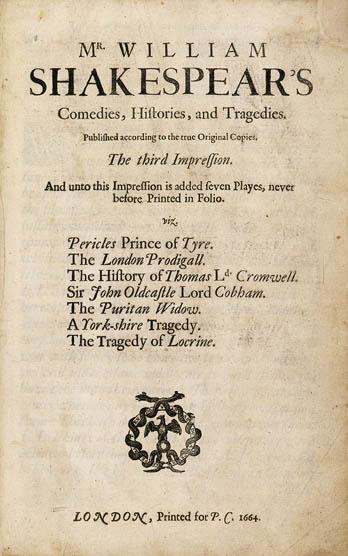
(source -- Folger Shakespeare Library web site)
My related essay Shakespearean Cryptograms is here
Go to homepage
Shakespeare's children are illiterate!
Introduction
Who
thinks this way, a bunch of nuts?
Why
is there any doubt?
Case
for Shakespeare
How
could the 'real' Shakespeare stay hidden for 400 years?
Case
for Oxford
Shakespeare's
family illiterate?
Shakespeare
family literacy reference
I
write about Shakespeare's illiterate daughters on Amazon
My
Amazon review of 'Contested Will' by James Shapiro (8/13)
Any
plays written after Oxford died?
Evidence
from letters of Oxford and Shakespeare
Edward
de Vere's life fits with sonnets
Flavor
of the debate
First Folio
Christopher Marlowe
Mary
Sidney Herbert, Countess of Pembroke
William
Stanley, Earl of Derby (de Vere's son-in-law)
An elegant solution
Curious
fact (or is it?) -- they all knew each other!
Dedication
--- Venus & Adonis (1593) and The Rape of Lucrece (1594)
Dedication ---
Sonnets (1609)
Dedication
--- First folio (1623)
Three
Shakespeare dedicatees => three potential husbands for De Vere's daughters
Edward
de Vere and Marlow portraits or lack of portraits
Herbert brothers
portrait(s)
De Vere family tree
Houses
and land in Shakespeare's will
Compare
Shakespeare's will to Ben Franklin's will
Compare
Shakespeare and Galileo -- both born 1564
Candidate dates
and links
Quick
royal/religious history around time of Shakespeare
'Anonymous'
--- 2011 anti-Shakespeare movie
PBS
Shakespeare --- Marlowe documentary
PBS's 'Much
Ado About Something'
Why no big
property in the will?
PBS's 'Shakespeare
Mystery'
Quarto
cover of Titus Andronicus 1594
Quartro source
Another
example of weird typography
Ties to Earl of
Pembrooke
My Shakespeare time
line
Comparison
of Shakespeare and Mark Twain time lines
Shocking
comparison
Compare
Shakespeare and Clifford Odets time lines
Compare
Shakespeare and Charles Dickens time lines
Mark Twain on Shakespeare authorship
'Is
Shakespeare Dead?' by Mark Twain
Twain on
video!
Small
town memory
Accuracy
of legal terminology
No biography
No notice
at death
Twain
recounts Shakespeare hard facts
No library?
Tracing
Shakespeare's family tree
Shakespeare's
daughter Susanna and granddaughter Elizabeth
Shakespeare's son-in-law book gives perspective on
Shakespeare's lack of fame and his family's literacy
Intro
to Dr. Hall's book --- Dr. James Cooke
An
aside --- 'No books or papers in Shakespeare's will'
Dr.
Hall's 1657 book
I
buy a facsimile copy
Medical
practice in 1600s
Shakespeare
is not mentioned in his son-in-law's book
Stratfordian
scholar excuses
Not
prescient about Shakespeare's greatness
Dating
of Dr. Hall's observations
Dr.
James Cooke's preface (1657)
Dr.
Cooke is looking for Dr. Hall's books
Daughter
Susanna's illiteracy
Shakespeare's
family illiteracy
Twain
has got his Shakespeare references wrong
Serious
doubt that Elizabeth Hall was illiterate
More
on Elizabethan literacy
Shakespeare's twins
Hamnet
or Hamlet?
Shakespeare's
brothers and sisters
Dating of poems
Weird
sweeping 's' in Shakepeare's printed name
Raw Twain notes
Appendix
New
Place is adjacent to Stratford's grammar school
Appendix
Proof
engravings and hi-res print of Droeshout's First Folio Shakespeare portrait
Speculations
on Droeshout's engraving in first folio
Cobbe
Portrait
Henry
Wriothesley's portrait
Newly
discovered Shakespeare portrait !
Appendix
Shakespeare
in the bible
Appendix
Justice
Stevens on Shakespeare
Appendix
'Downton
Abbey' or country house perspective
Appendix
Shakespeare's
(not so great) couplets
Shakespeare's
children are illiterate!
This one fact
alone
should make you doubt that Shakespeare wrote Shakespeare --- What
wealthy, famous writer doesn't teach his own kids to read? Apparently Shakespeare!
There is good evidence, accepted by mainstream Stratfordian scholars, that
most of Shakespeare's family including his two surviving children were
illiterate. Wikipedia confirms, saying "Judith Shakespeare (Shakespeare's
younger daughter) was probably illiterate". This is so embarrassing to
Stratfordian scholars that they briefly mention it, never try to explain
it, and quickly move on.
Shakespeare's' father and mother, wife, and his younger daughter (Judith) all signed with a mark. His older daughter (Susanna) could sign her name, but that is thought to be the extent of her literacy. The primary reference for this being that the doctor she sold her husband's book manuscript to wrote that she didn't recognize his handwriting, and also her one surviving signature is not fluid.Shakespeare's two surviving childred were both girls. Were they not taught to read because they were girls? You sometimes hear this as a sort of 'explanation'. But daughters of wealthy families were typically educated, and we know from all the property he owned that Shakespeare was not poor. In 1597, when his girls are 12 and 14 years old, he buys a huge new family home in the center of Stratford. Finding tutors for his daughters should have been easy, since his new house was literally across the street from the town school (still operating!). If he did any writing from his house, he must have had a big library there. He wrote favorably about educated women in his plays, and one of the most famous poets at that time, and a candidate to have written Shakespeare, was a woman, Mary (Sidney) Herbert, Countess of Pembroke.
There is an exant medical book written by Shakespeare's son-in-law, Dr. John Hall. He married Shakespeare's daughter Susanna in 1607 nine years before Shakespeare death. They all lived close in Stratford and Wikipedia says he was the only doctor in town, so presumably he would have attended to Shakespeare in his later years and at his death. Yet Hall's book (Select Observations on English Bodies of Eminent Persons ...), which discusses his family members sicknesses and treatments, makes no mention of his (supposedly) famous poet father-in-law, which explains why we know nothing about Shakespeare's death. This is consistent with a point Twain makes. Much evidence shows that Shakespeare, the former actor and theater manager, was not famous in Stratford, he was just an ordinary man, and after he had died, nobody took much notice, not even his son-in-law!Mark Twain on Shakespeare's granddaughter
Mark Twain in his Shakespeare book wrote that Shakespeare's only granddaughter, Elizabeth Hall, had been searched out many years after Shakespeare's death, and she was also found to be illiterate. But from my reading of a primary source (her father's book, see below), I believe that Twain got Elizabeth mixed up with her illiterate mother, Susanna Hall, Shakespeare's daughter. I have searched and searched but can find nothing on Elizabeth Hall's literacy, so I don't believe it is known whether she was literate or illiterate.
Introduction
I don't
think most people are even aware that there is a controversy about who
wrote Shakespeare's plays and poems, but there is. The academic community
of Shakespeare scholars for the most part appears to have little doubt
that Shakespeare, meaning the actor Shakespeare who came from Statford,
was the author. But for a long time, a passionate minority of Shakespeare
lovers and scholars have rejected Shakespeare as the author. Over the years
they have put forward different candidates as author, but in recent years
most have come to believe the author was an English nobleman in the court
of Elizabeth, the 17th Earl of Oxford, Edward de Vere, but Mary Sidney
Herbert has recently put forward in an impressive new book.. The controversy
today is generally called the fight between the Statfordians and the
Oxfordians and (maybe) Pembrokians.
-----------------------
Two Shakespeares --- Graham Phillips' theory (3/13)
A fellow named
Graham Phillips has an interesting theory that maybe there were two William
Shakespears: a rich grain merchant in Stratford on Avon, and totally unrelated
playwright living in Londow who writes the plays. Some of his evidence
is a little dodgy, but he is right that much of what makes no sense about
Shakepeare is the life of the Stratford man. And I think he is right there
are only two pieces of evidence from Stratford that tie the grain
merchant living there to the theater: the monument erected on the church
wall sometime after his death and one (interlinear) line in his will mentioning
two actors in Shakespeare's acting company. Phillips says the will did
not come to light until 1730s, and he speculates it could have been forged
or altered to support the beginning Statford tourist industry. Is this
right, was the will found more than 100 years after Shakespeare's death?
http://www.grahamphillips.net/shakespeare_secret/the_shakespeare_secret.htm
-----------------------
Key dates
of the theater director from Stratford-upon-Avon who may (or may not) have
written the plays attributed to William Shakespeare. The dates show Oxford
born 14 years ahead of Shakespeare, so in the dating of a Shakespeare work
it is important to remember Oxford is always 14 years older, and Oxford
dies 12 years before Shakespeare.
William Shakespeare
born 1564 died 1616 (age 52)
Edward deVere (17th earl of Oxford)
born 1550 died 1604 (age 54)
Who
thinks this way, a bunch of nuts?
PBS's
Frontline did a full one hour on the controversy. Frontline's show is a
great introduction to the topic. The show's powerful opening shows 7 items
on a table and says this is all that is known for sure
about
Shakespeare's life. Many huge 'biographies' of Shakespeare have been written
by Shakespeare scholars, but they are nothing but supposition. Nothing
(almost) on the table would indicate this was a man of letters, much less
the most famous English author. Frontline concludes the show saying over
4,000 books have been written claiming Shakespeare is not the author.
Mark Twain is a non-believer. He wrote a book about it, saying he wasn't sure if Bacon wrote the plays (Bacon was a leading candidate then, Oxford was not 'discovered' until 1920), but he was sure Shakespeare didn't write them. Novelist Henry James in 1903 wrote, "I am haunted by the conviction that the divine William is the biggest and most successful fraud ever practiced on a patient world." According to Wikipedia some notable Oxfordians are historian David McCullough, and Shakespeare theater people Orson Welles, Sir John Gielgud, and the Artistic Director of the Globe Theatre. (See below, a supreme court justice Stevens has recently come out as an Oxfordian.)
Why is there
any doubt?
A lot
of things about Shakespeare as the author just don't seem right. Other
writers and Shakespeare actors have long had doubts. Not a scrap of his
handwriting (except for the signatures on his will and other legal documents)
has ever been found. Many of the plays are set outside England [Italy (13
plays, about 1/3rd of all his plays!), France, Denmark] and contain lots
of local geographic detail and local knowdedge, but there is no evidence
that Shakespeare ever traveled abroad. While he worked as an actor and
theater manager in London, his family lived in the town where he grew up
and where he retired, Stratford about 100 miles west of London.
His will survives (one of the known seven documents) and it details the disposition of his property, but there is no mention of a library or books, in fact nothing in it to indicate he is a man of letters! There is one line in the will which ties him to the plays. Money for a ring is left to another actor who many years after Shakespeare's death is part of a team that first publishes most of his plays, but (incredibly) that line is an interlineation, meaning there is a carrot upward where it is squeezed in between two other lines!
An aside -- Newton's booksMany of the plays are about kings and the inside life of the court. Court insiders today say it rings true, but Shakespeare was a commoner with no access to the court. The plays reveal a very wide knowledge of many subjects (law, Bible, falconry, flowers, etc)., but there is no indication that Shakespeare had any learning outside of an elementary education. The 10 historical plays (of 37 total) show a detailed knowledge of English royal history. Most of the plays' plots come from earlier works that have been found and some were available at the time only in languages other than English, so a strong case can be made that Shakespeare must have been fluent in several languages. When he died, no one seems to have noticed. The dating of the plays by scholars presents problems with big gaps and bunching up. His timeline to develop into a playwright appears to be remarkable short: His 2nd and 3rd children (twins) are born in Stratford when he is 21, yet by the late 20's he has several plays in performance in London, there is even a version of Hamlet floating around in 1589 when he is only 25. The available evidence, admittedly thin, is that his daughters, wife and parents were very likely illiterate.
A new book about Newton says that when he moved in 1696 from university to London to manage the Royal Mint he shipped to his new home hundreds of books of his personal library. Now this is nearly a century after Shakespeare died so it's not clear how relevant this is, but still, here is a 17th century university scientist (not a rich man) who we know personally owned hundreds of books.This same Newton book says in the early 1600's Britain did not manufacture any white paper, it all had to be imported from Europe, so just writing paper was relatively expensive. By the end of the 1600's Britain had many paper manufacturing plants. What this probably means is that books in Shakespeare's time were much more expensive than in Newton's time. The corollary is that an intellectual in Shakespeare's time, who was not rich, probably did not own a lot of books, but it also means what books he did owned he would have valued highly. Hence the significance of Shakespeare in his will making no mention of books.
Case for Shakespeare
Here is a
link to a good summary of the case for Shakespeare. It is a long, letter
written by an English professor to Frontline to complain about the Shakespeare
show.
http://www.pbs.org/wgbh/pages/frontline/shakespeare/reactions/murphylett.html
The letter's author makes a simple, but powerful point, saying, ' How do you know who writes any book? His answer, you look at front page.' All Shakespeare works show William Shakespeare as the author. None of them say Oxford, in fact the author says no work of any kind has ever been found authored by Oxford. (I think he may be wrong on the last point, as a few youthful works of Oxford have been found)

(source -- Folger Shakespeare Library web site)
Above is a facsimile of the cover of the Third Folio of Shakespeare plays from 1664. It was published 32 years after the 2nd folio (1632) and 48 years after Shakespeare's (1616) death. Amazingly, as it says on the cover, this folio includes seven 'new' plays by Shakespeare. However, a glance at the list of Shakespeare's 37 (known) plays shows that only the first of the above seven is included (Pericles, Prince of Tyre). So apparently just looking at the cover for the author's name is not all that reliable, is it Stratfordians!
Plays written jointly with John FletcherStratfordians tend to argue that anti-Shakespeare guys are snobs who think only a rich, educated, nobleman could have written the plays. Whereas, Statfordians say, it is often the bright, uneducated, schoolboy who turns out to be a great writer, like, they sometimes add, Mark Twain.
And there is the case of play Henry VIII in the First Folio, included as one of the plays written by William Shakespeare, but this is not what modern scholars think. They think it was written jointly by Shakespeare and John Fletcher, yet the First Folio does not mention Fletcher. From Fletcher's distinctive style scholars have identified which scenes he wrote. Fletcher is also is thought to have collaborated with Shakespeare on the play 'Two Nobel Kinsman' (1613), which was not included in the First Folio, and the lost play, Cardinio (1613). (Of course all this collaboration was supposedly done in 1613 when Shakespeare was 'retired' and living in Stratford and Oxford was dead!)
The irony here is too delicious. Mark Twain's most famous book, of course, was not about politicians in Washington, but about the Mississippi river. He was following the author's dictum, write what you know. He had grown up on the Mississippi and was a riverboat pilot. The further irony is that he didn't believe Shakespeare wrote the plays. A still further irony is that there is no such person as Mark Twain, the Mark Twain books were written by Samuel Langhorne Clemens.
How
could the 'real' Shakespeare stay hidden for 400 years?
Obviously, the key, overwhelming problem the Oxfordian's have is, one,
What
possible reason would there be for a deception like this?, and two,
How could it possibly have remained a secret for 400 years?
It just
looks,
prima facie (on its face), absurd, the mother of all conspiracy
theories.
The general answer from the Oxfordians is that at the time public plays were not very respectable, these plays had lots of 'dirt' about the court, and operated under strict censorship, so it was impossible for a member of the court like Oxford to publicly be a playwright. There is some evidence that Oxford paid Shakespeare to use his name, and many Oxfordians think (assume) it was an open secret in London that Shakespeare was not the author. If a woman was the author of the plays, then it seems to me the motivation for concealment is very clear.
In my opinion the weakest part of the case for Oxford is this: By the time of the publication of the first folio of plays (1623) Oxford and Shakespeare were both dead, so if there had been a cover up, why did it not end then? Oxford had been dead nearly twenty years. Yet, the portfolio identified the author of the plays as William Shakespeare, well sort of, fascimile of title page says, Mr. William Shakespeares, Comedies, Histories, and Tragedies.
Oxford died twelve years before Shakespeare. So to argue that Shakespeare's will might have been altered to add the interlineated line about the ring seems to require a dedicated, and very hard to explain, continuation of the cover up years after Oxford's death.
The Oxfordians (? the Herbert's) do, however, have an argument as to why the cover-up needed to continue at the time of the first folio. It was to protect the next generation. In 1623 Oxford's son, Henry (18th Earl of Oxford), was an ambitious and powerful politician and military figure, and Mary Herbert's sons were also powerful with her son William then the Lord Chamberlain of England and responsible for censorship.
Case for Oxford
Oxford was
a key member of Elisabeth's court and 14 years older than Shakespeare.
He received a superb education because he was raised as the ward of Lord
Burghley, who was (effectively) the prime minister of England. There is
a contemporaneous reference that when he was young he was a gifted writer.
He lived and traveled for nearly a year in northern Italy (where Romeo
and Juliet, Merchant of Venice and many other Shakepeare plays are set)
and traveled widely in other countries where the non-English plays are
set. (One reference says, "In testimony before the Venetian Inquisition,
Edward de Vere was said to be fluent in Italian.")
Surely it is relevant to the authorship debate that about 1/3rd (13 of 37) of Shakepeare's plays are set in Italy! A check with Google Earth shows the journey from London to Italy around Spain and Portugal by sailing ship, which I would suspect to be the best way to travel a long distance in the 1500's, is 2,500 miles one way or 5,000 miles round trip! (Overland through France it's about 700 miles to get to northern Italy after crossing the English channel.)
Shakespeare's plays set in ItalyQuite a bit of Oxford's stuff survives. His early poetry is of high quality, and Oxford types are fond of intercutting his stuff with Shakespeare's poetry and challenging Shakespeare scholars to tell them apart. Oxford's bible survives and is in a distinguished library (Folger Shakespeare library, Washington DC). Amazingly, this bible (Geneva bible) has underlined a huge number of passages and a lot of these passages are the source of Biblical references in the plays. The bible and its underlines are an area of active research.
The 13 Shakespeare plays are at least partially set in Italy are: Julius Caesar, Romeo and Juliet, Taming of the Shrew, Merchant of Venice, Two Gentlemen of Verona, Much Ado About Nothing, Coriolanus, Titus Andronicus, Cymbeline, one scene of Antony and Cleopatra, part of Othello, part of All's Well that Ends Well, part of The Winter's Tale.
Oxford's age and known health is more consistent than Shakespeare's with (what many take to be) many autobiographical references to age and infirmity in the sonnets. Oxford's older age improves dating of the plays potentially eliminating the gaps and bunch ups. Oxford partisians point out lots of parallels between Oxford's life and the plays. Even a pro-Shakespeare partisian wrote, "The parallels between Oxford's life, as presented by (Richard F.) Whalen, and Shakespeare's plays are sometimes striking." Oxford was also connected with the theater, being the producer/financier of two troups of actors.
Shakespeare's
family illiterate?
There
is general agreement that Shakespeare never attended university, probably
because records show he was married at 18 in Stratford and in years following
his wife gave birth twice (one set of twins). There are other ways to get
educated besides university: home schooling by your father (think Mozart)
or mother, or for a motivated few access to good home library (some early
women authors) or in later years a public library (think Lincoln and Twain).
Shakespeare father was a wool merchant who owned three houses and was elected Bailiff (mayor) of Stratford, so he was not a bumpkin. But at that time in Stratford you need not be literate to be a town official, supposedly only 6 of 19 town officials in Stratford could write. A pro-Shakespeare web site says, "We assume neither John nor Mary (Shakespeare's parents) could write -- John used a pair of glovers' compasses as his signature while Mary used a running horse I have read that Shakespeare's wife signed with an X, which is usually taken as proof that someone is illiterate.
Robin Williams in her new book says virtually all of Shakespeare's family, father, mother, wife, and his 2 surviving children were illiterate. Her footnote for this is the standard reference, S. Schoenbaum's, William Shakespeare, A Compact Documentary Life, but she adds that the family illiteracy is in every Shakespeare biography. I looked at the Schoenbaum work online. It does say (p37, also p321) that John Shakespeare (William's father) used symbols to sign documents, then says, "it is therefore natural to infer that he (John) was illiterate". But Schoenbaum can't resist equivocating (probably because he knows how damaging this is to Shakespeare). "But is this necessarily the case?", he asks, saying "some (unnamed) authorities" point out that even literate people occasionally preferred to use a symbol to sign. This is apparently the best the pro-Shakespeare crowd can do to indicate that Shakespeare's father might possibly have been literate. Pretty pathetic. Another weird little 'hard fact' is Shakespeare spelled his name differently in all his six known signatures.
I think the issue of Shakespeare's family literacy is very important. If Shakespeare's family was not literate, and he had limited schooling, and he was married at 18 with three children in a few years, how could he possibly have obtained the wide ranging education he had to have had? If it is true that Shakespeare's wife and children (? maybe his ma and dad) were illiterate, then to my mind this one fact alone is virtually conclusive proof that he was not the author of the Shakespeare cannon.
Shakespeare
family literacy reference
Later, after
being challenged when posting a comment in the review section of Robin
William's book, I dug out the page number references on Shakespeare family
literacy from Samuel Schoenbaum's book, 'William Shakespeare, A Compact
Documentary Life' 1987. Schoenbaum is a mainstream Stratfordian scholar,
described in Wikipedia as the leading 20th century Shakespearean biographer
and scholar. (You can see these quotes by looking inside his book on Amazon.)
John Shakespeare (William's father) signed with a mark, so "it is therefore natural to infer that he was illiterate". (p37 see also p321)I write about Shakespeare's illiterate daughters on AmazonMary Arden Shakespeare (William's mother) --- "although (it seems) she could neither read nor write, signing documents with her mark." (p21)
Susanna and Judith (Shakespeare's two surviving children) --- "Susanna could sign her name, which is more than her sister demonstrates a capacity to do". (page 286)
Mark Twain reports in his book on Shakespeare that someone (Twain's book has almost no references) tracked down Shakespeare's granddaughter Elizabeth Hall in Stratford when she was quite old and found she was illiterate. Twain says, she also told her interviewer that her grandfather was not a poet. (This is my June 20, 2011 post on Amazon in a comment to a review of Robin William's book.)
(A youtube video says this reference for Twain is the diarys of Rev John Ward, who moved to Stratford in 1662)
What wealthy, famous writer doesn't teach his own kids to read? Apparently William Shakespeare! This fact is mentioned in all the standard Stratfordian biographies, but quickly passed over with little comment because it is so embarrassingly bizarre. Wikipedia article on Shakespeare's youngest daughter confirms: "Judith Shakespeare was probably illiterate."
Shakespeare's wife, Ann, raising the children alone in Stratford while her husband was acting in London is thought to have been illiterate too, but it should have been easy for the wealthy Shakespeare to hire tutors for his daughters. In fact his big house in Stratford, New Place, was literally across the street from the King Edward VI school. (Check it out on Google Earth, the school is still there).
After Shakespeare's death, New Place continued to be the Shakespeare family home for two more generations, increasing the chances any of his books, letters, poetry, etc would be preserved. In fact a manuscript written at New Place does survive. It was written not by Shakespeare, but by his son-in-law, Dr. Hall.
Dr. Hall was university trained and he and his wife, Shakespeare's daughter Susanna, moved into New Place to live with Shakespeare's wife, Ann, when Shakespeare died. Dr. Hall wrote up his medical studies, and the manuscript of his book survives in the British Museum. (You can buy a facsimile of Dr. Hall's book on Amazon, "Select Observations on English Bodies of Eminent Persons in Desperate Diseases", and there read my long review of it.)
In the book he speaks of treating members of his family and other writers, but even though he is presumed to have been Shakespeare's doctor, he was a member of the family and lived close by, he makes no mention of his (supposedly) famous poet father-in-law in his book. This is consistent with Mark Twain's view of Shakespeare, which is that Shakespeare, actor and theater manager, was an ordinary man, and after he died he was soon forgotten, apparently even by his family!My Amazon review of Contested Will by James Shapiro (update Aug 13)
Title: Puts the authorship question in context and some candid admissions from a Stratfordian, August 5, 2013Any plays written after Oxford died?James Shapiro has written an interesting and wide ranging book on the authorship problem. The bibliographical essay at the end of the book runs 40 pages. Rather than rehash the usual arguments, most of the book is devoted to tracing the roots of controversy. Shapiro links the 19th century beginnings of anti-shakespearean thinking to earlier German biblical criticism that suggested that Moses was not the author of any books of the old testament and a 1795 book by Wolf that "sent shock waves through the world of classical studies (p70)" arguing that Homer was not the author of Iliad and Odyssey.
This thread is picked up by Delia Bacon, and her arguments inspired a host of anti-shakespeare books which together convinced Twain, Keller, James and Freud (and later Looney) that Shakespeare was not written by the man from Stratford. All of these authors get their own treatment, and this forms the center of the book. At the end of the book Shapiro gives us a chapter on why he continues to believe the man from Stratford is indeed the (primary) author of the plays and poems while noting that modern scholarship is convincing that some of the early and late plays are collaborations.
Along the way we get refreshing admissions from Shapiro the professor that the Stratfordian crowd has, and have had, their flaws: from early deification of Shakespeare, to fabricating documents to 'fix up' the historical record, to strict internal censorship among Shakespearean scholars making study of the authorship issue verboten.
Twain
Shapiro discusses at some length how Twain's views were shaped, but he doesn't explore the interesting arguments Twain gives in his short anti-Shakespeare book, 'Is Shakespeare Dead?', about why he is sure the man from Stratford didn't write the plays. Twain brings a unique perspective to the authorship problem because his life as a writer in many ways paralleled Shakespeare. He too comes from deep in the countryside (Hannibal Missouri), is not university trained with only 9.5 years of "book-education" at local schools, yet he becomes one of America's leading writers, though his development timeline much longer than Shakespeare's. Twain is 73 when writing this book. He says he left Hannibal 55 years ago and never lived there again, but notes he is still well remembered there. He is the hometown boy who made good, he says 16 of his classmates are alive and can, and do, tell dozens of stories about him, and some old riverboat captains can tell about him too.Shakespeare grows up in Stratford, marries and starts a family there, his wife and children continue to live there, and he later returns to live there for several years as a rich man until his death. In total he spends half his life there, he is buried in the local church and a few years later a monument to him is put up on the wall of the local church. Twain, knowing how he is well remembered in his home town 55 years since he left, finds it incredible that when inquires about Shakespeare are made in Stratford about 50 years later no one there seems to remember him. Twain says there must have been a number of persons alive in Stratford at that time who in their youth would have had frequent contact with him. The Shakespeare family home (New Place) is a big house smack dab in the middle of town, and it continued to be occupied by Shakespeares, his daughter and later granddaughter, until 1670 54 years after Shakespeare's death. Plus Shakespeare's nieces and nephews, children of his sister Joan, and their descendants continued to live in Stratford for another 130 years up to about 1800.
Literacy or lack of it
Twain is also strongly impressed that the great writer Shakespeare does not see to it that his kids are educated, or at a minimum taught to read and write! If you look on Google Earth, you will see that New Place was literally across the street from the famous Shakespeare grammar school (still in operation), so getting student tutors should have been no problem and paying them should have been no problem either as Shakespeare was rich. Famous Stratfordian biographer Sam Schoenbaum concedes the available evidence is that neither of Shakespeare's surviving daughters could write! I think this is the STRONGEST single piece of evidence that the man from Stratford was not a poet and author of the plays.What great writer lets his own kids grow up uneducated and illiterate, oh that would be the man from Stratford! And it fits a pattern since available evidence indicates that Shakespeare's wife, mother and father were also illiterate. Curiously Shapiro never mentions anything about Shakespeare family illiteracy, except to point out that Shakespeare signed his will on each of its three pages using two different spellings, the strangeness of which he just waves off with a comment that spelling wasn't standardized. This is true, but I don't buy this as an explanation for a writer varying the spelling of his name when signing three pages of his will.
Footnote on Shakespeare's granddaughter, Elizabeth Hall, who was about eight years old when Shakespeare died. I can find nothing in electronic searching on whether she was literate or not. Twain has an aside that implied that she was not, but I believe Twain here was thinking of the Hall book preface (see below) and mixed her up with her mother, Susanna Hall, Shakespeare's oldest daughter.
Shakespeare's oldest daughter
One of the strongest pieces of evidence that Susanna Hall was not literate comes from a preface to a book written by her husband, Dr. John Hall, Shakespeare's son-in-law. [A facsimile of Dr. Hall's book is available inexpensively on Amazon. I bought it, read it and reviewed it. Search for Dr. John Hall, Shakespeare's son-in-law by Harriet Joseph (1964).] The preface contains a first person account by the book's editor about how he personally acquired the manuscript from Shakespeare's daughter, the gist of which is she did not appear to recognize that the manuscript had been written by her husband. The editor tells us that Dr. Hall had prepared the manuscript for the "presse" (to be published), so it's a good guess that he had put his name on the title page.There are two other interesting things about this book that bear on the authorship question. First is something I've never seen commented on, why Susanna, and/or her doctor husband, can't seem to get this book published. It's just sitting there after his death. Don't either of them remember contacts that dad (Shakespeare) might have had with publishers or printers? It ends up being published only because another doctor comes to Susanna's door looking for medical books the recently deceased Dr. Hall might have left behind. This doctor, presumably an educated man, makes no mention of looking to buy anything Susanna might have had that was left by her father. And curiously while all of Shakespeare's correspondence and writings in his retirement got 'lost', or so the Stratfordians tell us, his son-in-law's manuscript, probably written in the Shakespeare family home within 20 years of Shakespeare's death, lives on in the British museum.
The second (and well known fact) is that there is not a single mention in Dr. Hall's book about his father-in-law even though he was likely Shakespeare's doctor for several years and at his death. In the book he talks about treating his wife, his daughter, and many dozens of residents within riding distance of Stratford, including a poet we recognize. Even if he couldn't medically help Shakespeare, you would think with the fame of the First Folio, Venus and Adonis, all those editions of the plays floating around, and a big monument in the local church that he would tell us a little about his treatment of his father-in-law, maybe what he died from, maybe just a footnote? Nope, nothing, not a single mention. As Twain and many others have noted, this is most consistent with the man from Stratford having been an ordinary man, and that when he died, he was soon forgotten, even (apparently) by his own family!
Graves
Shapiro and the Stratfordians are always telling us stuff got lost, but the Shakespeare family graves are lined up in Trinity church, and they are not bare. William's gravestone is engraved with a little four line poem about not moving his bones. Twain thinks it ridiculous that a piece of doggerel like this would be found on the grave of a great poet. Shakespeare's wife Ann was alive while the nearly 1,000 page First Folio was in preparation, she was buried in 1623 just months before it was published. There are nine lines on her gravestone six of which are a little poem. Surely a few select lines of her husband's poetry were chosen as a memorial. Nope, it's effectively doggerel too, three religious couplets in Latin. Whoops another embarrassment for the Statfordians.Buc's relevance
Lastly I want to comment on first piece of evidence Shapiro gives in support for the man of Stratford: a margin note by George Buc. Shapiro says the note arose from a flesh and blood encounter Buc had with a "man he knew as both actor and playwright" (p224). I don't see how this follows at all. Shapiro has Buc asking Shakespeare, who by general agreement was a long time theater manager in London, about some play from a few years ago and Shakespeare has a partial memory of it. Ok, a theater manager knows something about an old play. How does this in any way support Shapiro's assertion that Buc knew Shakespeare was also a "playwright"?
Also curious and maybe relevant is that important discoveries in astronomy in the later years of Shakespeare's life do not show up in the plays. In particular three findings in astronomy in the early 1600's had a huge impact on how educated men viewed the universe:
1) A supernova in 1604, Kepler's Star, was for a time the brightest star in the sky. This showed that stars are not fixed as the ancients had claimed.
2) In 1609 Kepler figured out that planets move in elliptical orbits around the sun. This greatly strengthening the case that the earth was not the stationary center of the universe as the church and bible claimed.
3) In 1610 Galileo first looked at the heavens with his new telescope and made amazing discoveries that he immediately published in a little book ('Starry Messenger') that was a sensation. Within a few weeks he found the moon looked terrestrial and that Jupiter had four satellites, both greatly strengthening the case that the earth moved. After a year or two of observation of Venus he essentially confirmed the earth went around the sun, because he found that Venus had cresent phases like the moon.
These were dramatic events in the first decade of the 1600's that shaped how educated men viewed the earth. Yet all this is missing from the plays. Why? (Conventional Stratfordian scholars think almost 1/3rd of Shakespeare's plays were written in the years between Oxford's death in 1604 and Shakespeare's death in 1616.)
Evidence
from letters of Oxford and Shakespeare
Seventy-five
letters hand written by Oxford have survived. The Shakespeare people have
carefully analyzed the english and spelling of the 44,000 words in these
letters. They find the spelling of many words to be very variable. I am
not sure how strong a point this is because it took a long time for the
English language to become standardized, but the pro-Shakespeare people
argue that even if not standardized a prolific writer would likely have
his own fixed spelling for common words.
The Shakespeare people do make the following pretty strong point: It must be the case that the author of the Shakespeare canon was a master of the English language, and they argue by the evidence of his own hand, Oxford was not.
What about Shakespeare's letters, what do they tell us? Well, there are no Shakespeare letters, zero, nada, at least none that survive. The greatest man of English letter and not one letter! The only thing pro-Shakespeare people have to say about letters is that they know someone once 'sent' (it seems he forgot to mail it) Shakespeare one letter. They conclude this is positive because it shows Shakespeare was (probably) literate. How pathetic is this?
Bottom line --- Oxford's letters don't seem to indicate he was a great writer, but Shakespeare's position is little better in that no Shakespeare letters exist, not even the other side of an exchange of letters.
My opinion is that any (calculated) ambiguity about the idenity of Shakepeare at the publication of his plays in the first folio, strengthens the anti-Shakespeare case.
Edward
de Vere's life fits with sonnets
The
sonnets are thought to been written not for publication and seem
highly personal and autobiographical. Stratfordians tend to treat the sonnets
as inadmissable evidence in the argument over the identity of "Shakespeare".
But these poems allude to the author's high birth, age, lameness (as self-described
in Oxford's letters), disgrace (he served time in the Tower of London),
his being a target of "vulgar scandal" (the accusation of Oxford's "buggering
boys"), legal material (Oxford studied at Inns of Court; his surviving
letters use over 50 of the 200 legal terms appearing in the sonnets), the
expectation of the burial of his name (this would not be the impending
case if Stratford Will's own name were on them).
Flavor of the debate
--- (pro-Shakepeare)
"At the same time as de Vere's authorship was carefully hidden from the
public at large, though it must have been widely known in court circles,
according to Whalen, the false image of "Shakespeare" was set up by some
sort of vague, unexplained, conspiracy. Ben Jonson seems to have been the
chief culprit in this obfuscation, without ever lying directly: he was
always careful to maintain a certain ambiguity. When he speaks of Shakespeare
as "Sweet swan of Avon" this must refer not to the river near Stratford
but to an estate on the river Avon that Oxford had inherited and owned
for some time."
Letters, lack of
The total
lack of any letters written by Shakespeare (or received by Shakespeare)
is nearly as damning as his kids not being able to read. Shakespeare can
be twinned with Galileo because they were both born at the same time (just
months apart). In a long article about Galileo in the New Yorker there
is a discussion of his three way letter correspondence of Galileo on the
new developments in astronomy:
"Mail was already the miracle of the age. In correspondence, the new science passed back and forth through Europe, almost as fluidly as it does in the email era. It is astonishing to follow the three way correspondence among Tycho Brahe, Kepler and Galileo and see how little time was lost in disseminating gossip and discovery."England had had a postmaster before Shakespeare was born. Educated men, intellectuals, scientists and certainly writers all wrote letters. I used to sweep the stacks of the MIT library and the collected correspondence of Darwin ran for feet of shelf space (hundreds, maybe thousands, of letters collected and archived).
Sent letters are robust historically
Obviously
letters received by a single person are subject to historical loss. There
have been cases where famous people burned their private papers and letters
(though there is no hint Shakespeare ever did this), but letters written
by a famous person and sent to others are a very different matter.
These letters are going to be widely dispersed. Sent letters should be
historically robust, some recipients of such letters should have preserved
them.
How then is it possible that no one receiving a letter from a famous London playwright and poet didn't keep it? Aside from general communications with friends and other public intellectuals of the age, isn't it extremely likely that when working on a new play Shakespeare would need clarification on a point of history, geography, the law, falconry, flowers, the court, etc, etc, and to get this clarification he would need to occasionally write letters to those who could help. How is it possible that not a single person ever kept even one of these letters?
William Styron letters (March 2013)I can think of two counter arguments. One, if it took say 100 years before people recognized that Shakespeare was 'special' (really, I read his plays and his sucessor Fletcher's plays continue to be regularly performed for a century), then maybe a lot of the letters had been lost by this time. (Of course a recent article in Forbes that says, of course Shakespeare wrote Shakespeare, informs us that Shakespeare was the 'rock star' of his time! So there...) Two, the argument can be turned around. Are there letters by Oxford or other writers of the time? (Yes indeed, I find that there are 73 known letters written by Oxford, a few of which were discovered only recently.)
In an amazing coincidence while I am writing this section and thinking about what no letters means I stumble across the Emily Rooney show (PBS, Ch2, Boston), and she is interviewing the widow of the writer Willion Styron about letters he wrote. Unbeknownst to her he had over a long lifetime writen about writing to many different people, often to other writers, students of writing, fans etc. She finds cleaning out his office a huge cashe of letters he had received from these people and kept. She, of course, wants the letters he wrote to them, not only because these are what people would be interested in, but also because there are copywright issues.So she writes to these people, and a little ad is placed in a magazine asking if anyone has letters from him. She collects up enough letters to fill a book (which of course is the reason she is on TV). This is proof (in a minor way) of the robustness of distributed letters. Letters from a man of letters will get saved and can later be retrieved. Now an effort was needed to retrieve them, but over the years a huge effort has been made by many people to retrieve anything Shakespearean. If an authentic Shakespeare letter was ever to be come to light, image what it would sell for!
Really!
Each line
below is to be read with a 'Really! appended. ('Never' and other absolutes
are to be understood that there is 'no evidence for', even though many
people have combed English records for centuries looking for Shakespeare
related records and material)
Shakespeare never teaches his kids to read. Really!
Shakespeare never teaches his wife to read.
Shakespeare never teaches his parents to read.
Shakespeare never writes a letter.
Shakespeare never receives a letter.
Shakespeare never communicates with other intellectuals in England or Europe
No one famous ever visits Shakespeare.
Shakespeare never attends a dinner or famous event thrown by an artist, rich merchant, clergy, noble or member of the court
Shakespeare owns no books in London or Stratford.
None of Shakespeare's personal papers have survived even though his direct decedents lived in his family home, where he died, for two more generations.
Shakespeare son-in-law writes a book and mentions everyone in his family in it except his father-in-law.
Shakespeare son-in-law mentions books in his will, but not the First Folio or other of Shakespeare's writings.
Official documents and what little is known of his life indicate that Shakespeare was most likely earned his wealth as a successful theatrical businessman.
The only item in legal documents tieing Shakespeare to the theater or the plays is a single line in his will that (incredibly) is an interlineation.
Shakespeare is buried in the local (Stratford) town church, not St. Pauls or other London cathedral where the leading intellectuals of England have long been buried.
The short poem engraved on the Stratford tomb of our world famous poet (' ... Bleste be the man that spares thes stones, And curst be he that moves my bones') is considered by many to be little more than a piece of doggerel.
A few decades after his death no one in Stratford seems to have remembered him.
No one seems to have taken any notice when he died.
The first folio, a huge expensive book with nearly all of Shakespeare plays, contains not a scrap of biographical information about Shakespeare aside from his name (and a cryptic comment that maybe he came from, or was associated with, a town on the long Avon river).
Scholars think Shakespeare collaborated with several other writers (including John Fletcher) in writing some of the plays, yet none of them wrote a commentary (or are even credited) in the first folio, the massive collection of his plays published in one volume after his death.
Even though a lot of Shakespeare's plays are set in Italy, he never writes about the continuing persecution of Italian intellectuals by the catholic church, like Giordano Bruno who was burned alive at the stake in 1600.
Shakespeare never writes about the dramatic finding made with the telescope by Galileo in 1610 that he immediately published in a widely read book indicating that the teachings of the church about the world and man's place in it were very likely wrong.
Even though nearly 1/3rd of his plays are set outside England there is no evidence Shakespeare ever left England.
Legal experts have detailed Shakespeare proper use of dozens of complex, subtle legal terms, yet Shakespeare was not a lawyer.
Shakespeare without university training and three children born in Stratford between age 18 and 21 develops into a world class writer and playwright in an amazingly short period of time (by his later 20's) far faster that Mark Twain to whom he is often compared.
No juvenilia or introductary writings of Shakespeare are known. His earliest known works (age 26 to 29) are several plays in performance on the London stage (Henry VI trilogy) and the very sucessful poem, Venus and Adonis (16 editions in 47 years, one of the great popular successes of its era). Scholars don't even agree on which play he wrote first: Henry VI part 1 or part 2.
Without university training Shakespeare was able to get the plots for some of his plays from books by other writers not available at the time in English translation.
Neither Shakespeare nor his acting company published any of his plays while he was alive.
Neither Shakespeare nor his acting company appear to have taken any legal effort to stop pirated versions of his plays and poems (sonnets) from being published, even though England at the time was very litigious and court records survive.
While the writing
of the sonnets appears to be autobiographical, it doesn't fit at all with
Shakespeare's life.
----------------------------------
First Folio
While some
of Shakespeare plays had been printed during his lifetime, many (about
half) had not. In 1623 seven years after Shakespeare's death and the death
of all the leading Shakespeare candidates too, 35 of the 37 known Shakespeare
plays (Comedies --- 14, Histories --- 10, Tragedies ---11)
were published in one huge, 928 page, 3.1 inch expensive book printed with
small type. This book is known as the First Folio (see below).
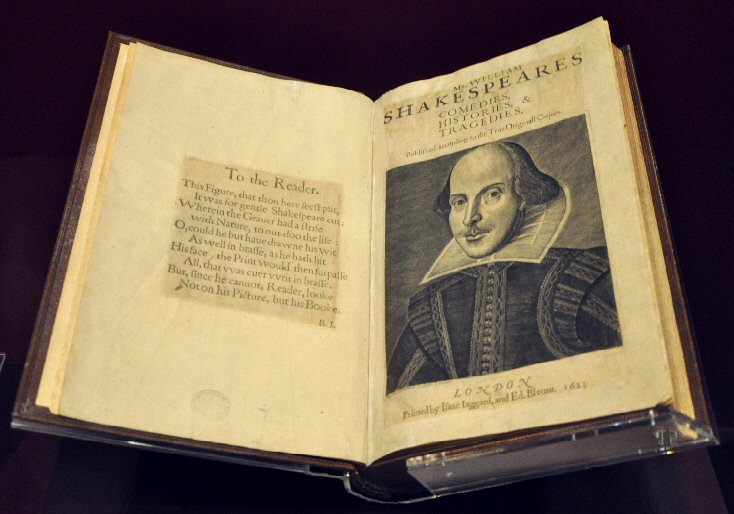
First Folio (bound)
This book has an introductory section including a dedication and poems praising Shakespeare even an engraving of him on the cover. Yet curiously, it contains no biographical sketch of the author, in fact, no biographical information at all, except for a vague reference to the Sweet Swan of Avon in Ben Johnson's poem. From a modern perspective this is very strange.
The fact that
a book containing nearly all of Shakespeare's work, a lifetime of work,
is published just a few years after his death without any biographical
information about the author substantially strengthens the anti-shakespeare
case.
The dedication
of the First Folio is unambiguously to the two sons of Mary Herbert, Countess
of Pembroke, one of whom was Oxford's son-in-law. Suggestive, no? The dedication
text is here (from electronic first folio online):
TO THE MOST
NOBLE AND INCOMPARABLE PAIRE OF BRETHREN,
WILLIAM, Earle
of Pembroke, ?c. Lord Chamberlaine to the Kings most Excellent Maiesty,
and
PHILIP, Earle
of Montgomery, ?c. Gentleman of his Maiesties Bed-Chamber.
Both Knights
of the most Noble Order of the Garter, and our singular good LORDS.
And would it not be likely, given the dedication, and the possibility that either Mary Herbert or Oxford wrote the plays, that one or both of the families paid to publish this obviously expensive book? The first folio text (with original spellings) is available online here. You can buy a facsimile copy of the 1623 First Folio from Amazon for $94.
http://etext.virginia.edu/shakespeare/folio/
'Sweet swan of Avon'
Ben Jonson's
in his poem in the first folio refers to the author of the plays as the
'Sweet swan of Avon'. Most people just think this obviously refers to Stratford
on Avon, but does it? A look at the geography shows how vague this reference
is.
River Avon
I traced the river
Avon for part of its course using Google Earth, and it really twists and
turns flowing mile after mile though much of west central England. Wikipedia
('Avon') says the length of the river is 85 miles, but with all its zigzags
that if traveled it might be much longer . It starts north and west of
London pretty much in the center of southern England up near Rugby
and flows through much of (south) central England about 100 miles west
of London SW to its outlet at long arm of the Bristol Channel on the western
coast of England. With its long and winding course this river flows
by dozens of town to the west of London: Stratford-on-Avon, Welford-on-Avon,
Bidford-on-Avon, Newbold on Avon, etc. Stratford is near the center of
southern England about half way on the Avon's journey and about 85 miles
NW of London.
Bilton Hall
The Oxfordians like
to claim that 'Sweet swan of Avon' could refer to Oxford. The justification
given is that Oxford owned Bilton Hall (still extant, now apartments) in
Rugby, which some references say is 'on' the River Avon and other's say
'overlooks the Avon river valley'. I set out to examine this claim using
Wikipedia and Google Earth.
Rugby is about 20 miles NE of Stratford. A northern suburb of Rugby (1.5 miles NW) is 'Newbold on Avon'. It is clearly on a waterway, so I assumed this was the Avon, but Google Earth identifies the waterway as the Oxford canal. Canals were built all over England in the early years of the industrial revolution, so heaven knows how much of the Avon's course has been modified by canals, but I think it's a good bet that a town called 'Newbold on Avon' was in fact originally on the Avon river!
I found Bilton Hall on Google Earth too. It is in the old district of Bilton a southern suburb of Rugby (about 1.5 SW). I measure the distance from Bilton Hall to 'Newbold on Avon', its closest point to the waterway, at 2 miles. For comparison the center of old 'Stratford on Avon' where Shakespeare was born and where his house was is about 1/4 mile from the river. So it's somewhat of a stretch to say Oxford's home Bilton Hall was on the Avon, but not too big a stretch.
Bilton Hall was owned by the Oxford family home for 70 years, beginning with Oxford's grandfather, but did Oxford ever live there? Very unlikely (see below). Oxford is believed to have have rented out Bilton Hall in 1574 (age 23) and sold it in 1580 (at age 30).
Castle Hedingham
Oxford was not born
at Bilton Hall he was born in Castle Hedingham, which is described in Wikipedia
as "The ancestral seat of the de Veres, Earls of Oxfords". Castle Hedingham
is in eastern England, NE of London and far from the river Avon. Oxford's
grandfather (15th earl) was buried at Castle Hedingham as was Oxford's
father who died in 1562 when Oxford was 12. So it's a good guess that up
to the age of 12 Oxford lived at Castle Hedingham. Oxford's father had
a company of actors (Oxford's men) for 15 years up to his death. So Oxford
even as a child must have grown up acting and plays. Upon his father's
death became became Burghley's ward, so presumably he moved away from the
family home at that age.
Oxford's grandfather was a well know protestant and was Lord Chamberlain of England (1534), and Oxford is raised protestant. Curiously, however, Oxford is said at age 20 to have been involved in the Northern Rebellion of catholic nobles to get a catholic queen.
Christopher Marlowe
Christopher
Marlowe is a very interesting candidate, probably by far the most likely,
except for the fact that at age 29 he got stabbed to death (or did he?)
in 1593 in a bar fight. Curiously this was just one day before before he
was to appear for trial for a capital offense, and it was just a few months
before the first works of Shakespeare appeared in print. Marlowe was an
established playwright, not a dilettante writing nobleman.
In the early 1800's, before Christopher Marlowe was known to the true author of his works, some scholars argued that Shakespeare had written his early works under an assumed name: Christopher Marlowe. In fact over the years a huge number of Shakespeare scholars came to the conclusion that Marlowe probably wrote all or parts of a few of Shakespeare plays. Marlowe wrote history plays and tragedies, and wrote in iambic pentameter too. In fact it can be argued that in the few years prior to 1593 Marlowe had invented (much of) the Shakespearean language and form (iambic pentameter, true tragedy and diplomatic docudrama).
Marlowe's writing (as a young man in his 20's), while not as good as Shakespeare's, is very similar. Word length comparisons were done around 1900 by a physicist who was President of the American Association for the Advancement for Science to see if Bacon and Shakespeare matched up. They did not. When he next compared Shakespeare with Marlowe the match was amazing. He reported it caused "something akin to a sensation" among the research assistants. Here is the Marlowe/Shakespeare word length comparison (everything both wrote was counted):
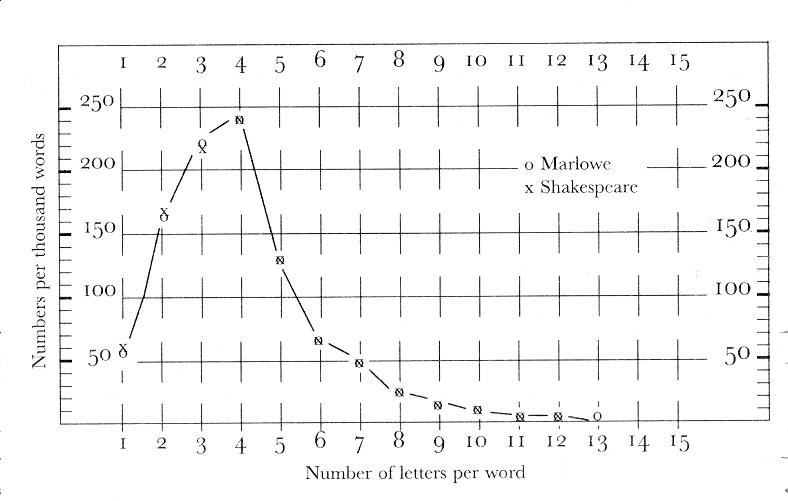
Marlowe is connected to the literary world and the Sidneys (Mary and older brother Philip) through Wilton House. Apparently from age 8 to 15 he worked as a page (whatever that is) for Philip Sidney. The Marlowe crowd suggests Mary was the role model for the early Shakespeare poem Venus and Adonis. In fact, the Marlowe crowd goes further and suggests that at age 15 Marlowe impregnated Mary Sidney who at 18 was at the time married to a much older man. If so, that makes (drum roll) Marlowe the natural father of William Herbert, one of Mary's two sons to whom the first folio was dedicated!Comparisons
I found later found the above plot, along with a comparison curve for Dickens, in a book I bought on Marlow. The comparison curves were revealing, there may be less here than meets the eye. The only real difference between Dickens and Marlow/Shakespeare is at the 3-4 peak, the two tails are nearly the same (in shape and quantitatively). The only difference is Dickens peaks at 3 and rolls off on 4, whereas Shakespeare/Maarlow peak at four, a little higher than 3.This tells me little, not enough comparison curves. The change in the character of English in the 200+ years between Dickens and Shakespeare may very well be the main cause of the difference. Another cause could be Dickens only wrote prose, whereas Shakespeare's stuff is a mixture of prose and poety. Also found the published curves were generated in pre-computer days (around 1900 as I remember) by paid counters who counted millions of words by hand, so the accuracy is questionable. Surely someone has redone this work with a computer!
The motivation for a cover up with Marlowe is clear. If Marlowe faked his death in 1593, he had to stay dead. He was to be to put on trial for being an atheist and blasphemer. Fellow playwright Kyd had been put in jail and tortured on the same charge, so the risks to Marlowe's his live and limb were real. I won't go into the details about the stabbing death of Marlowe, but much of the story doesn't add up.
In summary, Marlowe was a professional playwright (also a linguist and translator), the same age as Shakespeare, who wrote just like him. Many experts think it likely that Marlowe wrote some or all of a few Shakespeare plays. Technical word length comparisons show an almost identical match between Shakespeare's and Marlowe's writings. Marlowe came from humble beginnings (like Shakespeare), born as a cobbler's son, but he got educated with a scholarship to school and graduated from Cambridge. He was connected to the literary world and (maybe) the first folio through Wilton house and Philip and Mary Sidney. To escape jail and torture there is the possibility he faked his death at age 29, went into exile, and wrote from exile as William Shakespeare.
(more on Marlowe below)
Mary
Sidney Herbert, Countess of Pembroke
A new book (2006) by Robin P. Williams, Sweet Swan of Avon: Did a Woman
Write Shakespeare? puts forward a new candidate, Mary Sidney Herbert.
I had never heard of Herbert, but apparently she is not unknown in the
Elizabethan literary world. Her poetry and translations have been published
in a two volume scholarly collection, noting she was 'the most important
woman writer of the Elizabethan era outside the royal family.' More than
one biography of her has been written. In John Mitchell's 1996 book, Who
Wrote Shakespeare, which reviews all the major candidates for Shakespeare,
she is mentioned, but gets only a half a page.
She is clearly in the Shakespeare world. The first Shakespeare folio of 1623 was dedicated to her two sons, William and Philip. She owned an expansive estate on the river Avon (as did Oxford) that was a literary hub, and she was buried on the river Avon. She and her husband sponsored an acting troupe that is known to have performed four Shakespeare plays. Many in her family were writers. Her younger brother Philip Sidney was a famous writer. Mary's published Psalms had a lasting influence. If she did write the plays, it's not hard to explain why her identity would have been concealed. In 1604 her son Philip married Edward de Vere's daughter Susan, so she and Oxford were in-laws! Her dates match up well with Shakespeare's.
In the beginning of the book Williams does a good job summarizing all the weird and weak aspects of the standard case for the actor Shakespeare as author of the plays and poems. In a chapter on the sonnets Williams puts forward an excellent case that the sonnets makes much more biographically sense if they were written by a woman rather than a man. She then shows how the sonnets fit very well with Mary Herbert's life. For example, the 'procreation sonnets', sonnets 1-17, could very well have been written by Mary to her younger, unmarried brother, Philip Sidney, who died at age 30, and who, significantly, had first popularized the writing of sonnets in English. Williams shows how a lot of themes and characters in the plays mesh very well with the sensibility of a woman.
Mary Sidney Herbert had the means, motivation, and opportunity to write the plays and sonnets and had a pretty obvious reason to conceal her identity.
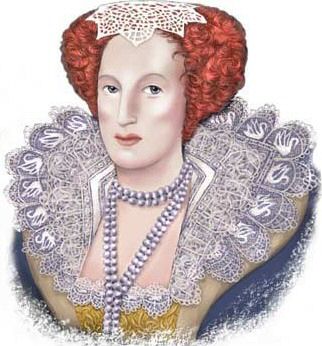
William
Stanley, Earl of Derby (de Vere's son-in-law)
Stanley was
a nobleman who ruled the Isle of Man. His dates (1561 - 1642) line up well,
maybe too well, because he lived to be an old man (age 81) and apparently
wrote nothing in his last 30 years. He went to Oxford then spent five years
traveling in Europe in his early 20's. He had a theater company. At age
34 (1595) he married Oxford's daughter.
A strong case for Stanley is made by a French scholar based on an early Shakespeare play Love's Labour's Lost (published in 1598) set in France. This French scholar says the play reflects intimate knowledge of the French language and some specific events and people inside the French court. He determined that Stanley was in France and at court during these times. (Bacon's brother also stayed at the French court and could have written him letters about it.) A character in the play and a scene in the play appear to be based closely on Stanley's tutor, who traveled with him in Europe.
His family home was burned down which might explain the lack of manuscripts. He was still alive when the first folio was published, so that could explain why the coverup continued. This is also a negative though because scholars have determined that many (not all) of the plays were printed in the first folio with lots of printer and copy errors. It's argued that no living author would want (much of) his life's work published so sloppily.
An elegant solution
An elegant
solution to the authorship mystery is that a bunch of the candidate Shakespeares
wrote the stuff attributed to Shakespeare. There was a Shakespeare
writing group. Literary nobles, who all knew each other and were often
related by marriage (see next section), who were writing plays, sonnets,
and poems all used the same cover. A lot of scholars have come eventually
to this conclusion. It explains a lot of things.
I bet you never heard of Shakespeare's two long poems Venus and Adonis and Rape of Lucrece. These poems are Shakespeare crap. Explanation is easy, they were written by a lesser talent in the group. In fact the quality level is all over the map. I think that conventional Shakespeare scholars generally accept that some of the plays (especially the lesser plays) have multiple authors.
Love's Labour's Lost seems to be tied closely to Stanley. Well maybe with help from his father-in-law (or the other way around) he wrote that one. Other plays are tied closely with other candidates. Same explanation. Some of the sonnets seem to reflect the sensibility of a woman. Well maybe they were written by Mary Herbert The mythical Shakespeare seems to have had detailed knowledge on too many subjects. Easily explained if several (well educated) people wrote his stuff. No one candidate quite fits the bill? Easy, Shakespeare is actually a composite person.
Altogether, an elegant explanation!
Curious
fact (or is it?) -- they all knew each other!
The
Shakespeare crowd divides neatly into two groups: actors and rich nobles.
Everyone knows all the members of his group, but the connections between
groups are small. Many of the literary nobles were fond of the theater
(as was the queen), so actors do occasionally get invited to their large
estates to perform plays. Marlowe while growing up worked for the Sidneys
(as a page) at Wilton house. Ben Johnson, who was a friend and employee
of the nobles, had his plays performed at the public theaters, so in this
way he may have had some contact with the actors. Ben Johnson worked on
the first folio and wrote a tribute to Shakespeare in it, but which Shakespeare?
His tribute, Sweet Swan of Avon ..., is of course, a staple of the
Stratfordian case.
The actors work together in the same company. The actors are the man from Stratford (traditional Shakespeare), Condell, Heminge, Burbage. The rich nobles are all related to each other by family, marriage, or having been wards of Burghley. They include Shakespeare candidates 17th Earl of Oxford (Edward de Vere), Bacon, William Stanley (Earl of Derby), Mary Sidney Herbert (Countess of Pembroke), and those to whom poems were dedicated, Henry Wriothesley (Earl of Southhampton), Earl of Rutland, plus next generation, William Herbert (Earl of Pembroke), Phillip Herbert (Earl of Montgomery), Henry de Vere, (William Herbert).
Dedication
--- Venus & Adonis (1593) and The Rape of Lucrece (1594)
-- Early Shakespeare poems were dedicated (by Shakespeare) to 3rd Earl
of Southhampton, Henry Wriothesley. Because of the dedication, Southhampton
was (presumed) to be a patron of Shakespeare. Southhampton had been a ward
of Lord Burghley, as had Oxford. When Southampton was twenty, Burghley
had suggested a marriage between him and his granddaughter Elizabeth Vere,
daughter of the Edward de Vere, 17th Earl of Oxford.
-- Oxford's son Henry was a close friend of Southhampton. There is a 1624 painting ('Noble Henries') of them together on horseback in command of troops in Holland.
Dedication
--- Sonnets (1609)
-- Sonnets were dedicated (by publisher) to unknown Mr. W.H. Favorite
candidates for W.H. are Henry Wriothesley, Earl of Southhampton (Burghley
ward) to whom early Shakespeare poems were dedicated and William Herbert
(Mary's son), 3rd Earl of Pembroke, (initials match) who was one of the
brothers to whom the first folio was dedicated. Sonnets (all) were published
in 1609 (two published in 1599), when Henry Wriothesley was 36 and William
Herbert was 29, however no one knows when they were written. Wikipedia
lists about a dozen other candidates for W.H, one of whom is Shakespeare's
nephew, William Hart, son of Shakespeare's sister Joan, who was 9 years
old in 1609.
Much of the mystery here is because the Elizabethans and/or Shakespeareans were so weird repeatedly using initials instead of name. It shows up in dedications (W. H.), and in signatures by the authors of memorial poems (B. I. for Ben Jonson). However, Shakespeare himself signed the introduction to his early poems with his full name! I have never see any comment, or explanation, as to why the Elizabethans were so weird about this. Or is it like their typography, which for no known reason, is just weird!
Dedication
--- First folio (1623)
-- The first folio was dedicated (by editors of first folio) to William
Herbert and Philip Herbert (“incomparable pair of brethren”) the sons of
Mary Herbert. William (later, Earl of Pembroke), was engaged to de Vere's
daughter Bridget in 1597 (but marriage was called off due to excessive
dowry demands of Burghley). Philip (later, Earl of Montgomery), married
a different de Vere daughter, Susan, seven years later (in 1604, year of
Oxford's death). After Shakespeare's death, both of the Herbert brothers
go on to become the Chancellor of Oxford University.
-- Three Shakespeare dedicatees => three potential husbands for De Vere's daughters
Edward de Vere had three daughters. It is an incredible fact that each of his three daughters was at one point a potential husband to a different one of the three people clearly identified (omitting W. H. of the sonnets) as dedicatees of Shakespeare's works, the earls of Southampton, Pembroke and Montgomery! In other words all of de Vere's three daughers were either married to, engaged to, or linked with a different one of the three dedicatees of Shakespeare's plays and poems. This certainly ties de Vere closely to the publication of Shakepeare's works.
-- Hence, Mary Sidney Herbert and Oxford were in-laws and tied to the first folio by its dedication to Mary's sons, one of whom was Oxford's son-in-law. Some have suggested the dedication letter might easily be explained if one or both of these families paid for the publication of the first folio.* Henry Wriothesley (Earl of Southhampton), dedicatee of poems Venus and Adonis and The Rape of Lucrece, was suggested by Lord Burghley (he was a ward of Burghley) as a potential husband for de Vere's daughter Elizabeth.* William Herbert (Eerl of Pembroke) was one of two dedicatees of first folio and was engaged at one point to de Vere's daughter Bridget.* Philip Herbert (Earl of Montgomery) was one of two dedicatees of first folio and one of de Vere's sons-in-law, married to de Vere's daughter Susan.
-- There is another connection between the Herbert family and Oxford too. Oxford's wife was Ann Cecil. She was the daughter of Lord Burghley to whom Oxford had been a ward. Before Ann married de Vere she had been engaged to Sir Philip Sidney, poet, who was Mary Sidney Herbert's brother.
-- William Stanley, Earl of Derby was one of Oxford's sons-in-law, married to his daughter Elizabeth.
-- When the first folio was published, William Herbert (Mary's son) was the Lord Chamberlain (of England) and one of the richest and most powerful people in England. As the Lord Chamberlain he had a say in what could get licensed and published.
-- Ben Jonson was friends with the Herberts, he was a frequent guest in their large houses. William Herbert provided some of his support and arranged for him to get an honorary degree from Oxford university. Ben Jonson was thought to be one of the editors of the first folio and provided one of its introductory poems.
-- Lord Burghley was the uncle of Bacon. (Wikipedia says, "Bacon's mother's sister was married to William Cecil, 1st Baron Burghley, making Burghley Francis Bacon's uncle.) This makes deVere's (first) wife (Ann Cecil) and Bacon cousins.
-- Oxford, Southhampton, and Earl of Rutland (a minor candidate to be Shakespeare) all of them (incredibly) grew up in Burghley's household as his wards. (Wikipedia says "Burghley supervised the raising and education of wealthy, aristocratic boys whose fathers had died before they reached maturity.)
-- Two of Oxford's uncles were noted literary figures. His mother, Margory Golding, was the sister of the Ovid translator Arthur Golding, and Oxford's uncle, Henry Howard, Earl of Surrey, was the inventor of the English or Shakespearean sonnet form.
-- Bacon's mother and Mary Herbert's mother were close friends.
-- Mary Herbert was an accomplished writer and sister of a famous writer Sir Philip Sidney, author of Arcadia. Both lived at Wilton House on the river Avon, which had one of the best libraries in England and was a meeting spot for intellectuals.
-- Marlowe had worked as a page for Philip Sidney at Wilton house when he was growing up, and Marlowe's followers argue he may have have been the natural father of William Herbert, having impregnated Mary Sidney at age 18 when he was 15.
-- Henry de Vere (Oxford's son) became the 18th Earl of Oxford. As of the printing of the first folio in 1623, Henry was an ambitious and powerful politician and military hero. Oxford's supporters point to this as a motivation at the time of the first folio to continue with the deception that Shakespeare was the author of the plays.
de Vere (father and son)
Here are portraits
of the two de Vere's (Edward and son Henry, 17th and 18th Earls of Oxford)
from Wikipedia. Does this look like father and son to you? (well, could
be)
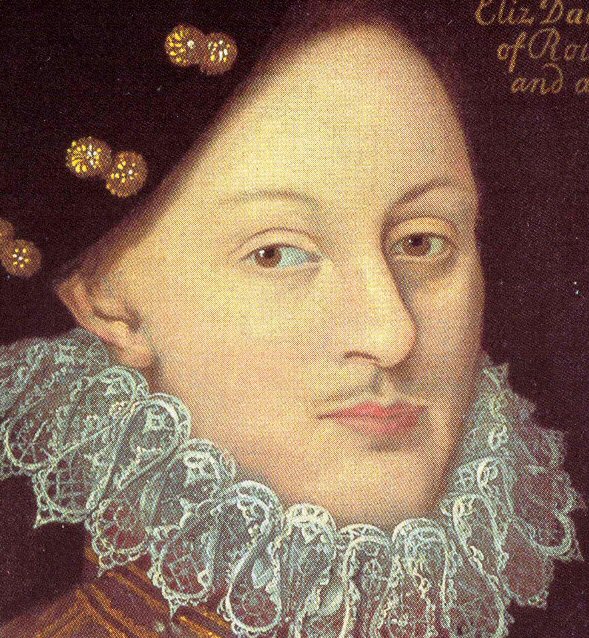 .
.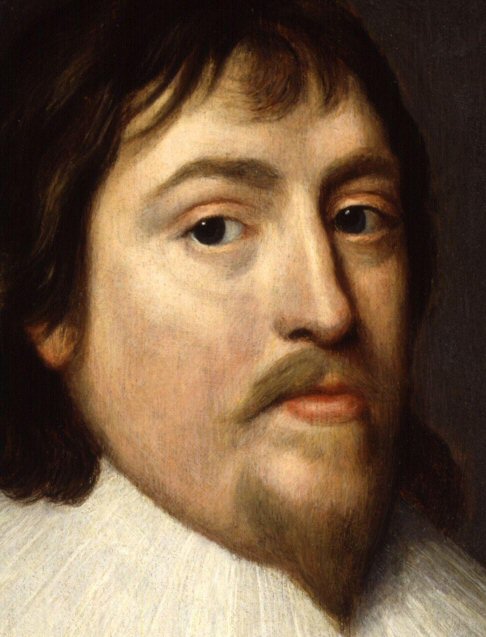
Edward deVere (shakespeare?), 17th Earl of Oxford (left)
Henry deVere, 18th Earl of Oxford (Edward's son) (right)
(source -- http://en.wikipedia.org/wiki/Edward_de_Vere,_17th_Earl_of_Oxford)
(source -- http://en.wikipedia.org/wiki/Henry_de_Vere,_18th_Earl_of_Oxford)
Edward de Vere and Marlow portraits or lack of portraitsHerbert brothers portrait(s)
I have seen nobody comment on this, but if deVere was both rich and Shakespeare how come he didn't sit for more portraits? Is the above portrait (left) the only exant portrait of deVere? I have not researched deVere portraits, but every time a deVere portrait shows up it is the one at left. Not only does he look young, but if this portrait shows Shakespeare, I would think the Oxfordians would be a little embarrassed as to how dorky he looks.The situation for Marlow is even stranger. In Marlow case you always find the same portrait too. In the PBS film from about 2002 on Marlow they explained that the Marlow portrait we now see came from a bunch of boards in a scrap heap found at his old school in England. It was in pieces and badly damaged, so the portrait we see has been heavily restored. The film said if it had not been for this fortunate find we would not know what Marlow looked like!
When I saw Philip Herbert's shoes, I couldn't resist adding his portrait (head and shoes only). Philip Herbert is one of de Vere's sons-in-law. After adding it, I found it looked familiar, so next to it I have put the Jansen Shakespeare portrait (cropped). These two heads (to my eyes) look almost identical. The Philip Herbert portrait is from Wikipedia (6/2011). Do they have the wrong portrait? Were these painted by the same painter?
 .
.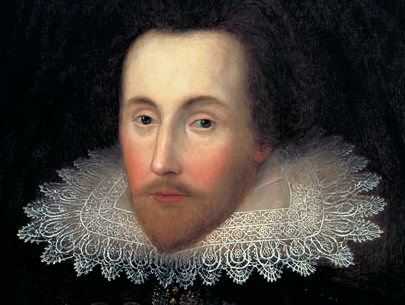
(left) Philip Herbert (cropped)
(right) Jansen Shakespeare (?) (cropped)
Philip Herbert is dedicatee of First Folio, de Vere's
son-in-law, and Chancellor of Oxford University
.
Side by side cropped portraits to show how remarkably
similar these faces are
(same angle, same bump in the nose, same forehead,
same facial shape)!
(lt) source -- http://en.wikipedia.org/wiki/Philip_Herbert,_4th_Earl_of_Pembroke)
(rt source -- http://en.wikipedia.org/wiki/File:Janssen_portrait.jpg)
.
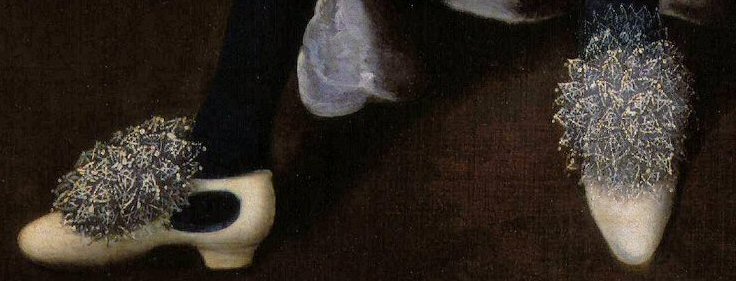
nice shoes !
Philip Herbert portrait (cropped, feet go with head
above left)
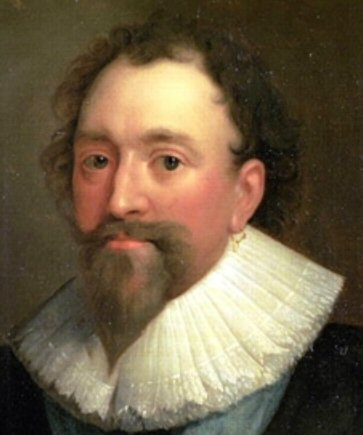
William Herbert, dedicatee of First Folio and also
Chancellor of Oxford University
Another ear ring dude
(source -- http://en.wikipedia.org/wiki/File:WilliamHerbert3rdEarlofPembroke.jpg)
De Vere family treeHouses and land in Shakespeare's will
I found online a fantastically detailed de Vere family tree (here). All the Earls of Oxford from the 1st to 18th covering 500 years! I guess the English do this kind of thing with their peerage! The family tree has the same dorky picture of Edward de Vere as above. Henry de Vere, Edward's only suriviving son, was the 18 Earl of Oxford, and he was the last Earl of Oxford because he died without children.Edward de Vere had three daughters: Susan de Vere married Philip Herbert (above), Bridget de Vere was engaged to his brother William Herbert (above), and Lord Burghley had suggested a marriage between Elizabeth Vere and Burghley's ward, Henry Wriothesley, 3rd Earl of Southampton, a candidate for W. R. of the sonnets.
For four hundred years the family seat of the de Veres' was Hedingham Castle in Essex, not too far from London.
Compare
Shakespeare's will to Ben Franklin's will
I stumbled
upon Ben Franklin's will online (below). Of course, Franklin's will was
written 150 years after Shakespeare's, but still we get to see what a rich
writer's (as well as scientist, inventor, printer, diplomat, etc) will
looks like. His will is many, many pages long. He gives specific books
in his library to organizations he is associated with. He disposes of specific
paintings and valued objects like his telescope, bible, watches, walking
stick. He was educated in free public schools in Boston, so they get a
grant. He makes a grant to a local hospital. He had been apprenticed as
a teen (to a printer), so he gives 1,000 pounds to both Boston and Philadelphia
to set up and fund apprentice programs. He gives 2,000 pounds to the town
help make a local river navigable. He details how he is to be buried (aside
his wife). He lists all the property he owns (many houses and much land)
and details who is to get what.
http://sln.fi.edu/franklin/family/lastwill.html
I suggest that before anyone reads Shakespeare's will he should read Ben Franklin's will first. This will give some perspective about what the will of a rich, educated writer is likely to contain and points up the gaps in Shakespeare's will. How is it that a rich London actor and supposed playwright with many published works of his in print at his death has accumulated nothing during his lifetime worth enumerating in his will except silverware, a sword, and of course the famous 2nd best bed?
Compare
Shakespeare and Galileo -- both born 1564
Shakespeare
and Galileo are born at almost the same time: Galileo born Feb 15, 1564,
Shakespeare baptised 26 April 1564 (as is usual with Shakespeare his birthdate
is unknown). Shakespeare becomes a famous writer in England and at the
same time Galileo becomes the most famous scientist in Italy, yet we know
a ton about Galileo's life and almost nothing about Shakespeare's. Why?
The anti-Shakespeare crowd would say the reason is because the theater
manager from Stratford was just an ordinary man, he was not the author
of the plays or poems, so what we have in the way of documentation of his
life is what you would expect from an ordinary man, a few scraps: his will,
a few court records and few entries in church records of family births
and deaths.
Now it's true Galileo lived 25 years longer than Shakespeare (died age 77 vs 52), but Galileo left a record in myriad ways that curiously is nearly blank with Shakespeare. Galileo had a complicated family life that included a mistress and illegitimate children, he worked with city officials (on its defense), he had communications and disputes with scientific colleague, he had students, he knew famous people like the local ruling princes, society people, and a cardinal who goes on to become the pope. He has a long and a complicated history with the catholic church: seeking their approval to publish his books, trying to educate them that they should not be interpreting the bible as a scientific document [“The Bible was written to show us how to go to heaven, not how the heavens go.”], and a long complex battle with the church that in later years arrests, tries, convicts and punishes him for heresy. All of this leaves a deep historical trail for the biographer to follow, plus Galileo himself leaves a written record of letters, many books, and we even have Galileo's original notebooks in his own hand.
How is it possible that Shakespeare did virtually none of this? Did he not know important people, did he not write letters, no conflicts with the complicated Anglican/Catholic churches in England, no disputes or friendships with noble classes or crown even though he was goading them with historical plays about the crown? Makes no sense. Shakespeare in his life only ever publishes a poem or two. Neither he nor his playing company during his lifetime publishes any of his plays. A huge, thick book with most of his plays (First Folio) is eventually published, but only 8 years after his death. Did his personal material get lost? Seems unlikely as his wife, daughter and granddaughter lived in the Shakespeare family home in Stratford ('New Place') for decades after his death, and his granddaughter with her 2nd marriage became Lady Barnard and lived until 1670, 54 years after Shakespeare's death.
A pro-Shakespeare type might argue it's easy to explain the lack of documentation on Shakespeare. Even though he lived in one of the most advanced and stable countries on the planet, he lived more than 400 years ago, born in the mid 1500's and died in the early 1600's. The man mostly wrote plays, a more transient and fleeting form of literature than books, so no wonder his historical record is so thin. Still when stacked up against Galileo, who during Shakespeare's 52 years is his exact contemporary, the weakness of this argument is all too apparent.
Candidate dates
and links
Ordered by
birth year
(Queen Elizabeth I)
1533 - 1603 age 69
becomes queen in 1558 at age 25
17th Earl of Oxford (Edward de Vere)
1550 - 1604 age 54
Mary Sidney Herbert (Countess of Pembroke)
1561 - 1621 age 60
Francis Bacon
1561 - 1616 age 55
6th Earl of Derby (William Stanley)
1561 - 1642 age 81
William Shakespeare
1564 - 1616 age 52
Christopher Marlowe
1564 - 1593 +? age 29 +?
for Christopher Marlowe to be a candidate
his 1593 death had to be faked
Henry Wriothesley (3rd Earl of Southampton)
1573 - 1624 age 51
William Herbert (Mary Sidney Herbert's son)
1580 - 1630 age 50
General Shakespeare links
http://shakespeare.palomar.edu/life.htm#Authorship
http://www.shakespeare.com/
Pro Shakespeare links
http://shakespeareauthorship.com/#3e
http://www.geocities.com/Athens/Troy/4081/Shakespeare.html
http://www.shakespeare-online.com/biography/
Anti Shakespeare links
http://www.shakespeare-oxford.com/
http://www.marysidneysociety.org/
An excellent summary of the detailed case for Oxford is
found here:
http://www.authorshipstudies.org/articles/oxford_shakespeare.cfm
Quick
royal/religious history around time of Shakespeare (update 1/17/13)
I have never
paid any attention to the controversy of whether Shakespeare was a catholic
or protestant in part because I had no context, knowing nothing about English
royal history. So after a little reading in Wikipedia below is a little
thumbnail sketch of kings and queens of England (and their religious affiliation)
covering the time of Shakespeare (early 1500s to early 1600s).
In the decades preceding Shakespeare's birth England was converting from Catholic to protestant Church of England. The religion of the monarch was important as it determined who got supported and who got persecuted. It's not a simple progression, as siblings (and half siblings) of the ruling House of Tutor had different religions, so a new king or queen could mean a flip in religion.
The ball gets rolling separating the Church of England from Rome about fifty years before the birth of Shakespeare by Henry VIII, who rules from 1509 - 1547 (age 17 to 55). He becomes the head of the Church of England, but he remains a believer in Catholic theological teachings even though Rome has excommunicated him. In 38 years on the throne he has six wives and children with several of them, some raised protestant and some catholic. Now the fun begins, he leaves a line of succession to the throne of several half siblings of varying ages and different religions.
Whoever pulls the strings at Henry VIII death wants his successor to be a protestant, so his 9 year old protestant son Edward becomes Edward VI (child king) ruling for six years (1547 - 1553) dying at age 15. During his time the Church of England continues to separate from Rome. It was Edward VI who 'gave' the catholic church in Stratford to the town in 1553 the last year of his reign and rechartered its school. This is the school that the Statfordians presume Shakespeare attended though there is no record of it.
Following Edward VI on the throne came Mary I his older half sister, and she was a catholic, so there was a flip in who got persecuted. Mary I (bloody Mary) had the throne for five years (1553 - 1558) and had burned at the stake 280 protestants. At Mary's death in 1558 comes her younger (by 17 years) half sister Elizabeth I (virgin queen), a protestant so there is a flip again back to protestantism. Elizabeth's 1 protestant rule began six years before Shakespeare's birth and since she rules for 44 years (1558 - 1603) it includes much of the working years of Shakespeare. Elizabeth's I successor is the protestant James I (Scottish king), and he rules during the rest of Shakespeare's life (1603 - 1625). This is the James of the King James translation of the bible and the king against whom the Pilgrims of 1620 are rebelling.
==========================================================================
'Anonymous'
--- 2011 anti-Shakespeare movie (update Nov 2011)
The good news
is that a main stream movie ('Anonymous' by roland Emmerich) has taken
up the theme that Shakespeare did not write Shakespeare. The bad news is
that the story and relationships between the characters is really far out,
more far out than I have ever seen.
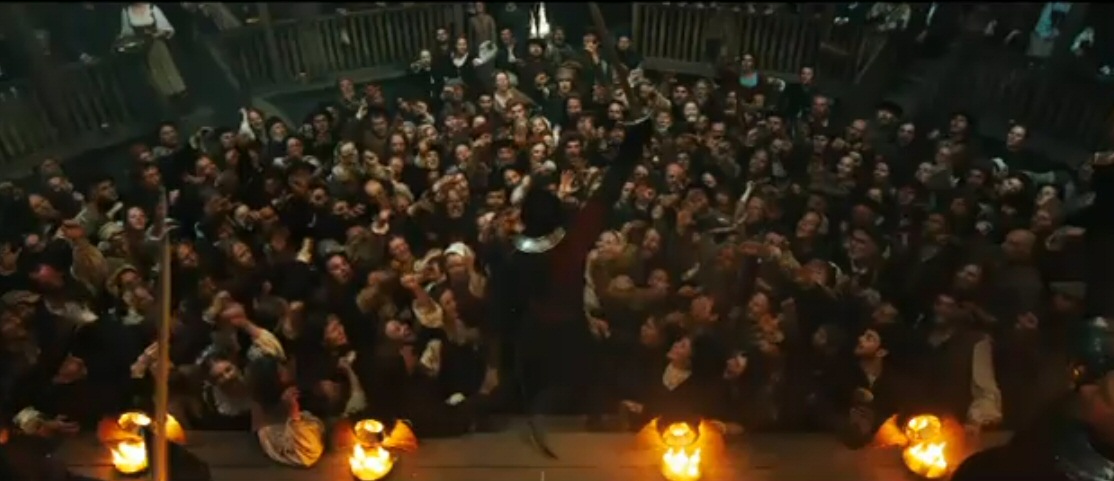
Globe theater from 'Anonymous'
movie (2011)
A lot of the key characters are presented as the children of the Queen Elizabeth, including deVere, born when she is 17 (years before she becomes queen) and Henry Wriothesley too when she is 40! The irony is that Elizabeth is known as the virgin queen!
Oh, and deVere is also the father of Henry Wriothesley having made love to his 17 years old mother the queen, so deVere is both Wriothesley's father and brother! This 'explains' the love and advice Shakespeare is giving the 'fair youth' in the sonnets. The plot also explains how Jonson and Marlow fit in: Joson didn't want to be the front man as he was wanted to be known for his own plays, and Marlow is blackmailing the nobleman author, so he gets bumped off. Neatly ties up all the loose ends, unfortunately there is little to no evidence to support most of it.
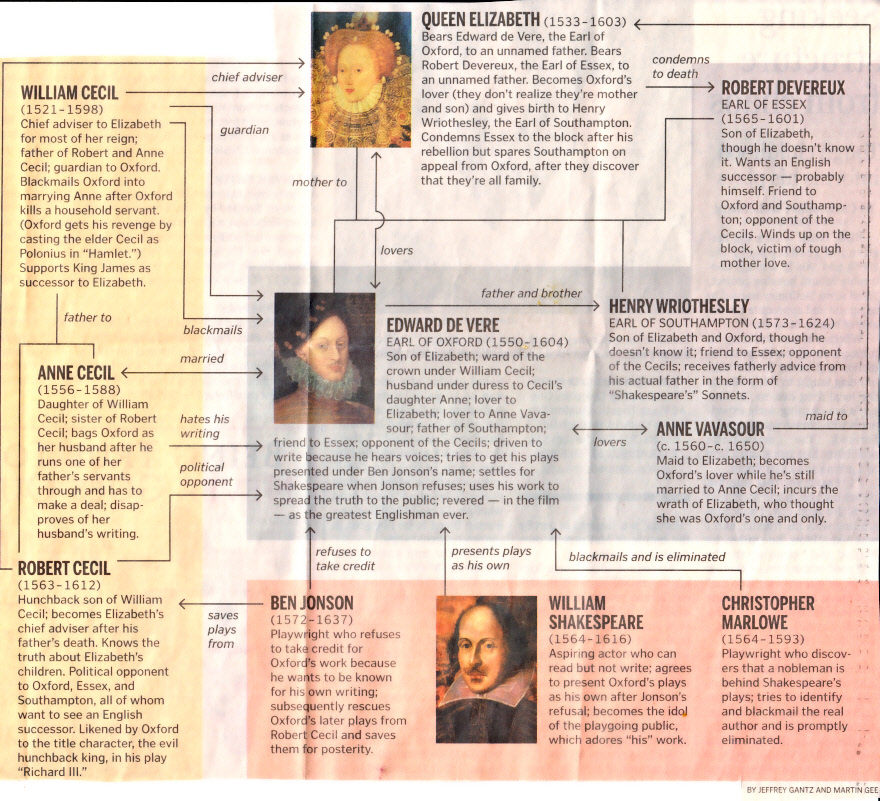
How 'Anonymous' views the Shakespeare ensemble
(scan from Boston Sunday Globe 10/30/2011)
PBS's
'Much Ado About Something'
The DVD I got was
indeed a PBS Shakespeare documentary ('Much Ado About Something'), but
when I stated watching I realized it was not the show I remembered. This
show was from 2002, and it did indeed challenge that Shakespeare was the
author, but this show was making the case for Marlowe! Turns out this was
a show I had never seen (or heard of), and I am glad I bought it because
it has some interesting new stuff.
-- There is a lot of detail about Shakespeare living in Avon after retiring from the stage in London. A pro-Shakespeare scholar from Avon says his house (now gone) had five gables like a wing of a local hotel shown. Saying it was a really big house, and he had bought a lot of land on the edge of town. That he was rich and when he died his estate in current terms would have been worth at least a million pounds. Yet his will disposes of no painting, no musical instruments, no books, no manuscripts.
Why no big property in the will?-- It does discuss how Shakespeare's (two) daughters were illiterate (and his parents were illiterate). An important point is that it says a 500 page study found that daughters of rich men were nearly always educated and literate. (19th century scholarship utilized by Mark Twain points to Shakespeare's granddaughter, who lived in town and was 8 years old when Shakespeare died, was also illiterate.)
On obvious omission from the will, which no one seems to mention meaning there is probably an obvious answer except I dont' know what it is, is that the will does not dispose of big property. Shakespeare owned a big house, lots of land outside the town, and maybe property in London too as there is a record of his buying a house in London only a few years before his death.
-- Turns out Shakespeare's Stratford on Avon house was right across the street from the grammar school (still extant) that he is supposed to have attended. Another actor heavily funded the school, but Shakespeare in his will leaves nothing to the school.
-- Long distance shots of the Shakespeare monument are interesting. It is so high up on the wall that it can't really be seen (mentioned by narrator). Not mentioned, but visible, is that to the side on the wall (also high up) is a bigger monument? The Dugsdale (?) sketch showing Shakespeare hand on a sack of grain (vague) is shown, but a pro-Shakespeare guy just says the monument was never altered, just painted. This disagreement is just left hanging.
-- The case for Marlowe (I have not yet opened the Marlowe book) seems to hinge on three key facts:
a) He was a professional playwright and has written quite a few good plays (rarely performed today) even though he 'dies' at the young age of 29. (His birth year was the same as Shakespeare's).
b) He 'dies' just as his arrest is pending for anti-god (anti-church of England) statements that could get him tortured or even executed. (This seems to be a strong point).
c) The name of Shakespeare as an author first shows up (in the registry of the poem Venus ? Adonis? around 1593) just a week or two after Marlowe dies. In other words Shakespeare man of letters is born just as Marlowe the playwright 'dies'. Good timing (devil here is in the details.)
The speculation is that Marlowe goes to live in northern Italy, where a lot of the plays are set, and he sends the plays back via his old patron. The film shows an excerpt of an older pro-Marlowe guy opening the tomb of Marlow's patron hoping to find manuscripts, but of course, there were none.
The filmaker speculates that Marlowe send to plays to Shakespeare and that Shakespeare may have been a junior co-author of the plays. Evidence in the film for plays commonly being written by several authors comes from Henslow's diary (shown on camera) that shows several people often being paid for a single play acquired.
Possible links to video of 1989 'Shakespeare Mystery'
http://www.ovguide.com/movies_tv/frontline_the_shakespeare_mystery.htm#
PBS's 'Shakespeare
Mystery'
Searching around
on the PBS web site I found the original Shakespeare show, the show I remembered,
was called the 'Shakespeare Mystery', and first aired in 1989. (Other references
says it is Season 7, Episode 12 of Frontline.) The PBS site also says the
tapes of this show (no mention of DVD) are no longer available for sale.
However, they do link to a (free) complete transcript of the show. Excerpts
of the Frontline Marlowe show (8 min) is available on YouTube.
Transcript of the original 1989 Shakespeare Frontline
show (Shakespeare Mystery)
http://www.pbs.org/wgbh/pages/frontline/shakespeare/tapes/shakespearescript.html
-- "And in his will, as it happens, he remembered Heminge and Condell, but unfortunately, and that is one of the accidents which keep happening to William Shakespeare of Stratford on Avon, the references to Heminge and Condell in the will are interlineations by another hand. Isn't that an unfortunate accident, that the link between the actors, who are the editors, or purport to be the editors, of this mass of new material never released before, have apparently been introduced into his will." (Enoch Powell) This I had remembered exactly right.PBS site -- Shakespeare
Look at the two stupid word breaks. Look at the reduction in point size as you go down the page, three point sizes in just the title! Look at the shift from all capitals to lower case (LA-mentable !!). Is it a joke? No typesetter could be this bad.
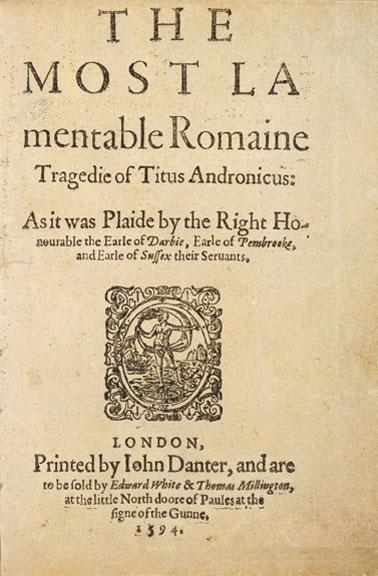
Shakespeare Folger library
(http://www.folger.edu/imgcolldtl.cfm?imageid=462)
(source -- http://en.wikipedia.org/wiki/File:Titus_title_page.jpg)
Quartro source
Above is the
only known copy of Titus Andronicus quartro, found in pristine condition
in 1904 (in Sweden!), and owned by the Shakespeare Folger library. This
quarto had been known about for centuries, but had been thought lost. The
library site says it is the "rarest and most valued quarto" in the Folger
collection. The library description of it makes no mention of its weird
typography.
While some reference say it is the first Shakespeare play make it into print, Shakespeare Folger library hedges a little saying, "(this) unique Titus quarto is ... one of the earliest extant printed Shakespeare plays, together with an early version of Henry VI, Part 2 from the same year." The library says only after 1598 did Shakespeare's name appear on the cover of quartros.
Another
example of weird typography
Looking through
the plays on Wikipedia Shakespeare page under Apocrypha. I came across
the fasicle cover of the 1592 play below. Look at the weird typography.
Another classic. [Shakespeare Apocrypha is a group of plays that have sometimes
been attributed to William Shakespeare, but whose attribution is questionable
for various reasons. (Wikipedia)]
Clearly the text has been shaped into a series of tapered inverted pyramids. The title has the same weird word breaks as the 'Titus Andronicus' quartro. What is now taken as the title of the play, 'Arden of Faversham', is buried, and five letter Arden is split between two lines with a change in point size. And check out the word LAMENTA-BLE, which has a change in point size and font! Most of the title uses a relatively simple font, but the third line [ble And True Tra-] only uses a very ornate font! All I can say is the Elizabethans had very weird ideas about what constituted good typography.
Ties to Earl
of Pembrooke
The cover
of Titus Andronicus appears to tie Shakespeare to the 'Earl of Pembrooke'
in 1594. The Herberts are the Earls of Pembroke and in 1594 the 2nd Earl
of Pembroke is Henry Herbert, married to Mary Sidney Herbert. Shakespeare
library indicates that the list of Earls on the cover is describing the
acting company that performed the play (replacing the author). This appears
to be right.
-- Henry Herbert (1538–1601), 2nd Earl of Pembroke, not only supported his wife’s patronage of poets (Walsingham - Sidney - Pembroke - Essex literary circle, or Wilton circle the name of their estate), but was himself the patron of an acting company, Pembroke’s Men. The company was formed about 1577, the year of Pembroke’s marriage to Mary Sidney, his third wife. By 1592 the company had in its repertoire several Shakespeare plays. However, the plague years of 1592 and 1593 forced the players to go on tour, but without sufficient success to keep the company going. They disbanded in 1594, selling their plays to other companies. The Shakespeare plays went to the newly-formed Lord Chamberlain’s Men.With this quarto cover there is now evidence that Shakespeare is closely tied to the Herbert family (holders of the Earl of Pembroke title) over a 29 year period (1594 to 1623): mother (former Mary Sidney, author, possible Shakespeare), father (2nd Earl, patron of acting company Pembroke’s Men) and son (3rd earl to whom (with his brother) the First Folio of Shakespeare's plays is dedicated).-- From 1594, Shakespeare's plays were performed only by the Lord Chamberlain's Men, a company owned by a group of players, including Shakespeare, that soon became the leading playing company in London.
Order of the plays
Mark Twain
in 1909 has this to say... by 1592 (according to the best authority, Mr.
Grant White) several of the plays had been written. The Comedy of Errors
in 1589, Love’s Labour’s Lost in 1589, Two Gentlemen of Verona in 1589
or 1590. (Not sure if these are the plays, but modern view is the same,
several plays had been written by 1592, when Shakespeare is 28. The same
was true for Marlowe.)
Twain here is leaning on 19th century scholarship for the claim that Shakepeare at age 25 (1589) has written two or three of his famous plays. This makes for an incredibly short time line for Shakespeare's development. Sure Marlowe is an establish playwright in his mid 20's, but as a young teen he was living not with an illiterate family like Shakespeare, but at Wilton House, one of the great estates of England, working for the famous writer Philip Sidney.
Time lines
My Shakespeare
time line
First direct
references to Shakespeare in London as a playwright are in 1592 (age 28).
By that year he already has several plays written that have been
performed.
In that year he is attached in print as an upstart playwright in the famous
pamphlet: Groats-Worth of Wit by playwright Robert Greene. Green's jibe
contains a reworking of a line from Henry VI, Part 3, indicating this had
to have been written by 1592. Shakespeare two long poems follow: Venus
and Adonis (1593) and The Rape of Lucrece (1594).
However, there is a published reference (Thomas Nashe's preface to Greene's Menaphon) to a play 'Hamlet' in 1589 (age 25). Now this is a horrible problem for the Stratfordians, because the already very short time line is shrunk three years and to make matter (much) worse Hamlet is considered one of Shakespeare's greatest works. The solution crafted by the Stratfordians is to assume there must have been another play, lost of course(!), sometimes referred to as Ur-Hamlet, written by someone else that maybe Shakespeare reworked much later.
Age 26 to 28 writing known plays
There is virtual
nothing in the historical record for seven years (1585 to 1592) when he
is age 21 to 28. He is likely still in Stratford until at least 1585, age
21, when his twins are baptized, but then nothing in the record until at
age 28 he emerges as a London playwright with a reputation and several
plays having been produced. Those seven years of no data are known as the
'lost years'. If by age 28 he has several plays performed and is
developing a reputation, he must have started play writing at least a couple
of years earlier, by age 26.
Age 23 to 26 actor and apprentice playwright
But play writing
is a craft and some time must be needed to master it. There is a famous
speech in 'Present Laughter' by Noel Coward, where the experienced actor
(Coward) tells the aspiring playwright to first get a job as an actor,
write 20 plays, learn how plays are constructed, learn what can be acted
and what cannot be acted, then and only them you might get one play performed.
Let's assume in Shakespeare we are dealing with a genius or real talent,
my guess would be the minimum apprentice time while acting and leaning
how to write plays would be three years (age 23 to 26) and easily much
longer.
So does it fit his 'lost years' time line. Yes, barely. It gives him a year or two (age 21 to 22) after the twins are baptized to leave Stratford for London, to figure out he wants to do, and to get a job as an actor.
Comparison
of Shakespeare and Mark Twain timelines
Shakespeare
is often compared with Mark Twain, one of the best (many say the best)
American writer who also never went to university and presumably was largely
self taught as a writer. So I looked up Twain's time line. Twain starts
to work as a typesetter at 12 after his father dies and at 15 is doing
some writing of articles for a small town newspaper (Hannibal MO) owned
by his brother. He goes to NYC for four years age 18 to 22, working as
a printer and is reported to have educated himself evenings in the NYC
library, then returns to MO. He spends two years getting his river boat
pilot license, then works as a pilot for two years (age 22 to 26) until
the civil war breaks out. He then works for a while as a miner out west
and begins to work as a journalist at age 27. His first national attention
comes from a short story 'Celebrated Jumping Frog of Calaveras Count' at
age 30. His first book, a collection of previously published short stories,
is published at age 32, but it is not until age 34 when his first book
of any note appears, the travel book 'Innocents Abroad', which I am now
slowly reading. Books then follow about one a year (or every two years).
So after he spends four years in NYC educating himself, we have him spending much of his 20's as printer, riverboat pilot, and miner before figuring out he wants to write. Then starting at age 27 working as journalist for seven years before his first real book, not fiction but a travel book with commentary as is next book 'Roughing It'. He doesn't write a fiction book until age 38, and his first famous book, 'Adventures of Tom Sawyer', doesn't come until age 41, after he was been writing professionally for 14 years.
It took him three years working as a writer to achieve any recognition at all (a short story in a magazine) at age 30, four more years to accumulate enough material and enough reputation to get a travel book published at age 34, and seven more years (age 41) until his first major work.
Shocking comparison
In light of
Twain's four years of self education in a city with one of the best public
libraries in the world, many years working at other jobs before coming
to writing, then seven years of writing apprenticeship before his first
(travel) book and seven more years writing until his first major work,
Shakespeare's compact timeline looks very suspect, while mathematically
possible, it does not look realistic.
Shakespeare in five or six years (starting at age 21 premably) figures out he wants to act and write, he come from boonies to London (presumably) self educates himself, he learns the art of writing, art of writing verse, art of play writing and gets real good at it, all the while supporting himself working as an actor, and emerges by age 26 (or 27) as a successful playwright, and a year later (age 28) has several plays of the 37 he is known for written and performed and has a reputation as an up and coming playwright? Really?
Of course, I suppose it is possible when he come to London he just fell into the acting job and it was a perfect match. It just suited his talents and provided him with the oportunities, background and training he needed. On the side he got educated (using his non-existent library?) while he practiced and practiced writing for a few years, all the while never writing a letter.
I read he is thought to have 'retired' to Stratford in 1612, when he is only 48, at a time when his kids are grown (oldest daughter age 29 and the surving twin daughter age 27). Thus likely most of his playwriting is done between the ages of 26 and 48. (This is consistent with the claims that that he wrote on average about two plays a year for 15 years, and one play a year after that to fill out the total of 37 plays.) Yet he couldn't have spent all his time in Stratford after 1612, because he bought a house in London in 1613.
Compare
Shakespeare and Clifford Odets time lines
Clifford
Odets, a leading US playwright in the 1930's, has some similarity to Shakespeare.
Like Shakespeare he was not university trained, as a young man he became
an actor, he joined an acting company, and before age 30 emerged as a leading
playwright writing plays for the company to which he belonged.
Odets speculated that in terms of native talent as a playwright he might be in the top dozen of all time. Odets (born 1906) doesn't go to college. In fact he drops out of high school at 16 (or 17) to act. He goes from being a not very good actor to having his first successful play open at age 29 and to recognized as a top playwright by age 32. According to Wikipedia at age 25 the company director (Harold Clurman) suggested that Odets begin to write plays since he mostly played small parts and understudied. At age 27 (1933) he begins work on 'Awake and Sing' that opened two years later at age 29 (1935) successfully on Broadway (Belasco Theater). By age 32 he has written seven plays with four of them running (concurrently?) on Broadway, and Time magazine puts him on their cover.
Odets develops into a playwright quite quickly. He first success is at age 29 and by age 32 is well established. If we date his development from the time he drops out of HS (to begin performing), it's 13 years to his first successful play and 16 years as an established playwright with several plays under his belt.
OK, so how does Odet's time line compare to Shakespeare's? On the back end Shakespeare emerges 3 to 4 years earlier than Odets (Shakespeare is well established by age 28). The front end is harder to date with Shakespeare because about all that is know for sure is the date of his marriage (age 18) and the baptism dates of his children (Susanna at age 21), both in Stratford. The simplest (and conventional) interpretation is that he lives with his wife in Stratford for three years (to age 21), and then travels the 100 miles or so to London to be an actor. This would mean Shakespeare starts on the path to performing and writing 4 to 5 years later than Odets. So Shakespeare's development time is shorter than Odets by 7 to 9 years! In the conventional scenario Shakespeare develops as a playwright in about half the time it takes Clifford Odets, who developed quite early. And Odets had huge advantages over Shakespeare in that he grows up not in the boonies with illiterate parents, but in big cities (Philadelphia and NYC) with access to good schools, libraries and theater plus he has a literate family (Odets father even published a book).
It's possible to speculate and open up the time line for Shakespeare. Maybe he did go to the Stratford grammar school (for which there is no record) and got interested in play writing early. Maybe when married he went back and forth to London. Just because Susanna was born when he was 21, doesn't mean he didn't leave Stratford for London at age 20. Maybe there was even an acting company in Stratford with which he was involved. Unfortunately the historical record of Shakespeare's life as a young man is very thin, so this is just idle speculation.
Compare
Shakespeare and Charles Dickens time lines
I stumbled
on another interesting writer to compare to Shakespeare: Charles Dickens.
Dickens, born 1812, was not university trained and like Mark Twain didn't
have a lot of schooling (was in and out of school leaving at age 15). At
an even younger age than Shakespeare or Twain he was well established as
a writer, and like Twain he went on to become one of the leading english
speaking writers of 19th century. Dickens like Twain also in later years
did extensive reading and speaking tours becoming a well known public figure.
Age 15-16 Dickens worked in offices of a lawyer, then having learned shorthand he worked as a freelance court reporter for the next four years (16-20). At age 20 he submitted his first story to a magazine, and ages 20-24 he wrote for London newspapers covering politics. His books were usually a collection of pieces that had been serialized in magazines or newspapers, and that was the case with the first of his books (Sketches by Boz) 56 short pieces written between ages 21 and 24, published at age 24. 3/4th of this first book was non-fiction and 1/4th fiction. Later that year (or next, references disagree) he finished writing his first novel, Pickwick Papers, published in 1837 when he is 25 years old, followed the next year by the first of his major works, Oliver Twist (age 26), and Nicholas Nickleby a year later at age 27.
Dickens was interested in the theater his whole life and wrote several plays (none of which I think is well known). At one point he seriously considered being an actor, but missed an acting audition he had at age 20 at Covert Garden. (Two film writer who have done a piece about Dickens, think he might have gone on to be an actor if he had not missed that audition.) He did act in amateur shows and when he was age 45 he produced a play he had written and the actress he hired for the play (age 18) went on to become his mistress.
Dickens without much formal education, and apparently largely self taught, emerges as an established writer quite early by his mid 20s, a few years earlier than Shakespeare. Like Twain, however, prior to his writing of fiction he has spent years earning a living writing non-fiction working as a court reporter and journalist. Then over 3-4 years gradually easing into writing fiction before he has his first fiction successes age 24-26 (Sketches by Boz, Pickwick Papers and Oliver Twist). So Dickens shows that it is possible for someone who leaves school early and begins working and writing early (mid teens) to acquire the great writing skills in 8-10 years and to become an established fiction writer by age 24-25, a few years before Shakespeare.
So does Dickens show Shakespeare's timeline is possible? Well he emerges before Shakespeare, but he may have started writing much earlier, giving him something like a decade to develop as a writer. Also he has the advantage that during his development years he is working in London which has a vibrant press.
Mark Twain on Shakespeare authorship
'Is
Shakespeare Dead?' by Mark Twain
When he was
age 74, Mark Twain wrote (I read somewhere Twain dictated, which
I can believe as it rambles and has few references) a small book on the
Shakespeare authorship question called 'Is Shakespeare Dead?', which he
intended to be part of an autobiography he was writing. I have been reading
it (backwards, last chapter first). It's a quick read maybe 75 pages or
so.
Twain's view of ShakespeareI have now read most of this short book (or essay) and Twain has dwelled on several points. He is using himself as reference, now at age 73 a famous writer, which makes his arguments particularly telling and strong. 'Is Shakespeare Dead?' is available online:
"I took this attitude, to wit: I only BELIEVED Bacon wrote Shakespeare, whereas I KNEW Shakespeare didn't" (quote from 'Is Shakespeare Dead?' by Mark Twain)
http://www.gutenberg.org/files/2431/2431-h/2431-h.htm
----------------------------------
Twain on video!
Twain's arguments
from his Shakepeare book are the basis of a fun 45 min video (public talk)
I stumbled on. Keir Cutler Ph. D. apparently has been going around Canada
giving this Twain talk: "Mark Twain's 'Is Shakespeare Dead?' Debunking
the myth that Shakespeare wrote the works of Shakespeare." (A magnificently
witty performance, says the Winnipeg Sun.) The video appears to have a
laugh track added and is a little corny, but dipping into Twain's book
today I know that many of his arguments are word for word from Twain's
book. (same 45 min video at Google and YouTube)
http://video.google.com/videoplay?docid=7004942638729319523#
http://www.youtube.com/watch?v=3KTCtYDxzJo
Keir Cutler is an actor. Here explains in the short video below how he set out to make a theater piece about what nuts the Shakespeare skeptics are and ended up convinced by their arguments. He is spokesman for the 'Declaration of Reasonable Doubt' (about Shakepeare's authorship).
http://www.youtube.com/watch?v=JyVjR9FNo9w
Small town memory
Twain says
I come from a small town as did Shakespeare. He says I haven't lived in
Hannibal MO for sixty years, but I am very well known there as the town's
most famous son, and as proof he presents two recent articles from the
local town paper that talk about him, one about the death of a girl he
had known when she was nine. He says that the situation in Stratford on
Avon would have been the same sixty years after Shakespeare lived there.
Anyone who had ever known him or met him would have been glad to talk about
him. But he says after Shakespeare died, no one remembered him.
Accuracy
of legal terminology
Another point Twain
dwells on is Shakespeare's use of the legal terminology. In fact he says
this argument is so strong he would let the whole authorship question hinge
on only this issue.
"And so, as I have already remarked, if I were required to superintend a Bacon-Shakespeare controversy, I would narrow the matter down to a single question—the only one, so far as the previous controversies have informed me, concerning which illustrious experts of unimpeachable competency have testified: Was the author of Shakespeare’s Works a lawyer?—a lawyer deeply read and of limitless experience? .... (These arguments are) sufficient all by themselves, as it seems to me, to settle the question which I have conceived to be the master-key to the Shakespeare-Bacon puzzle." ('Is Shakespeare Dead')He says in legal terminology there is lot of technical issues, standard usage conventions, and the customs of the courts allowing any lawyer to tell if the writer is a lawyer (or trained in the law) or an outsider. For example, usage of the terms that refer to the tenure or transfer of real property like ‘fine and recovery,’ ‘statutes merchant,’ ‘purchase,’ ‘indenture,’ ‘tenure,’ ‘double voucher,’ ‘fee simple,’ ‘fee farm,’ ‘remainder,’ ‘reversion,’ ‘forfeiture,’ etc. He explains he has been strongly influenced here by the (recent) book 'The Shakespeare Problem Restated' (1908) [Full text available free online, `, which has a chapter on “Shakespeare as a Lawyer" with 50 pages of expert testimony. Lord Chief Justice in 1850 writes in 1850, "A layman is certain to betray himself by using some expression which a lawyer would never employ." Twain copies nine of these pages to give readers a taste of this argument. Of course, Twain may be subtly biased here because his candidate, Bacon, was (among other things) a lawyer. Twain makes this argument with a Shakespeare loving river pilot he trained under. The pilot agreeing that if there is a lot of pilot talk in a book, he will be able (for sure) to tell if it was written by a real riverboat pilot, or someone who got it out of books.
Twain also explains all the detail and jargon he knows about quartz and gold mining, he having worked as a miner (described in his book 'Roughing It)', and says as soon as Bret Hart has he characters start to talk talk about mining he knows right off that Brett is not writing from first hand knowledge, he has gotten his information from books.
I would add my perspective as an EE engineer. When reading books on history of engineering issues, like the AC/DC battle, which have a fair amount of (low level) technical content. I can easily tell if the writer trained as an engineer or not. The non-engineer author, even though he/she may have immersed himself in the topic for a year or more, will invariably made small, but telling, errors that no EE would ever make, like writing voltage when he means current, or will describe the units of energy as watts.No biography
No notice at death
Another point
Twain makes is that when Shakespeare died in 1616 he had been well known
for 24 years, yet when he dies nobody notices, either in London or even
in Stratford. This is totally different from when other well known contemperary
writers (who he lists) die. He says he is sure those in Stratford who had
known him would have been glad to talk about him after his death, if anyone
had asked, but apparently no one asked.
Twain
recounts Shakespeare hard facts
He takes a
chapter and lists the few meager facts known about Shakespeare's life.
These, of course, hard hard facts from 1909, when Twain was 74. New to
me are these:
* Twain has Shakespeare not leaving Stratford for London until two years after the twins are born (1587, age 23)! This shortens his incredibly short training/apprentice period as a writer from seven years to five. (I find this too in known lists of Shakespeare facts but shown with a question mark.)
* Twain says Shakespeare's grandaughter (who he doesn't name) who was eight years old when he died (1616), as a mature woman could not read. (This grandaughter would be Elizabeth, who died in 1670 last of the direct Shakespears line. She was the daughter of Shakespeare's first born, Susanna.)
William Shakespeare's tomb engraving
* It is undiputed
he says that Shakespeare wrote the poem that is on his headstone, the only
poem he is known to have written and here it is (a piece of doggerel):
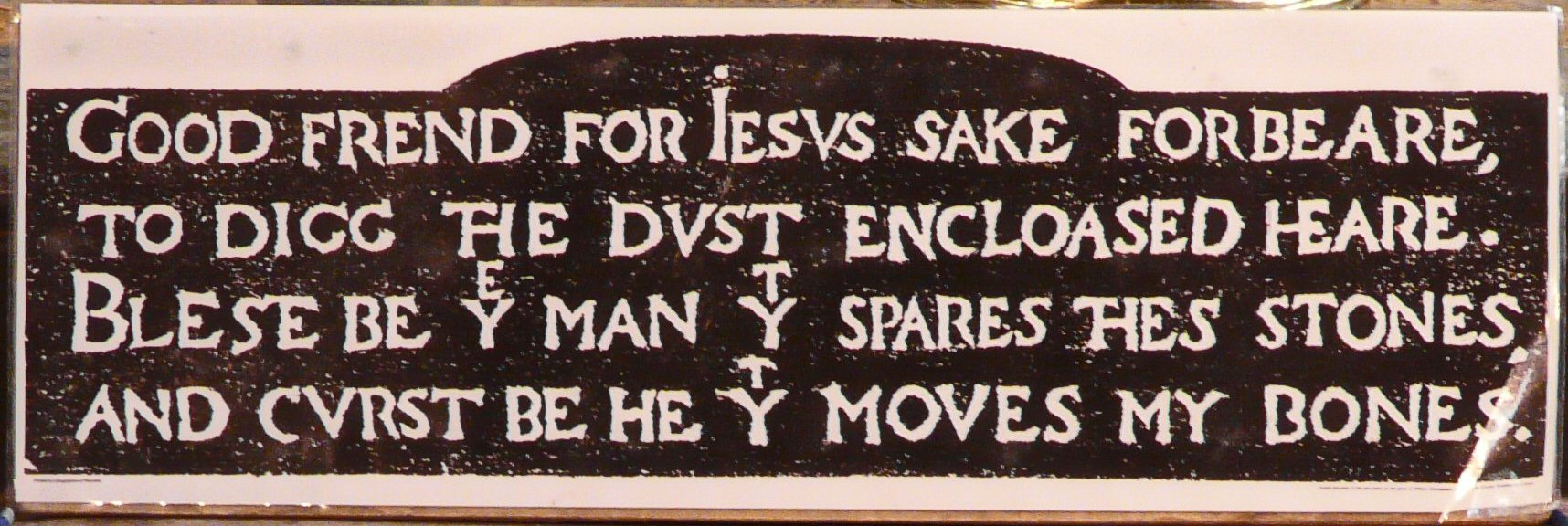
'photo' of Shakespeare's tomb headstone (really a
copy, see below) with a 'poem' reputed to have been written by Shakespeare.
Source for this attribution seems to be little more
than what church tour guides told a few visitors to the tomb in late 1600s!
(The tomb lies in the floor of the Avon church, whereas
the monument with its poem is high on the church wall.)

Actual Shakespeare engraving on the top of his tomb
in Trinity church in a recent photo (above agrees exactly with above).
I extracted (and rotated) this from a tourist picture
of the Shakespeare tomb I found online.
(Notice the engraver sometimes omits the 'A' crossbar,
like in 'encloased'.)
William Shakespeare's wife Ann tomb engraving
The tomb to
the left of William Shakespeare's in Trinity church is the tomb of his
wife, Ann Hathaway, who died seven years later, in 1623 just months before
the first folio was published. I first found the 'photo' or rubbing below
of a old looking worn inscription. A little later I found another image
(2nd below). It looks like the new plaque is an exact copy (even to indents)
of the older one. My guess is the new one is likely now mounted on the
grave in Trinity church, and from tourist photos of the church graves this
does appear to be the case.
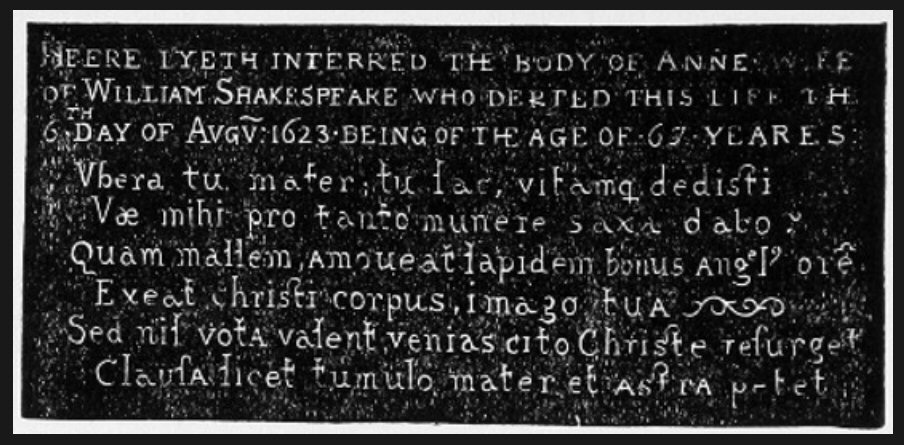
...

Shakespeare's wife, Ann, tomb inscription -- 3 lines
English, 6 lines Latin
(2nd image appears to be a new plaque mounted now
on Ann's tomb in Trinity church)
(source of newer image -- http://farm4.staticflickr.com/3563/3441550183_fc05089c91_z.jpg)
Wikipedia (Ann Shakespeare) describes her tomb inscription as follows (I updated Wiki to match the plaques):
Part 1---------------------------------------------------------
"Heere lyeth interred the body of Anne wife of William Shakespeare who departed this life the 6th day of August 1623 being of the age of 67 yeares." (departed requires a merged 'p','a', 'r')Part 2 --- Latin
A Latin inscription follows: Vbera, tu mater, tu lac, vitamque dedisti. / Vae mihi: pro tanto munere saxa dabo? / Quam mallem, amoueat lapidem, bonus angelus orem / Exeat, christi corpus, imago tua~~ / Sed nil vota valent. venias citò Christe; resurget / Clausa licet tumulo mater et astra petet (I corrected Wiki as follows using the tablet image and for a better translation: Exatvt => Exeat ('out') and added missing 'astra' (next to last word, translates to 'stars'.)Translations
Wikipedia gives this translation: "Breasts, O mother, milk and life thou didst give. / Woe is me – for how great a boon shall I give stones? / How much rather would I pray that the good angel should move the stone / so that, like Christ's body, thine image might come forth! / But my prayers are unavailing. Come quickly, Christ, that my mother, though shut within this tomb may rise again and reach the stars."I threw the above Latin into Bablefish Latin-to-Engish translation (Google translator same): Breasts, you're a mother, you suck, you gave life. / Woe is me, for the great gift of the rocks that give you? / How I would prefer, remove the stone, and I pray in a good angel / may go out the body of Christ, the image of ~ your ~ / But nothing vows prevailed. come quickly Christ, rise / Closed although tomb mother and asks for the stars.Throwing the Wiki translation into Bable fish English to Latin yields: Ubera, o mater, lacte et vita dedisti. / Hei mihi - quid enim est beneficium dabo lapides? / Potius quam movere lapidem precor ut bonum angelum / ita ut more Corpus Christi, ut imaginem tuam, exi / Sed sunt preces inefficaces mea. Veni cito, Christum matrem si surrexerit, et sit tumulus hic inclusi ad astra.
One interesting
reference I stumbled across recently is a copy of a page from Galileo's
notebook from 1610 showing the motion of the Jupitor's satellites. This
page is easy to date, because it is work from his first months with the
telescope that he included in his book the 'Starry Messenge'. This dating
is concurrent with Shakespeare who died in 1616.
-----------------------------------------------------------------------
Tracing
Shakespeare's family tree
Shakespeare's
family after his death lived on in Stratford. Shakespeare came from Stratford
and he himself lived a large part of his life there, including his later
years, and he died there. Many of his immediate family survived him and
continued living in Stratford for many years after the First Folio was
published (1623). Shakespeare dies at age 52 (1616), but one of his sisters,
Joan, outlives him by many years dying at age 77 (1646). Shakespeare has
two surviving children (both girls) and one of them (Judith) also lives
to age 77 (1662). His two children produce three surviving Shakespeare
grandchildren, the longest lived of which, Elizabeth, lives to age 62 (1670)
and her 2nd husband survives her by four years (1674). This ends the direct
Shakespeare line, but Shakespeare line, via Shakespeare's nephew's (Joan's
son) illegitimate son, may have continued living in Stratford for nearly
200 years after Shakespeare's death.
Thus a visitor, or biographer, visiting Stratford 30 years after Shakespeare's death, and 23 years after the First Folio, would have found alive Shakespeare's two daughters (Judith and Susanna), his sister (Joan Hart), plus one granddaughter (Elizabeth Hall). Daughter Judith lives another 16 years, and granddaughter Elizabeth survives her aunt by 8 more years (1670), dying 54 years after Shakespeare's death, and her husband another four years (1674). And I read the granddaughter lived in the same Henley Street house, where Shakespeare grew up, and at her death it passed to the relations of Shakespeare's sister Joan Hart.
So a visitor, or biographer, visiting Stratford 50 years after Shakespeare's death, and 43 years after the First Folio, could have found in town Shakespeare's granddaughter Elizabeth (? her husband), who might have memory of him as she was eight when he died, as well as relatives of Shakespeare's sister Joan. And as Twain, with his personal experience of Hannibal MO points out, the memory of a town favorite son lives on a long time.
Twain talks
about someone (who he does not identify, but might be Rev John Ward) who
went to Stratford (or lived in Stratford) a little less than 50 years after
Shakespeare death to see what he might find. Reportedly, says Twain, he
found the granddaughter, and she told him she was illiterate and that her
grandfather was not a poet. (The 1660's reference to Rev John Ward appears
to come from the Oxford Dictionary of National Biography. He moved to Stratford
in 1662 a period coved by his diaries, which still exist.)
------------------------------
Shakespeare's
daughter Susanna and granddaughter Elizabeth
Shakespeare's
oldest daughter Susanna married a doctor (Dr. Hall) and continued to live
in Stratford until her death in 1649. Her daugher, Elizabeth Hall, at age
8 was Shakespeare's only granddaughter when he died. Elizabeth Hall lived
in Stratford all her life (to age 62, 1670). Twain says she was sought
out about fifty years after Shakespeare's death, and it was reported she
was illiterate. (see elsewhere in this essay where I argue that Twain appears
to have mixed up Elizabeth Hall with her mother, Susanna Hall, Shakespeare's
daughter who was illiterate.)
This is an interesting point, which I have not seen discussed. Hall as a doctor (presumably) had to be literate and educated. He is married to Shakespeare's daughter, who is thought to be illiterate. So does the daughter of a professional eduated man and an illiterate wife get educated? Would she go to school or perhaps be taught at home by her father to read?Shakespeare's son-in-law book gives perspective on Shakespeare's lack of fame and his family's literacy
The original
text from the introduction to Dr. Hall's book as it relates to Susanna
literacy can be found in my write up on Dr. Hall's book here.
-------------------------
Much of what
we know about Shakespeare's daughter, Susanna Hall, and her daughter, Elizabeth
Hall, appears to come from an editors intro in Dr. Hall's 1657 book written
by by Dr. James Cooke. In 1644 Dr. Cooke is reported to have searched out
Susanna and/or Elizabeth looking for papers Susanna might might acquired
from her father (nope!) and at some point he buy's Dr. Hall's notebooks.
(Dr. Hall died in 1635, Susanna lives on to 1649. Elizabeth marries 1st
husband Thomas Nash in 1629, he dies 1642.)
An aside --- 'No books or papers in Shakespeare's will'So in 1642 did Cooke meet with Susanna or Elizabeth, or both? References not clear. It does make sense that Cooke, learning about the existence of Dr. Halls notebooks in 1642 might returned years later, after Susanna's death in 1649, to buy the books from Elizabeth. The dates work as the book is not published until 1657. (Nope, Crooke makes it clear he bought the Hall manuscript from Susanna.)
While researching Dr. Cooke I found material that puts into perspective the well known issue that Shakespeare does not mention any books or papers in his will. It is much more than this.Susanna and her husband were the executors of Shakespear's will. They move into Shakespeare big house (New Place) after his death, living with his widow Anne. While Susanna could not read, her husband was university trained. He kept detailed notes of his medical practice (in Latin), he had a lot of books (mentioned in his will). These people and circumstances would have led to Shakespeare's letters, memorabilia, books, papers, etc likely being preserved. If her father was the author of the plays and poems, certainly the family owed a copy of the huge First Folio, Venus and Adonis and his other published works! Yet 26 years after Shakespeare's death, when Dr. Cooke asks Susanna to see what she has, she says she has nothing from her father, but probably shows him her husband's medical notebooks, since Cooke either then or later buys them. This greatly strengthens the case that Shakespeare did not have any books, papers, or even literary memorabilia.
-- 31. During the English Civil War, an Army surgeon named James Cooke, who found himself stationed at Stratford-on-Avon in 1642, sought out Shakespeare's daughter Susanna, who was at that time a widow and known as Mrs. Susanna Hall. He asked her to show him any manuscripts or books that might have belonged to her father. (not what Crooke says!) He noted with surprise and disappointment that she had no knowledge of any books or documents relating to William Shaksper or Shakespeare. The only written material was that of Dr. Hall. Susanna herself never learned to read or write. This hardly sounds like the daughter of the greatest reader and writer in history.
Above from excellent list of 33 anti-Shakespeare points (by Robert Brazil)==========================================================================================
http://www.elizabethanauthors.org/problem.htm
I buy a facsimile
copy
When I found
that I could buy a copy of this book by Shakespeare's son-in-law, Dr. John
Hall, Susanna's husband, for a few dollars ($6, used, on Amazon), I bought
it. This is one of two primary documents that I think are very important
to the literacy of Shakespeare's family and to Shakespeare's local reputation
after his death. The other is the journals of Rev John Ward who became
vicar of the church at Stratford-on-Avon in 1662. The full text of Ward's
book is online.
The Hall book turned out to be a serious scholarly work of 328 pages: 'Shakespeare's son-in-law: John Hall, Man and Physician" by Harriet Joseph, hardback in excellent condition with paper cover, signed by the author, published 1964. At Amazon this book has one review, it is by me. This was one of many Shakespeare books released on the 400th anniversary year of his birth. The book includes facsimile copy of the (entire) 2nd edition of Hall's book. Joseph says she compared the three editions of the book to the Dr. Hall's exant notebook in the British Museum, and found the 2nd edition with its spelling corrections is the most faithful to Hall's handwritten original. The author has studied the book and provides a detail commentary on all its 178 cases, in addition to fully indexing it. Most importantly it includes the Preface to the 1657 first edition by Dr. James Cook, which provides (probably) the primary reference on Shakespeare's daughter Susanna's illiteracy.
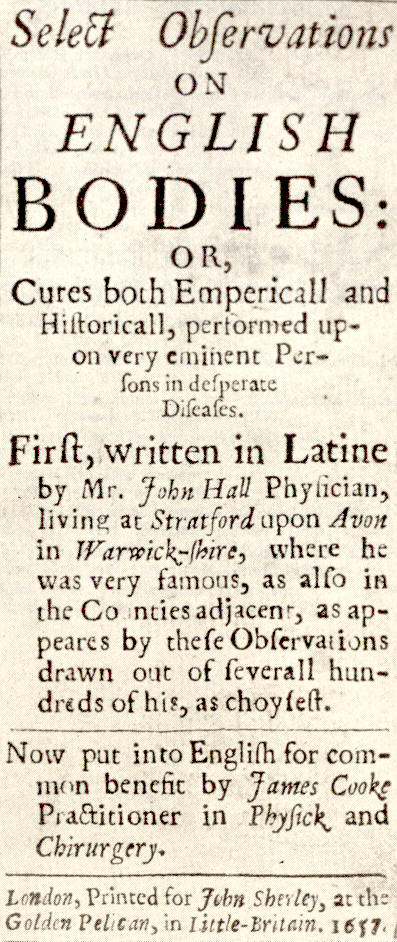 .
. 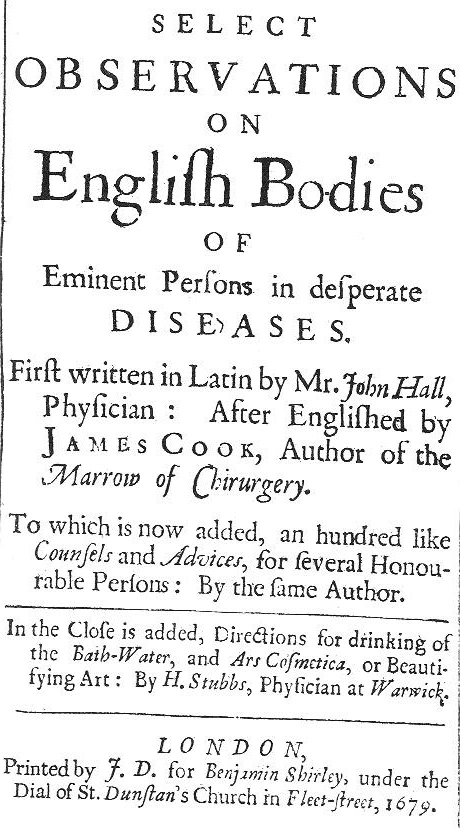
Shakespeare's son-in-law's 1657 book (translated from
Latin)
(left, first edition of 1657, right, 2nd edition 1679)
(Dr. John Hall, married to Shakespeare's daughter
Susanna)
Scans of title pages of Dr. Hall's book done by me
from my facsimile copy (Harriet Joseph, 1964)
Dr. Hall married Shakespeare's daughter in 1607, they all live close in Stratford, and he is the only doc in town (says Wikipedia), so it very likely he would have been Shakespeare's doctor attending him prior to his death in 1616. Yet (incredibly) there is no mention of his father-in-law, Shakespeare, the literary genius, in his book, a book of diseases of "eminent persons"! Proof of this is that everyone agrees there is no information about why or how Shakespeare died. We don't know how or why Shakespeare died, because Dr. Hall, Shakespeare's son-in-law and almost for sure his doctor, doesn't include Shakespeare in his book!
How far from Shakespeare did Dr. Hall live?This is consistent with a host of other evidence that Shakespeare of Avon, former actor and theater manager, was not famous at his death. He was just an ordinary man, who when he died nobody took much notice, not even his son-in-law!
Wikipedia says Susanna and Dr. Hall move into New Place in 1616 upon Shakespeare's death, sharing the home with his widow (Susanna's mother). Before this Susanna and Dr. Hall lived in a large house in Stratford called Hall's Croft. This house still stands on Old Town street. Google Earth shows the distance from Hall's Croft to New Place is only 900 feet, very close, consistent with Dr. Hall being his father-in-law's doctor after Shakespear returned to live in New Place.Measuring distances with Google Earth I find all Shakespeare sites are clustered near the center of Stratford, everything with a half mile. The house Shakespeare was born in on Henley street is 0.2 miles north of the New Place and grammar school, and Shakespeare's tomb and monument are 1/3rd mile south of New Place in Holy Trinity church.
Medical practice in 1600sShakespeare is not mentioned in his son-in-law's book
This book also provides some interesting perspective on how medical care in the 1600's. For one thing the reason the book was published after Dr Hall's death is because doctors kept their tricks and cures (such as they were) secret. Doctors were competitive. Dr. Hall writes up 178 of his most interesting cases, mostly cures he claims, but he withholds publishing until his death.The editor comments that it was a mixture of medieval medicine and herbal treatments. An example of medieval medicine is a treatment Hall applied to himself when he was terminally ill. Two live pigeons are cut open and applied to his feet to draw out bad humors. Most of the treatments are a list of herbs used as foods, purges, enemas, softening agents, etc. Some of the stuff used to produce vomiting is vile, for example, "swallows nests, stray, dirt, dung and all". He is fond of noting how many stools a treatment produces. If the patient has worms, then he notes how many worms are expelled in the stools. Hall does a little blood letting too, but the author says he was more an herbalist. He used more than 100 herbs in his treatments. Sometimes his patients would refuse blood letting.
The editor says he had one treatment that really worked, a treatment for scurvy. He used three herbs now known to be high in vitamin C. For some reason in the English countryside scurvy was quite common. The author only says this is due to a diet of mostly salted meat, salted fish and few vegetables and only seasonal fruits. But why in the English countryside are few vegetables eaten? Is this a seasonal problem as there was no way of preserving vegetables (except carrots?) through the winter?
Hall died in 1635 and this book goes through three editions, the last in 1683. This is almost 50 years after Hall died and shows how little medicine changed in the 1600s. This book was apparently highly regarded by the medical professors of the day. A professor says in the intro to Hall's book these cases are some of the best published.
Case 22
--- "Mr Drayton, an excellent poet" (This is Michael Drayton about whom
there is a Wikipedia article. He also wrote plays for the London stage
and was a contemporary of Shakespeare.)
Case 19 --
"Mrs. Hall of Stratford, my wife" (Susanna Hall, Shakespeare's daughter)
Case 36 --
"Elizabeth Hall, my only daughter" (Shakespeare's only surviving granddaughter)
Case 38 --
Mr Queeny, identified by the editor as possibly George Quiney, who was
the brother of Hall's brother-in-law, Thomas Quiney, husband of Shakespeare's
daughter Judith. "He was a man of good wit, expert in tongues, and very
learned."
Case 49 --
"Countess of Northhampton ... notably educated"
In Case 49 he speaks in positive tones of an educated lady ("notably educated"). Speaking of a contemporary poet/playwright of Shakespeare's, Michael Drayton who was his patient, he calls him an "excellent poet". When speaking of his wife, Susanna Hall, he simply calls her "my wife" and makes no mention that she is also the daughter of the (supposedly) famous poet, William Shakespeare. Likewise he does not identify his daughter, Elizabeth Hall, as also the granddaughter of William Shakespeare.
Stratfordian
scholar excuses
The obvious
disregard for Shakespeare in Dr. Hall's book, which I delight in highlighting,
is 'explained away" by the book's scholar/author with these two pathetic
excuses.
1) Not prescient
about Shakespeare's genius
2) Dating
of the observations
Not
prescient about Shakespeare's greatness
The big 'excuse'
the editor gives for no mention in Hall's book of his supposedly famous
father-in-law is that like many others he and the family were just not
prescient about Shakespeare's greatness. Here is what Joseph says, "There
is no reason to believe that Dr. Hall had greater prescience than many
of his contemporaries and hence was more aware of Shakespeare's genius"
(p19)
Let's think about this. OK, maybe few in Stratford or even the family got to London to see some of the plays. (I found in one of the cases in his book that Hall notes that his own teenage daughter, Elizabeth Hall, had recently been to London.) But what about the books, the huge thick First Folio, all the play quartros, the best selling long poem "Venus and Adonis"? Are you telling me that Shakespeare (excluding of course the First Folio, which was published after his death), his family members and other literate folks in Stratford didn't have copies of these? Come on!

First Folio 1623 is a huge, thick book (sold for 1
pound)
(source -- http://upload.wikimedia.org/wikipedia/commons/e/ef/First_Folio_VA.jpg)
About 750 copies of the First Folio were printed (228, 30% still exant). At the time it cost 2 pounds or so with leather binding. How expensive is that? Shakespeare in 1597 bought a huge five gabled house in Stratford for 60 pounds, in 1602 some land outside town for 320 pounds, and these were just some of the many properties he owned. Dr. Hall, Shakespeare's son-in-law was rich like Shakespeare with goods at his death valued at 1,000 pounds. A few big bound books like this, while very expensive, were affordable for the richer folks in town.
And how about Dr. Hall, Shakespeare's rich university trained son-in-law. How can he not own a copy of the First Folio, the lifetime output of father-in-law, London poet and playwright, who he knew very well? How about Thomas Nash Hall's rich son-in-law, husband to Shakespeare's only granddaughter, what he doesn't have a copy either? If Hall does have a copy, he doesn't mention it in his will even though he does mention books. Gee, you think maybe Hall had a clue that even though his father-in-law's name was on the cover he was not the author of the plays or poems?
Modern equivalent of First Folio (3/13)
Here in a
single volume bound in leather is the 'Complete Works of William Shakespeare',
all the plays poems and sonnets. 1,250 (thin) pages bound into a 2.5 inch
thick, handsome book. Cost: $20 retail! It's a 1994 edition prepared for
Barnes and Noble, printed in China. (A footnote says the text was prepared
in 1904 by Arthur Henry Bullen for the Stratford Town Edition.) The spelling
is modernized, at least to the extent that 'u' and 'v' spelling is modern,
the swooping 'S' (for 'f') is gone and 'Memorie' becomes 'memory', because
of this it is far more readable than a First Folio facsimile. As can be
seen in the open book picture (below), character names are placed in the
center of columns. This book is just Shakespeare's text, there are no 'explanatory'
footnotes.
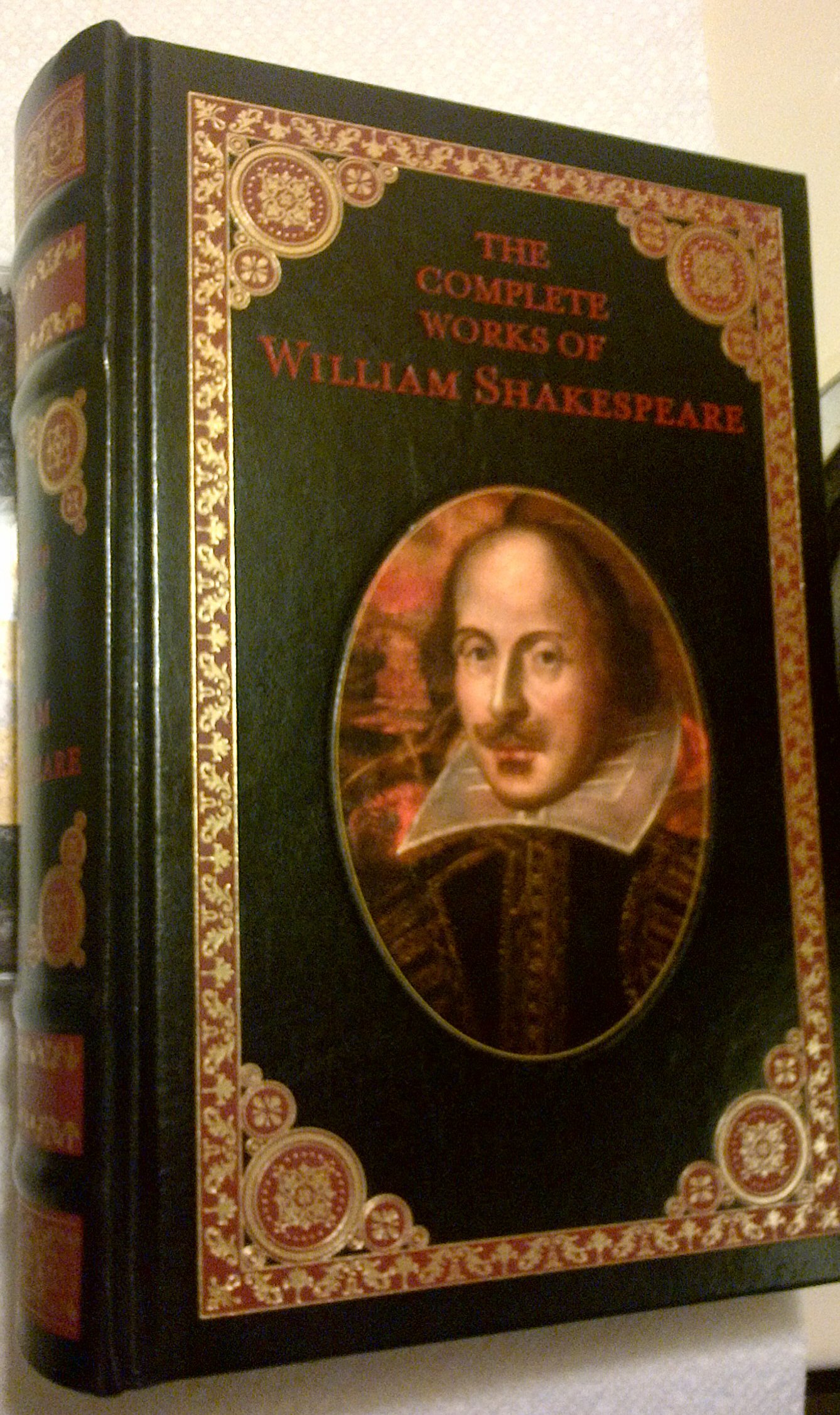 .
. 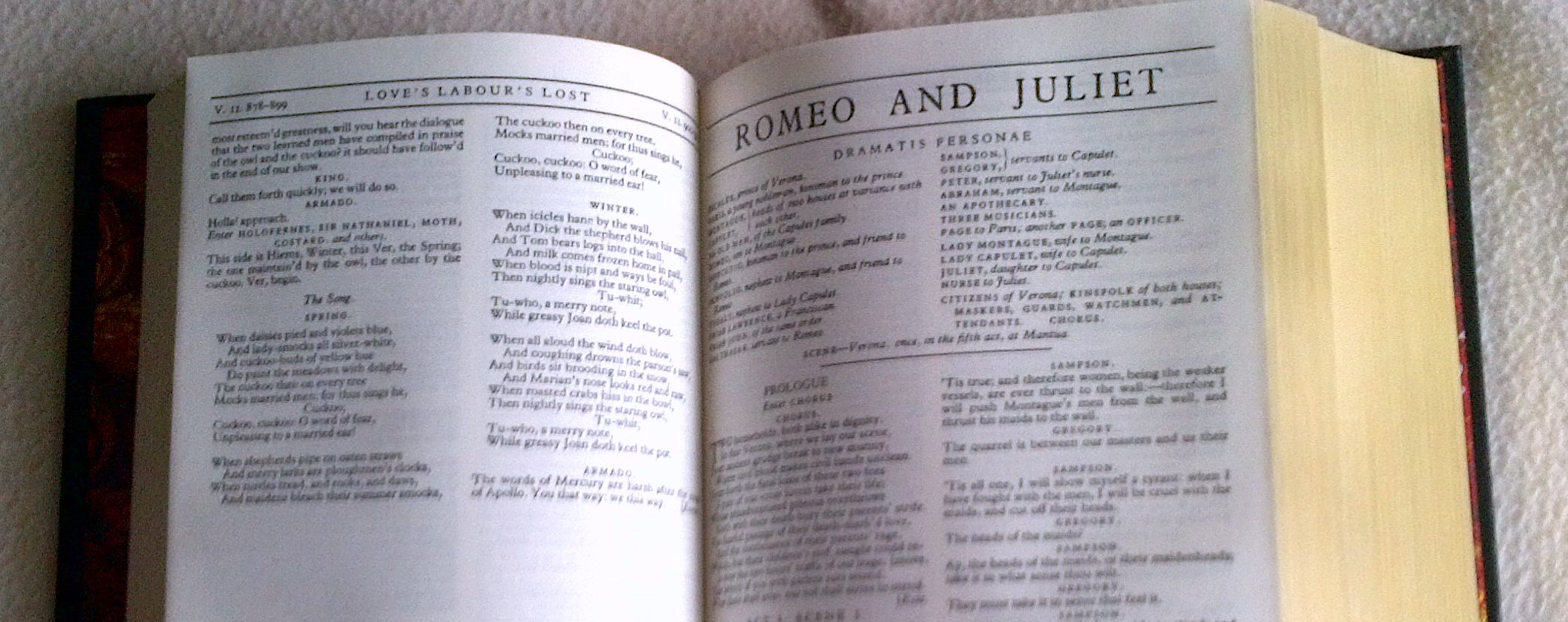
my photos taken (without flash) by the camera in Blackberry
Playbook tablet computer
Dating
of Dr. Hall's observations
The editor
(Harriet Joseph) says the earliest dated case is 1617 (one year after Shakespeare
died), which as far as I can tell is correct, adding that "there are several
cases with no dates at all". The clear implication is that most of the
178 cases are dated and they occur after Shakespeare died, thus providing
a convenient 'explanation' as to why maybe Shakespeare is not mentioned.
I have read Hall's (facsimile) book, including most of the cases, and I find this claim by the editor to be bizarre. The case dates are not hard to find, I readily spot the ones she mentioned. I find the vast majority of the cases, maybe 90% (without counting), have no dates. Most cases start with name and age of the patient plus a short bio, only occasionally is a date included. The situation is the reverse from what the editor claims! There goes that excuse. It only goes to show how how desperate (or self deluding) Stratfordian scholars must be that they twist the facts to get a more palatable result. How pathetic.
Dr.
James Cooke's preface (1657)
Probably the
primary reference for Susanna Hall, Shakespeare's daughter, illiteracy
is editor Cooke's into to the 1657 edition, which is included in Joseph's
book. Susanna is known to have been able to sign her name, unlike her sister
Judith. So what Cooke says it critical. I have typed the critical section
below:
"(A mate of Dr. Hall's) invited me to the house of Mrs. Hall, wife to the deceased, to see the Books left by Mr. Hall. After a view of them, she told me she had some books left, by one that professed Physick, with her husband, for some mony. I told her, if I liked them, I would give her the mony again; she brought them forth, amongst which there was this with another of the Authors, both intended for the Presse. I being acquainted with Mr. Hall's hand told her that one or two of them were her Husband's, and shewed them her, she denyed, I affirmed, till I perceived she begun to be offended. At last I returned her the mony."Dr. Cooke is looking for Dr. Hall's books
'Amongst which there was this with another of the Authors' is generally taken to mean there were two notebooks bought by Dr. Hall, but Hall only publishes cases from one notebook. Nothing is known of the 2nd notebook. Cooke never mentions it again, but of course this missing notebook give the Stratfordian scholars hope. Maybe Shakespeare was mentioned in this other (now lost) book., but this still doesn't explain why Cooke never published anything from it. 'For the Presse' means written to be published (but not until after his death). How Cooke would have been familiar with Hall's handwriting is not clear. 'At last I returned her the mony' probably means that he at some point, when is not clear, paid her to obtain the manuscripts. Cooke sent the book to be checked out by a medical professor (DD), so it could be that he only paid Susanna for the books after this.
Daughter Susanna's
illiteracy
Clearly here
we have first person testimony that Susanna, Shakespeare's daughter, was
unable to recognize her husband's handwriting. The most reasonable interpretation
of this is that Susanna was illiterate, or at the very least not educated
in Latin in which the book was written, the language usually taught in
schools. The book's (Stratfordian) author, Harriet Joseph, comments, "Cooke
recognized the handwriting as Hall's and offered to buy them (two notebooks)
from Susanna. She appeared not to know they were in her husband's handwriting."
It is still a rather peculiar story though, which is maybe why Cooke writes about it. The printed version of Hall's manuscript runs to 179 pages! This is no pamphlet. Hall must have worked for a long, long time on this book. He mentions his manuscripts in his will. How could his manuscripts have been preserved in Susanna's house for seven years and she not know that this big stack of manuscript papers (well, it's really one notebook) had been written by her husband, even if she could not read them? Very weird, barely believable. The only thing I can think of is that Susanna just has nothing to do with books or papers, never goes near them.Note Dr. Hall's will leaving all his books and manuscripts to his son-in-law Nash might be an indication that his daughter Elizabeth (Shakespeare's granddaughter) is also illiterate like her mother Susanna.There is also a slight conflict between Cooke's story and Hall's will. The will leaves Dr. Hall's books and manuscripts, not to wife Susanna or daughter Elizabeth, but to Susanna's husband Thomas Nash, yet it is Susanna who sells the manuscript to Cooke.
Cooke does not date this encounter with Susanna Hall, but he is thought, as a military surgeon, to have been stationed with an army in Stratford during the English civil war (1642 - 1651). Dr. Hall had died in 1635 and Susanna Hall dies in 1649 (book needs to be translated from Latin and comes out in 1657), so Cooke must have met Susanna between 1642 and 1649. I don't see any way from the book itself to date when he bought the notebooks. Most online references give the date as 1642, seven years after Dr. Hall's death, the first year of the english civil war, but Joseph thinks it is more likely 1644, but doesn't say why.
Note that Shakespeare's son-in-law, who is a writer, does own books and manuscripts, which we know because of Cooke's story and also because Hall mentions them in his will (unlike his father-in-law)!
Shakespeare's
family illiteracy
Robin Williams in
her 2006 book, Sweet Swan of Avon, 'confirms' Twain on granddaughter Elizabeth.
She mentions (p17, without attribution) that granddaughter Elizabeth Hall
could only sign with a mark. ('confirms' --- Well perhaps Williams read
Twain's book like I did) I published the following comment to a review
of her book on Amazon (June 2011):
Not only were Shakespeare's mother, father, wife and 2 surviving children illiterate, but as Mark Twain points out in his Shakespeare book, Shakespeare's only grandchild at his death, Elizabeth Hall age 8, was illiterate too. You can find a reference to Elizabeth signing with a mark on p17 of Williams book. I confirmed William's statement that most Stratfordians accept that Shakespeare's family was illiterate by checking Schoenbaum's Shakespeare biography she references.
We hear all about the wonderful grammar school in Stratford that Shakespeare was supposed to have attended. So when he was away in London, why didn't he instruct his wife to send his kids there? Oh, maybe they didn't take girls? Then what about his granddaughter, her illiteracy is critical because Shakespeare himself could have taught her to read. He lived most of his later years in Stratford as did she, I think maybe in the same or adjoining houses. How is it conceivable that Shakespeare could watch his granddaughter grow up without her being taught to read? I take this as near prove that the Shakespeare of Stratford did not write the plays and poems.When I was challenged, I responded with this post
My reply to B. J. Robbins is this:
Schoenbaum illiteracy references
Below are references on Shakespeare family literacy from Samuel Schoenbaum, a mainstream Stratfordian scholar, described in Wikipedia as the leading 20th century Shakespearean biographer and scholar from his book, 'William Shakespeare, A Compact Documentary Life' 1987. (You can see these quotes by looking inside his book on Amazon.)
John Shakespeare (William's father) signed with a mark, so "it is therefore natural to infer that he was illiterate". (p37 see also p321)
Mary Arden Shakespeare (William's mother) --- "although (it seems) she could neither read nor write, signing documents with her mark." (p21)
Susanna and Judith (Shakespeare's two surviving children) --- "Susanna (married to Dr. Hall) could sign her name, which is more than her sister demonstrates a capacity to do". (page 286)
Mark Twain reports in his book on Shakespeare that someone (Twain's book has almost no references) tracked down Shakespeare's granddaughter Elizabeth Hall in Stratford when she was quite old and found she was illiterate. Twain says, she also told her interviewer that her grandfather was not a poet. (see next for an update)Twain has got his Shakespeare references wrong
(update 7/20/11)Serious doubt that Elizabeth Hall was illiterate
I have spend considerable time looking for (primary) references on Elizabeth Hall's literacy. I am now pretty sure that Twain, apparently dictating from memory (at age 73), got Shakespeare's granddaughter, Elizabeth, and her mother, Susanna (Shakespeare's daughter), mixed up. Here's the relevant quote from Twain's book:"His granddaughter, whom he loved, was eight years old when he died, yet she had no teaching, he left no provision for her education although he was rich, and in her mature womanhood she couldn't write and couldn't tell her husband's manuscript from anyone else's -- she thought it was Shakespeare's." ('Is Shakespeare Dead?, p34)One of the primary references for Susanna's illiteracy is the book written by her husband, Dr. Hall. Its editor, who bought the book's manuscript from Susanna after Dr. Hall's death, says in the book's introduction that she did not recognize that it was in her husband's hand. This was probably Twain's reference.Elizabeth Hall was the daughter of a doctor and writer so she may very well have been literate. However, a weak indication (and it is weak) that possibly she could not read is this. When her father died, he left his books and manuscripts in his will not to Elizabeth (nor to his illiterate wife, Susanna), but to Elizabeth's husband, Thomas Nash. Other than this I can find nothing on Elizabeth Hall's literacy.
Grandfather was 'not a poet' is a myth
I also want to correct this, which I wrote above: "Twain says, she also told her interviewer that her grandfather was not a poet." I reread Twain's book and he does not say this. (What happened here is I read at the same time I was reading Twain's book an article that said Twain said this in the book, and I conflated them.) However, you can find it online (it's in a YouTube video where the reference given is Rev John Ward, vicar of Stratford church in 1660's), but it is not in Rev Ward's journals either, so I now think the "not a poet" quote is a myth.
More on
Elizabethan literacy
Below is an
interesting postscript page from Schoenbaum's 'William Shakespeare, A Compact
Documentary Life' 1987 that explores the issue of illiteracy, including
Shakespeare's father John's illiteracy, and using a mark to sign. Note
near the bottom --- When people signed with a mark "it was a question of
capacity not of choice". Translation if people signed with a mark it was
because they could not write. Also relevant is that records show about
90% of women at this time (1600) could not sign their name.
Note the hedging here, as the scholar quoted below by Schoenbaum argues it can't be ruled out that Shakespeare's father, or anyone who signed with a mark, even though it was unlikely they could write, might have been partially literate, meaning able to read, because reading was taught before writing. If this is true, it's a fair point.
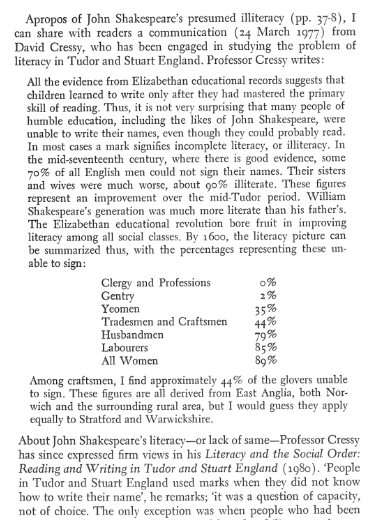
screen capture of page 321 (postscript) from 'Looking
into' on Amazon of
Sam Schoenbaum's William Shakespeare, A Compact Documentary
Life' 1987
(the exception at the end refers to infirm or senile
people)
Shakespeare's twins
One twin,
Judith, married just a few months before Shakespeare died and contined
to live in Stratford. She lived to age 77 (1662), outliving her children
by over twenty years. She had two children who survived infancy, but they
both died young, around age 20, in 1639. The other twin, Shakespeare's
only son died at age ll. But prior to his death presumably as a boy he
would have attended the well regarded Stratford grammar school near his
home. Didn't Shakespeare while in London ever write his son a letter?
Hamnet or Hamlet? (2/24/13)
What was the
name of Shakespeare's son? Every reference I had ever seen calls him 'Hamnet'.
Today I'm watching a one hour PBS shows on the play Hamlet produced by
the Royal Shakespeare company. The show starts with the narrator saying
that when Shakespeare is age 30 his son Hamlet has recently died.
What, isn't his son named Hamnet? Sure enough up pops a professor on screen
and he says the same thing, calling Shakespeare's dead 11 year old son
Hamlet. Give me a break. You mean so little is known of Shakespeare's life
that 'experts' don't agree on the name of his son!
Shakespeare's
brothers and sisters
Shakespeare
had three brothers and one sister who survived beyond childhood. All were
younger than Shakespeare, but only one outlived him, Joan, who lived to
1646 (age 77). Were they literate? No one seems to know, but it is
clear that like Shakepeare they grew up in an illiterate household, i.e.
with an illiterate mother and father.
1564 April 26 William was baptised (died 1616 aged 52
)
1566 Gilbert (brother of the Bard ) was baptised (died
1612 aged 46)
Taking the trade of a haberdasher. He followed his brother to London where he established a good and successful career. He returned often to Stratford. He never married.1569 Joan Hart (sister of the Bard) was born (died 1646 aged 77)
-- Joan, sister of the Bard, lived in the Henley Street house until she died in 1646, at the age of 77 a remarkable lifespan for this era. Her son, William Hart (died 1639), never married but he is believed to have fathered an illegitimate son called Charles Hart who became a leading actor of the Restoration period. Joan's descendants stayed in Stratford until 1806.1574 Richard ( brother of the Bard) was baptised (died 1613 aged 39)
-- It is even possible that this brother of William Shakespeare could not even read or write, which would partly account for the fact that very little else is known about Richard.1580 Edmund (brother of the Bard) was baptised (died 1607 aged 27)
-- He followed William to London to embark on an acting career. ... There are no records of the reason for Edmund's early death but another terrible outbreak of the plague in London in 1608 was well documented and it is quite possible that the Black Death again claimed another one of the Shakespeare family.----------------------
-- Venus
and Adonis in the Stationers’ Registrar on the 18th of April, 1593 and
The Rape of Lucrece on the 9th of May, 1594.
-------------------------------------------------------------------------------------------------------------------------------
Weird
sweeping 's' in Shakepeare's printed name
Another Elizabethian
typography weirdness is the how the lower case 's' in Shakespeare's name
is printed. I looked at a whole bunch of facsmile quarto title pages and
the second, lower case, 's' in Shakespeare's name is usually, but not always,
printed with a sweeping 's' that to the modern eye is close to an 'f' (without
cross bar). The 1622 title page of the Othello quartro (below) is typical.
Note it includes the word 'Black-Friers' in the same font and point size,
and it uses a non-stylized 's'.
Is the sweeping 's' a stylistic thing used for names or signatures? The 'W' of 'William' here is unusual too. It looks almost like it's printed as two 'V's, yet 'W' in the preceeding 'Written' shows the printer has a 'W' character.
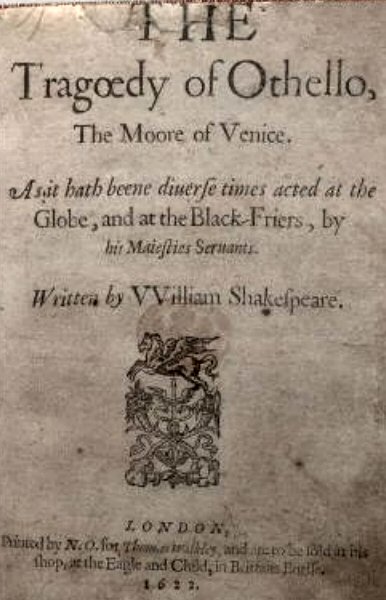
Sweeping 's' typography --
compare the sweeping second 's' in Shakespeare's name
to the
lower case 's' in Black Friers, which is in the same
font and point size
(source -- http://internetshakespeare.uvic.ca/Library/facsimile/book/BL_Q1_Oth/?zoom=1)
Here (below) is another quartro title page from 1600 shows normal 's' and sweeping 's' used interchangably willy nilly. This quarto is unusual in not using a sweeping 's' in Shakespeare's name. However, it does have some sort of do-dad flourish connecting the 's' to the 'p' in Shakespeare's name.
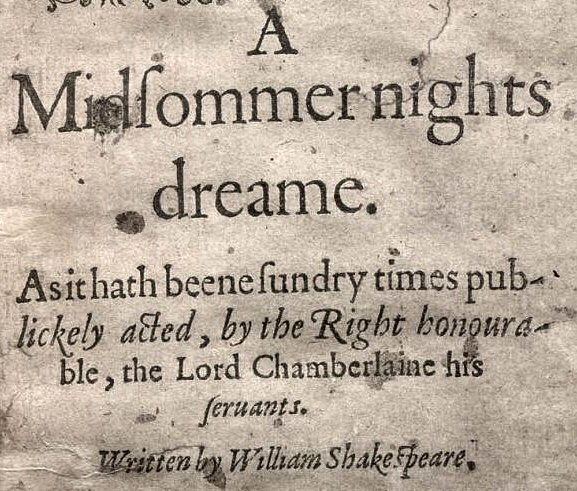
Shakespeare 1600 quartro title page
shows a crazy mixture of sweeping and normal 's' typography
(source -- http://internetshakespeare.uvic.ca/Library/facsimile/book/BL_Q1_MND/?zoom=1)
u,v and i,j
In facsimile
you often see 'u' for the modern 'v' (for example, 'haue' for 'have') and
'i' for 'j'. I read the explanation of this is Elizabethean alphabet had
24 letters with pair (u,v) and (i,j) being treated as one. There was also
a 'y' type character that represents (sort of) 'th'. The reference says
'ye' means 'the'. This chaaracter appears twice in the monument poem: 'ys'
and 'yt'. If 'y' is standing in for 'th...., then logically I would think
that these meant 'this' and 'that', and this is just what I find in the
modern version of the poem in Wikipdia, but the early Shapearean editors
wrote it like this (2nd line):
All YT HE HATH WRITT,
DOTH DECK YS TOMBE,
all that
he has writ
doth deck the tombe
=======================================================================
Raw Twain notes
Is Mark Twain Dead?: Samuel Clemens and the Question of
...
onlinelibrary.wiley.com/doi/10.1111/j.1756-2597.2004.tb00014.x/pdf
by J Falocco - 2004 - Related articles
He suggests that no one in Stratford remembered Shakespeare
when Nicholas Rowe went to the village for research sixty years after Shakespeare's
death. ...
Thomas Patrick Betterton (ca. 1635 – 28 April 1710) Shakespearean
actor
Nicholas Rowe is first biographer and editor of Shakespeare's
plays
Shakespeare's father buy house on 'Henley Street' (expanded
to New House?), no
New House is near bridge. Shakespeare and later Lady
Bernard lived there until she died in 1670.
Will says daughter Susanna gets New Place and two houses
on Henley street and House in Blackfriers
--------------
Delia Bacon (no relation to Francis) and William H. Smith,
who each published a book in 1857
Bacon's scholarship had a profound effect on Mark Twain,
who said his disbelief in Shakespeare as the true Bard "was born of Delia
Bacon's book."
(70) When James Cooke, who was an Army surgeon attached to troops stationed at Stratford-on-Avon in 1642, called upon Shakspere's daughter Mrs. Susanna Hall, he asked to be shown any manuscripts or books belonging to her husband or father. (Important --- This is not right. I have Dr. Hall's book and in the intro Cooke says that he goes looking for books owned by Dr. Hall. There is no mention of looking for books of Shakespeare.) Why did she say that she had not got any books or manuscripts or anything in her father's handwriting? (from 1950's)
http://freepages.genealogy.rootsweb.ancestry.com/~shakespeare/poet/questions.htm
** Dr. James Cook is the doctor to whom Sussanna Hall gave her husbands manuscript for publication (published 1657). According to the Oxford companion to Shakespeare by Stanley Wells (here). Wells says when Dr. Hall died in 1635, a rich man, his will gave his property and money to his wife and daughter, Elizabeth Hall, but he left his "study of books" and "manuscripts" (including the later publshed book transated from Latin) to his son-in-law Nash (Elizabeth's first husband). Here is a weak confirmation of Twain's claim that Elizabeth Hall was illerate, she gets the money and property from her father, but his books and manuscripts (in Latin) go to her (first) husband.
*** Cooke, in the introduction to Hall's book, relates the strange manner in which he became possessed of them, Mrs. Hall not knowing they were in her husband's handwriting, and, believing they were part of a poor scholar's mortgage, transferred them to him with other books.
-- In his introduction, Cooke gives an account of his interview with Susanna and describes how he obtained the manuscript:
...to see the Books left by Mr. Hall. After a view of them, she told me she had some Books left, by one that professed Physick, with her Husband, for some mony. I told her, if I liked them, I would give her the mony again; she brought them forth, amongst which there was this with another of the Authors, both intended for the Presse. I being acquainted with Mr. Hall's hand, told her that one or two of them were her Husband's and shewed them her; she denyed, I affirmed, till I perceived she begun to be offended. At last I returned her the mony.-- has studied the case notes faithfully recorded by Dr John Hall on 155 of his patients (both success stories and failures) over the period 1611- 1635.
** Hall in his book writes about his own, his wife's and
his daughters illesses, but not his father in law!
-- (Hall mentions
without any date an illness of his wife, Mrs. Hall. "Obs. XXXVI." concerns
his only daughter, and supports my opinion of a constitutional delicacy
of Anne Hathaway and her family. It is not insignificant that her grandchild
should suffer from "tortura oris," or convulsions of the mouth, and opthalmia.
)
-- But " (1639) To this document Mrs. Hall appended her signature and her seal, with the arms of Shakespeare impaled with those of Hall."
-- In 1649 Elizabeth Hall's mother (Shakespeare's daughter dies). --- "Here lyeth the body of Susanna, wife of John Hall, gent., the daughter of William Shakespeare, gent. She deceased the 11 day of July, Anno 1649, aged 66. (Note Dr. Hall and Shakepeaare are both listed as gent, he not poet.) Someone in 1649 writes a real poem about Susanna Shakespeare. (perhaps written by Elizabeth Hall, or it might have been written by her new husband Barnard) ---she marries John Barnard, of Abington, Northamptonshire, at Billesley, a village four miles from Stratford, June 5, 1649. Barnard is knighted in 1661.
"Witty above her sex, but that's noy all,
Wise to Salvation was good Mistress
Hall,
Something of Shakespeare was in that,
but this
Wholly of him with whom she's now
in blisse.
Then, passenger,
hast nere a tear
To weep with her that wept with all
That wept,
yet set herself to chere
Them up with comforts cordiall?
Her love shall
live, her mercy spread
When thou
hast nere a tear to shed."
http://freepages.genealogy.rootsweb.ancestry.com/~shakespeare/books/stopes/chapter9.htm
*** One of Hall's two original notebooks survives. So we have no handwritten letters or manuscripts from Shakespeare, but we have a book length handwritten notebook from Shakespeare's son-in-law!
I read his Shakespeare's father and mother die intestate (no will) in 1601 and 1608 respectively and are buried somewhere by the Stratford church, but there is no trace of any sepulchral monument or memorial. Shakespeare was a rich man by the time of his parents death.
http://www.archive.org/stream/shakespeareperso00chaprich/shakespeareperso00chaprich_djvu.txt
(79) Twenty-two years after the publication of the First Folio of the "Shakespeare" Plays in 1623--namely 1645--the French people apparently had not heard of Will Shakspere of Stratford-on-Avon as a playwright, because in that year Jan Blaeu published his "Theatre du monde" in which, describing Stratfordon-on-Avon, he wrote: "The Avon passes against Stratford, a rather agreeable little trading place, but which owes all its glory to two of its nurslings: to wit, John de Stratford, Archbishop of Canterbury, who built a temple there, and Hugh de Clopton, who threw across the Avon, at great cost, a bridge of fourteen arches." How is it that there is not a word in this book about the man on whom Stratford-on-Avon now depends for its sole, well main, claim to fame?
no record that anyone at Stratford was able to say that his father or grandfather attended at the same school as the celebrated dramatist?
King Edward VI School: Most historians agree that Shakespeare attended grammar school here from age 5 to 13.
Samuel Ireland goes to Clopton house in Stratford in 1794. Farmer living there tells him he burned baskets of papers and letter with name Shakespeare on them two weeks earlier. Come on, these papers would be almost 200 years old and they get burned two weeks earlier???
When the inquirer came at last he got but one
fact--no, _legend_--and got that one at second hand, from a person who
had only heard it as a rumor, and didn't claim copyright in it as a
production of his own. He couldn't, very well, for its date antedated
his own birth-date. But necessarily a number of persons were still alive
in Stratford who, in the days of their youth, had seen Shakespeare nearly
every day in the last five years of his life, and they would have been
able to tell that inquirer some first-hand things about him if he had in
those last days been a celebrity and therefore a person of interest to
the villagers. (Twain's book)** His granddaughter, whom he loved, was
eight years old when he died, yet she had had no teaching, he left no
provision for her education although he was rich, and in her mature
womanhood she couldn't write and couldn't tell her husband's manuscript
from anybody else's--she thought it was Shakespeare's. (Twain, Is Shakepeare Dead?)
Twain admits that he incorporated in the book a larger
part of a chapter from a volume called "The Shakespeare Problem Restated,"
written by George G. Greenwood, M. P., of London. (about being a lawyer)
Note 1
This is the introduction to Nicholas Rowe's 1709 edition
of Shakespeare's plays. It was published again in a second edition in 1714,
without change. Rowe was both the first editor of Shakespeare and his first
biographer. This Account became the standard 18th Century biography, and
in fact became the foundation document for all subsequent biographies.
Though it contains inaccuracies, it also preserves information which, were
it not for Rowe, would surely have been lost. Rowe acknowledges his debt
for "...the most considerable part of the passages relating to this life..."
to the actor Thomas Betterton (1634-1710), who made "a journey to Warwickshire
on purpose to gather up what remains he could, of a name for which he had
so great a veneration." [See section 12]
=============================================================================
Tracking down Twain's reference for granddaughter
Elizabeth Hall's illiteracy
I reread Twain's
book (takes about 30 min). Below is what Twain says about Shakespeare's
granddaughter:
"His granddaughter, whom he loved, was eight years old when he died, yet she had no teaching, he left no provision for her education although he was rich, and in her mature womanhood she couldn't write and couldn't tell her husband's manuscript from anyone else's -- she thought it was Shakespeare's." ('Is Shakespeare Dead?, p34)Twain's scramble
The comment that she "couldn't tell her husband's manuscript from anyone else's" very likely comes from the introduction to Dr. Hall's book (1657) by its editor who got the manuscript from the Hall family. The editor says it was Susanna, Dr. Hall's husband, who was unable to identify Dr. Hall's handwriting.
Her grandfather was not a poet
On a reread
I do not find in Twain Elizabeth Hall being tracked down as old lady, nor
her saying 'her grandfather was not a poet'. I must have first heard this
somewhere else, where I do not remember. Maybe I read it here, this matches
my memory:
"Less than fifty years after his death, an admirer dissatisfied with paltry biographical information traveled to Stratford-upon-Avon in the hope of learning something more. Arriving during the spring of 1662, the Reverend John Ward traced the whereabouts of William Shakespeare’s granddaughter, who told him her “grandfather was not a poet.” Her statement seemed borne out by the man’s death certificate, which refers to him only as a “gent,” not a dramatist or “poet.” Moreover, she was illiterate, as was Shakespeare’s own wife, daughter and father. That the most gifted master of the written word would have been contented with family members unable to read his own work seems incredible. Ward then located Shakespeare’s last will composed in March 1616. It listed no books—costly items during the seventeenth century—or manuscripts, things the Bard might have been expected to own. These and numerous, related discrepancies convinced Mark Twain...." (Atlantic Rising, an ancient mystery site!)Finally I found the grandfather quote in (of all places) a YouTube video (below):
http://www.youtube.com/watch?v=946tLlFPsQs&feature=related
The video identifies the reference for the quote as Rev John Ward (1662). Rev Ward went to live in Stratford in 1662, and he kept diaries that survive. Elizabeth Hall did not die until 1670 and lived in Shakespeare's old house, so Rev Ward may very well have spoken to her. (Shakespeare's daughter, Judith, was alive until Feb 1662, so he might have met her too.) I have not yet tracked down the contents of Rev Ward's diaries to see if it contains the relevant quote.
The content is searchable in Google books, but I do not find the quote. I am beginning to think this is myth, just endlessly repeated. (Good heavens, Google brings up me (this essay at #5) as a reference search: "her grandfather' "not a poet")
http://books.google.com/books?id=XZ0LAAAAYAAJ&q=shakespeare#v=onepage&q&f=false
This book like Dr. Hall's book is a valuable early reference. Rev Ward starting in 1662 is the vicar of what he calls the "Stratford Church" built he says by "Sir Hugh Clopton". Is this the church where Shakespeare's monument is? Probably. (Yes) His diaries run from 1648 (age 19) to 1681 (age 52)
While the Shakepeare monument is described in the introduction, apparently the Rev never mentions it, even though he writes of the church. He is also a doctor and wrote about his medical practice. These books are really his journals for his personal use, not diaries. They are preserved in the Medical Society of London.
Another interesting tidbit that Shakespeare was nothing special in his hometown is this (from the Ward book introduction). A poem inscribed for Shakespeare's daughter Susanna on her tombe was later (when?) deliberately obliterated so the stone could be recarved for someone unrelated to the Shakespeare family (Richard Watts of Rhyon Clifford). We only know of the poem, because Dugdale recorded it.
Weak evidence Elizabeth Hall could not read
Dr. Hall's will
disposes of a "study of books" and manuscripts he owns, but they go not
to his daughter Elizabeth, but to her husband (Thomas Nash), which would
makes sense if Elizabeth could not read or was not well educated. It could
be, however, that inheritance favored men so strongly that an inheritance
from the wife's family went not to her, but to her husband. Whereas none
of Shakespeare's handwritten documents (if there are any!) survive, one
Hall's two handwritten manuscripts for his book survives.
=====================================================================================================
New
Place is adjacent to Stratford's grammar school (update 1/13/13)
New Place
was the Shakespeare family home in Stratford on Avon in his later years
(after 1597), and he died there. Maps and Google Earth shows that 'New
Place' was at the corner of Chapel Lane and Chapel St. What's there now
is the Nash house (open) with its adjacent gardens and in the gardens are
foundations
of New Place.
Google Earth 'ruler' shows Stratford on Avon is 83 miles from London, which means realistically travel distance to London would be nearly 100 miles, quite a long journey by coach or horseback. A reference says an Amish buggy pulled by a horse does about 10 miles/hr, so in a long day (10-12 hours) a 100 miles trip is possible. However, it says horses can only go about 20 miles before needing a long rest, so to do 100 miles in a day would require several changes of horses.
In 2010-2012 an architectural dig was done in the Nash gardens. Also a sketch of New Place exists from 1737 by Vertue (a few years after it was torn down). Based on this below is possibly what Shakespeare's house (purchased 1597) looked like plus additional land bought in 1602. New Place was passed to his daughter (Susanna) who lived in it, and then to her daughter (Elizabeth, Shakespeare's granddaughter) who lived in it until her death in 1670. The Nash house next door was owned by Elizabeth's first husband. (cozy group, Elizabeth marries the guy who lives literally next door)
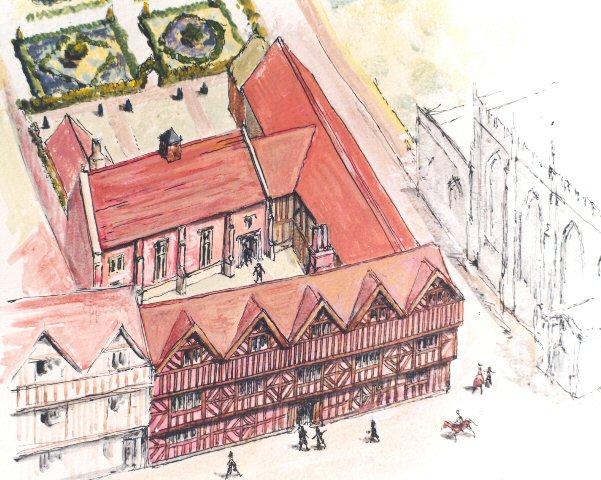 .
. 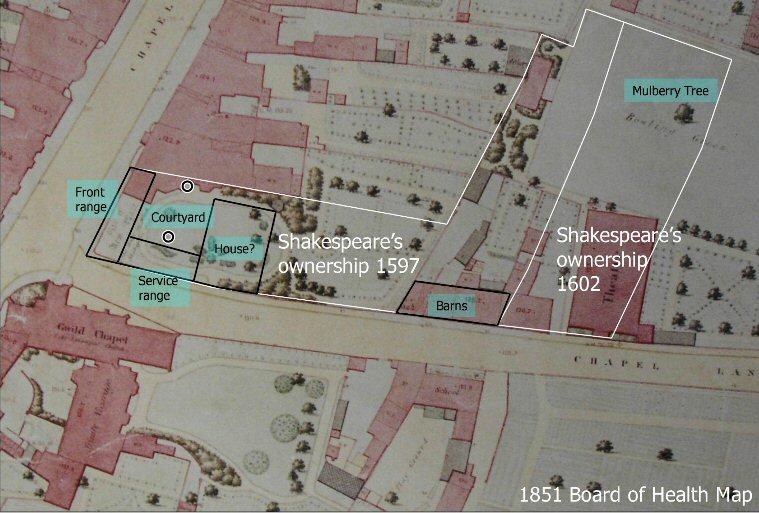
(left) New Place house (reimagined)
(right) Someone has attempted to show Shakespeare's
land holdings behind the house,
including a 1602 purchase of additional land
Literally across the street (Chapel Lane) from New Place is the Guild Chapel (stone church) and attached King Edward VI school, which bills itself as 'Shakespeare's school. This school has been in continuous operation for about 460 years, granted a royal charter in 1553 about ten years before Shakespeare was born. Some of the school buildings and the stone Guild Chapel go back to well before Shakespeare's time, the church was built in the current form in the 1400's. The Guild Chapel started life as a catholic church, but in 1553 as part of the reformation that surpressed the catholic church in England, the crown gave the church and its school properties to the town of Stratford (from school's web site, history of the buildings).
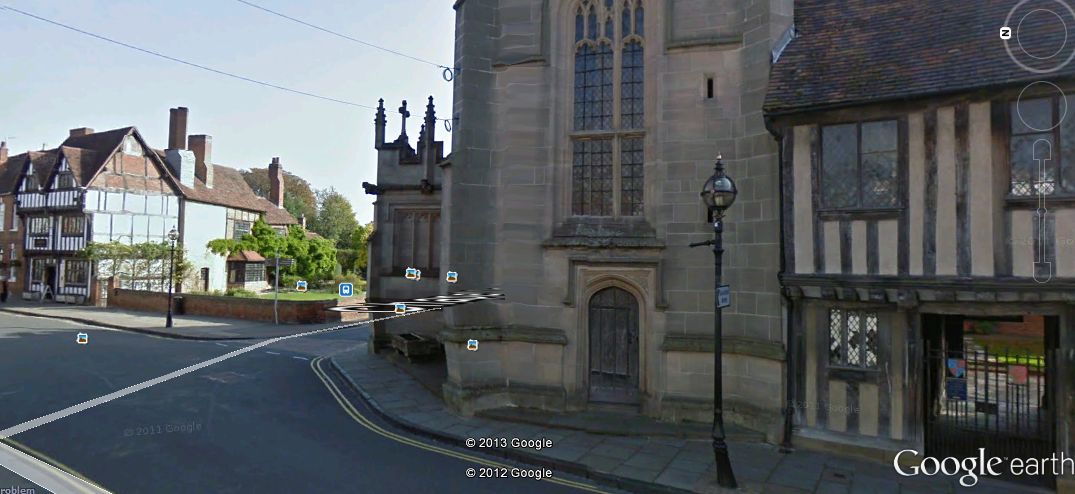
New Place, Shakespeare's house, was located
in gardens (left) adjacent to Nash house (white, left)
Guild Chapel (1400's, center) is across the street
(Chapel Lane) and King Edward VI school is attached (right)
(my screen capture from Google Earth)
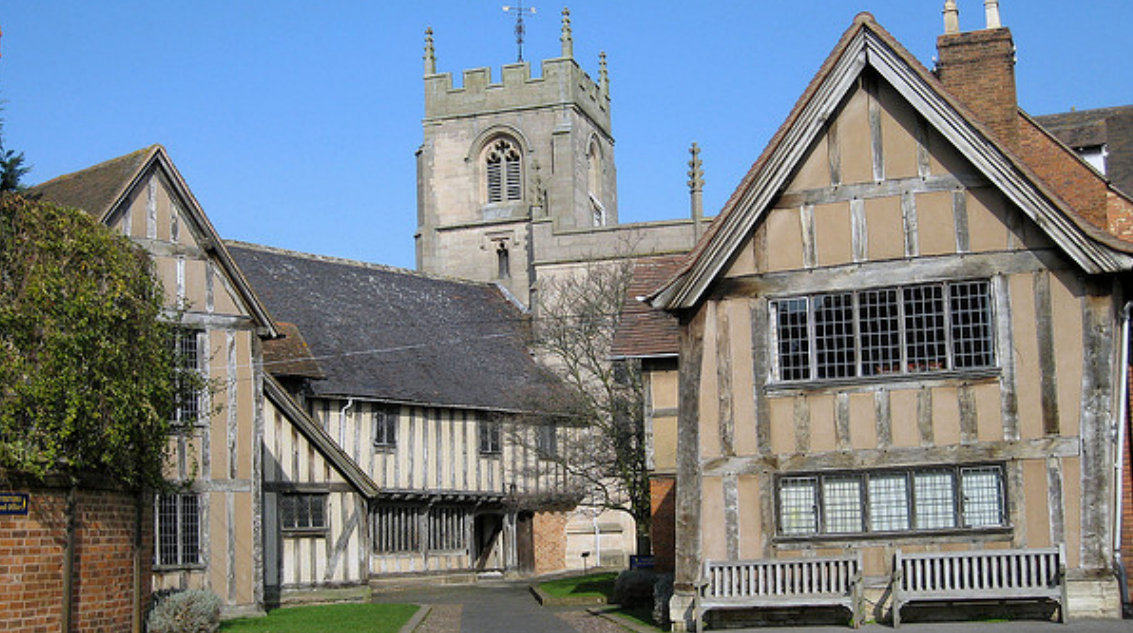
rear view showing other buildings of King Edward VI
school,
which bills itself as Shakespeare's school
One of the
PBS video's on Shakespeare shows this (private) school and points out how
curious it is that Shakespeare, who in later years lives at New Place directly
across the street from the school, doesn't give any money to or mention
the school in his will. Nor does the long history of the school, whose
records go back to 1482, show any bequests from Shakespeare.
=====================================================================================================
Proof
engravings and hi-res print of Droeshout's First Folio Shakespeare portrait
Here are closeups
of the Martin Droeshout Shakespeare engraving that appears opposite the
title page of the First Folio. I came across a 13 Mbyte image of the First
Folio opened at Haverford Library. I downloaded it and using image software
took these closeup.
Later at the Folger Shakespeare site I came across hi-res images of the engraving in the 2nd edition (1632) First Folio. Folger has an amazing collection of thousands of hi-res images all online. Zooming in you can clearely see engraving lines like on currency, so this is probably the details of Droeshout's actual engraving. But when I zoomed in on an adjacent Drowshout images in the Folger collection, I found it slightly different! What? The right eyebrow is different and the strange shadow lines on the ruff to the right of the right cheek are missing. The archive description of this image (classified as a Shakespearean rariety) says it is a 'proof' of Droeshout's image (actually it is the whole first page of the First Folio), and it notes that the shadow is missing. I finally realized the Shakespeare Folger library archive has two proof images (see below), and it looks like the right proof (#219) is the left proof (#220) slighly reworked.
Comparing these images the implication is that in printing engraving lines get smeared out. In fact in the printed image no engraving lines are noticable. I tried blurring the engraving image using image software to see if it would begin to look like the printed image, but curiously it doesn't. Loose end... I don't know anyting about engraving, but I am now wondering if maybe the engraving is 'processed' before printing, like maybe washed in acid (to soften it)?
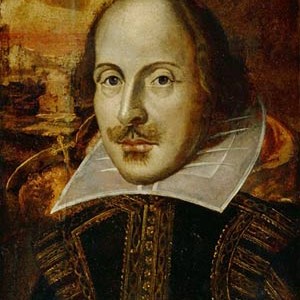
redraw of Droeshout engraving
(with liberties making him look more human)
Folger Shakespeare Library in Washington, DC?
Print images below cropped from very high resolution (13Mbyte) image of First Folio owned by Haverford Library open to title page.
http://www.haverford.edu/library/special/images/shakespeare_large.png
Images showing engraving lines from Shakespeare Folger library, marked --- 'Proof Engraving(s) of Droeshout's Portrait of Shakespeare, 1623", listed as item no. 220 (left), 219 (right) in Halliwell-Phillips's Calendar of Shakespearean Rarities.'
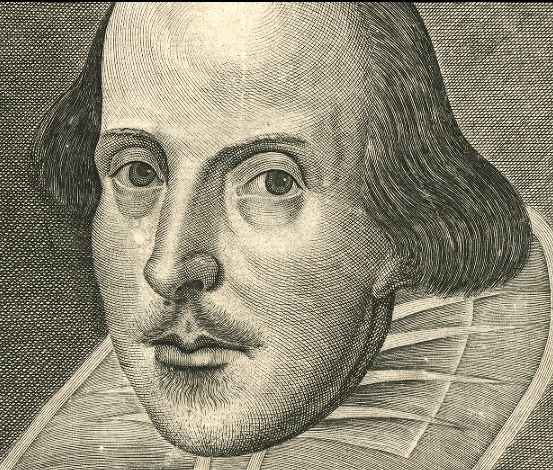 .
. 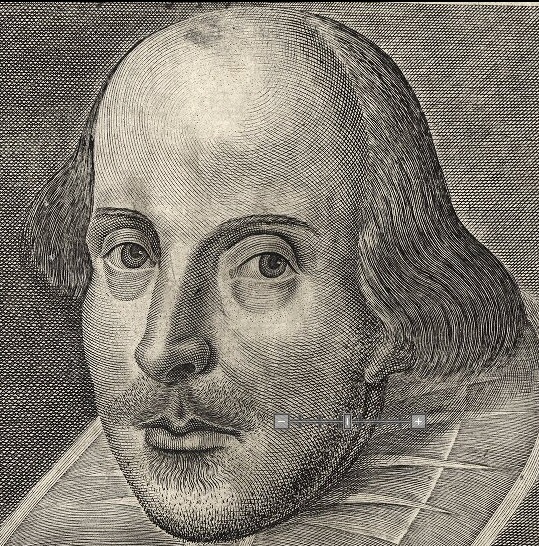
Shakespeare Folger library
Two proofs of 1623 Droeshout engraving
left -- early proof (#220)
right -- reworked proof (#219), notice beard enlarged,
right cheek shadow added, extension of right eyebrow
left early proof (#220) --
http://luna.folger.edu/luna/servlet/detail/FOLGERCM1~6~6~349686~129386?sort=Call_Number%2CAuthor%2CCD_Title%2CImprint&qvq=q:shakespeare%2Bportrait;sort:Call_Number%2CAuthor%2CCD_Title%2CImprint;lc:FOLGERCM1~6~6&mi=41&trs=1114
right reworked proof (#219) --
http://luna.folger.edu/luna/servlet/detail/FOLGERCM1~6~6~53583~103994:-Portrait-of-Shakespeare-?sort=Call_Number%2CAuthor%2CCD_Title%2CImprint&qvq=q:shakespeare%2Bportrait;sort:Call_Number%2CAuthor%2CCD_Title%2CImprint;lc:FOLGERCM1~6~6&mi=40&trs=1114
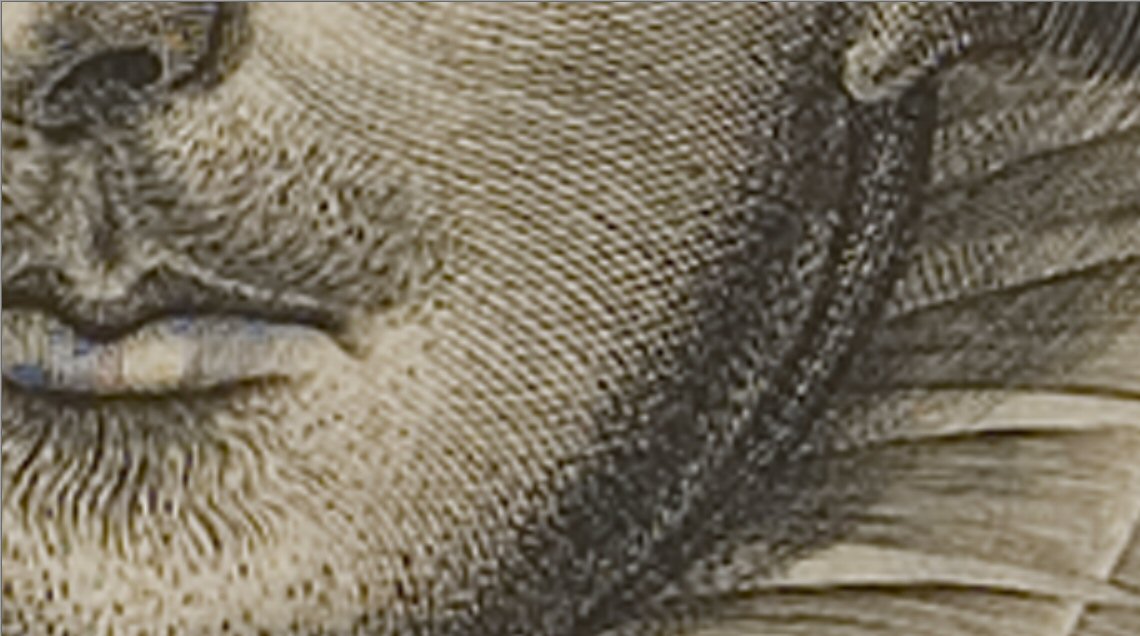
mouth and beard
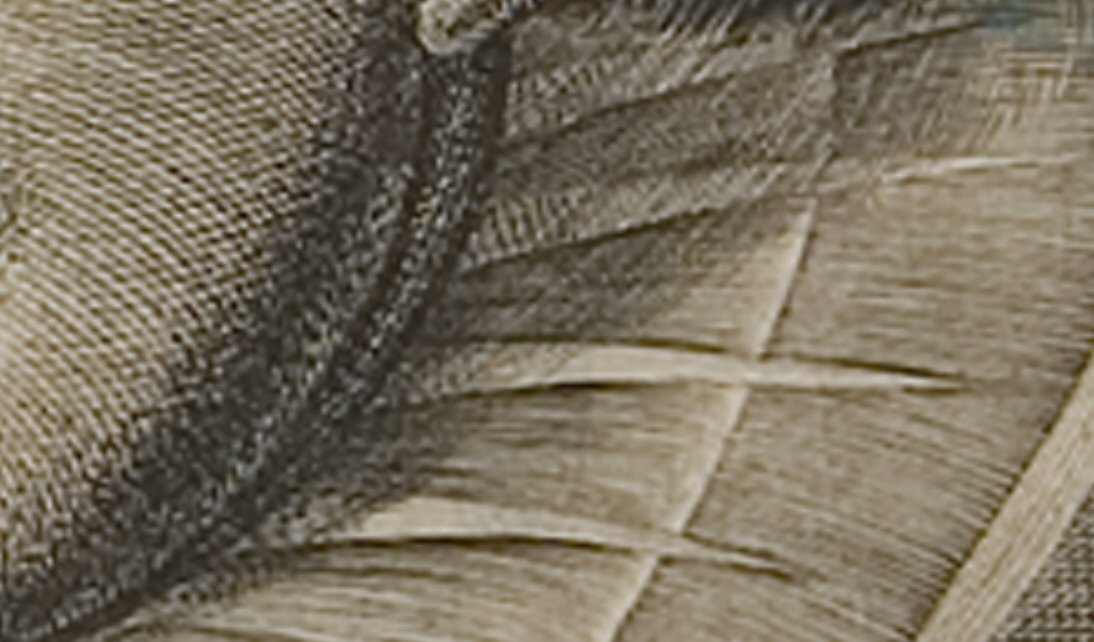
Two odd features
Are the semi-transparent black lines right supposed
to be a shadow?
Clearly shows a dark ridge along the right side of
face. What is this?
Some claim this is an indication of a mask,
but it could just as well be bunching of the skin
from a stiff collar
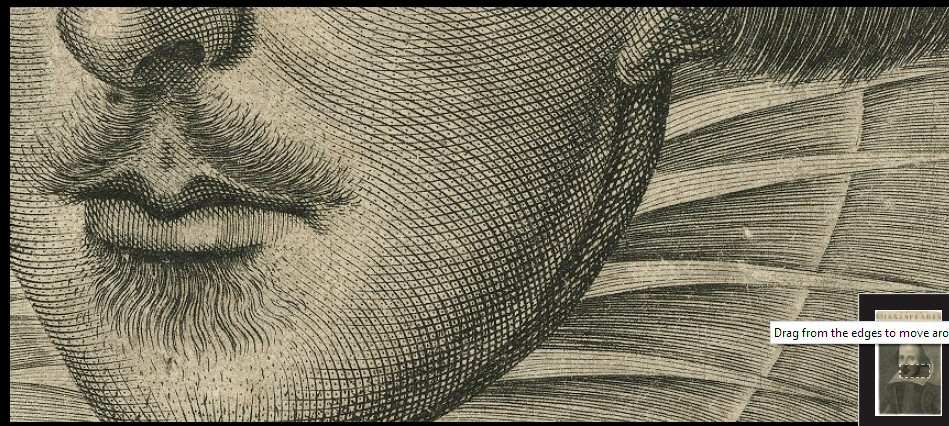
Folger Shakespeare library
'Proof' engraving with missing right side shadow
http://luna.folger.edu/luna/servlet/detail/FOLGERCM1~6~6~349686~129386?sort=Call_Number%2CAuthor%2CCD_Title%2CImprint&qvq=q:shakespeare%2Bportrait;sort:Call_Number%2CAuthor%2CCD_Title%2CImprint;lc:FOLGERCM1~6~6&mi=41&trs=1114
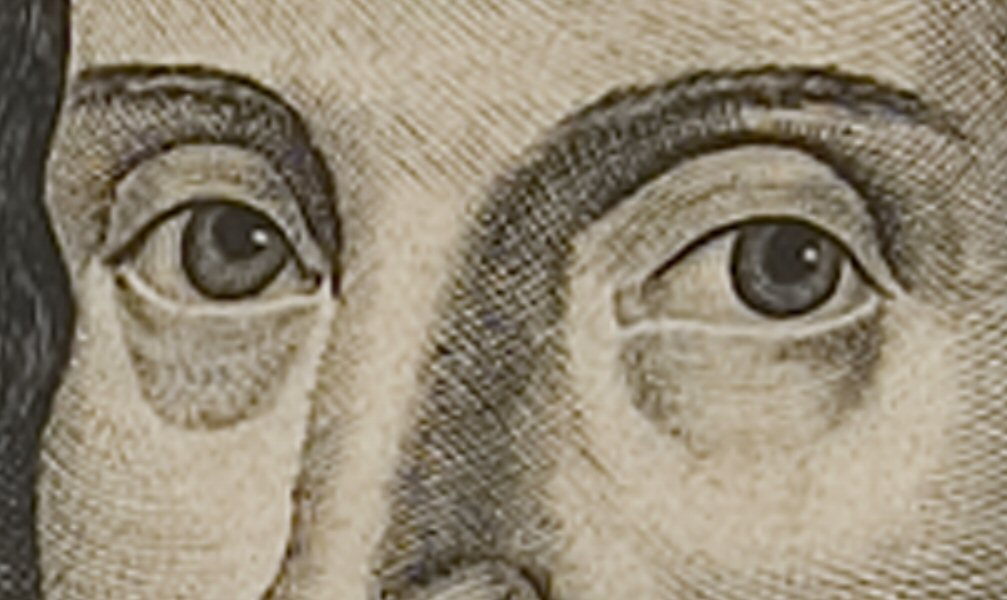
eyes
(with tiny eyebrows and strange dark circles under
eyes)
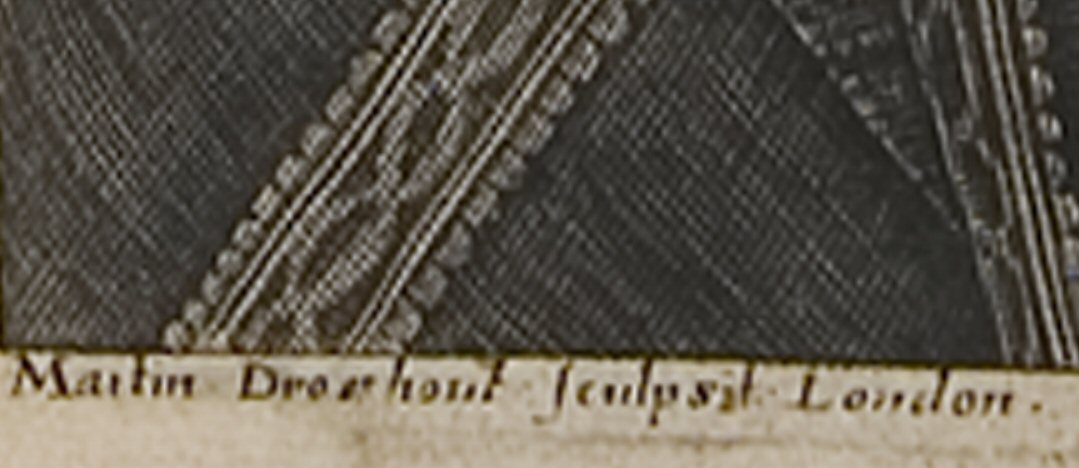
Martin Droeshout signature (lower left)
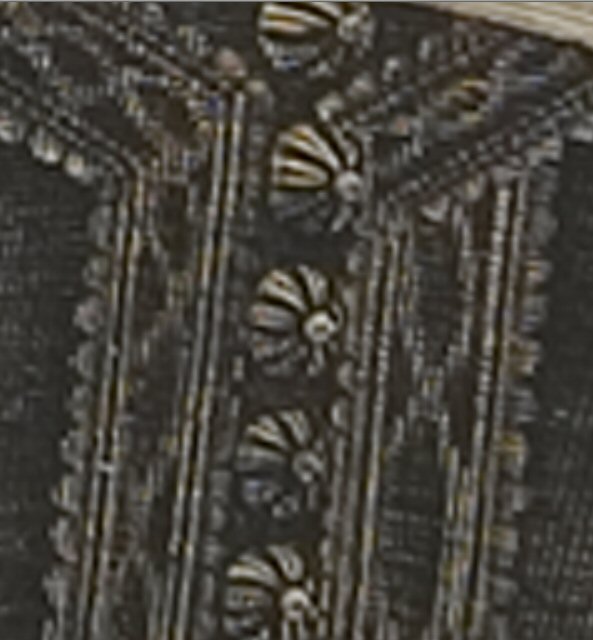
doublet buttons
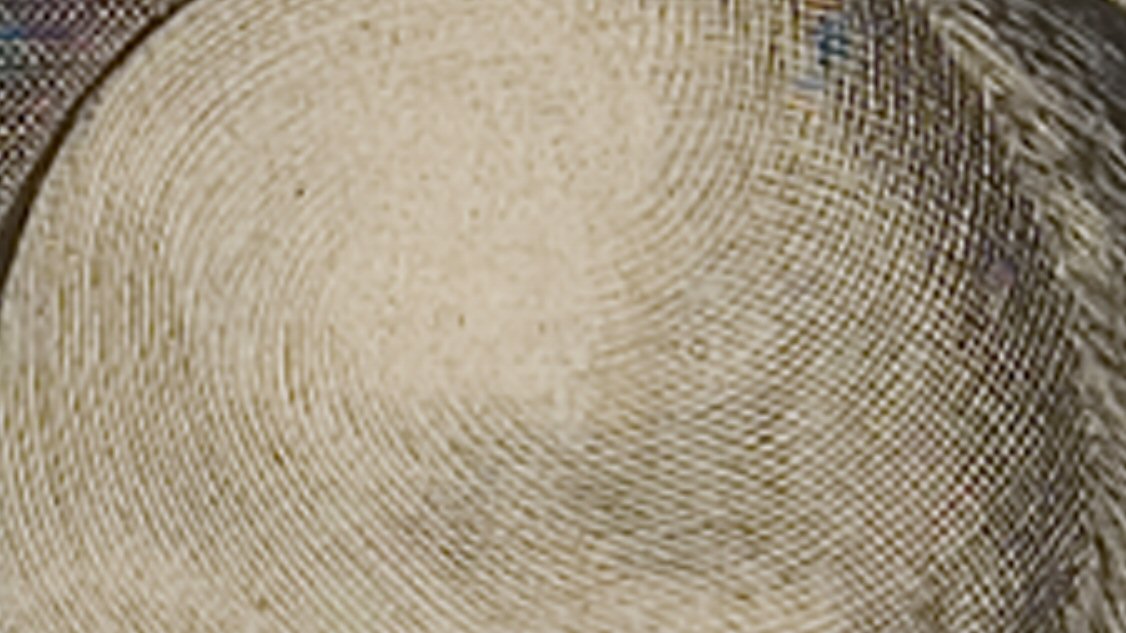
forehead
I had read that Droeshout was a pretty good artist/engraver. On the Folger Shakespeare site I stumbled on this Droeshout engraving, which to my eye look pretty realistic.
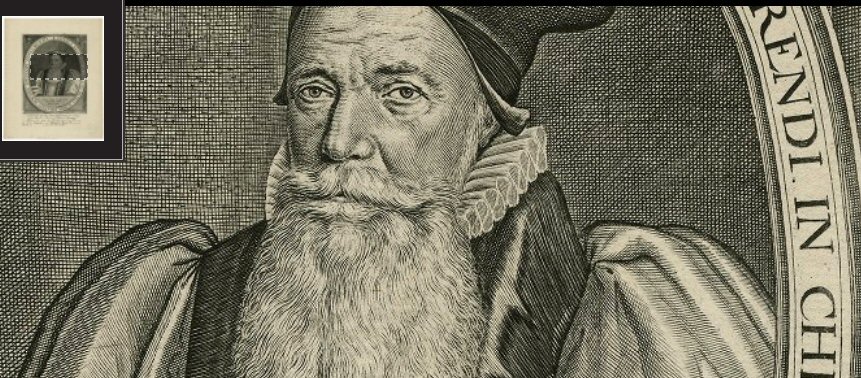
Engraving by Droeshout (of somebody no longer important)
http://luna.folger.edu/luna/servlet/detail/FOLGERCM1~6~6~295550~122624?sort=Call_Number%2CAuthor%2CCD_Title%2CImprint&qvq=q:shakespeare%2Bportrait;sort:Call_Number%2CAuthor%2CCD_Title%2CImprint;lc:FOLGERCM1~6~6&mi=186&trs=1114
Speculations
on Droeshout's engraving in first folio
Here
is a fun speculation. The (famous) engraving of Shakespeare on the cover
of the first folio of plays is shown below left. It is thought to have
been drawn by Martin Droeshout, who is very unlikely to have ever seen
Shakespeare because he was only 15 years old when Shakespeare died. (Curious
that the editors didn't get someone who had known Shakespeare to provide
a sketch, isn't it?) The engraving looks very strange, almost cartoon
like.
Notice Shakespeare's garmet (doublet) is asymmetrical and also the eyes look funny. A leading eye surgeon claims the eyes are funny because they are both right eyes. In a 1911 book the claim is make that the doublet asymmetry can be explained be the fact that right side is a front view and the left side is really a back view. In other words the sketch is a composite of two men, one facing forward and one backward. They then drew the next two sketches to illustrate their point. Kind of interestng, no? To me the front sketch looks very reasonable and is a clear improvement over the original. The rear sketch, while speculative, does match up pretty well with the left side of the doublet.

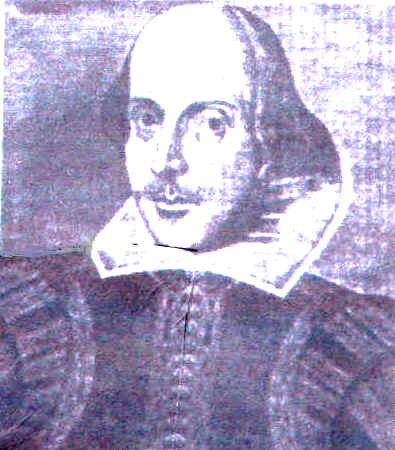
original Droeshout
engraving
front view -- doublet symmetrical right
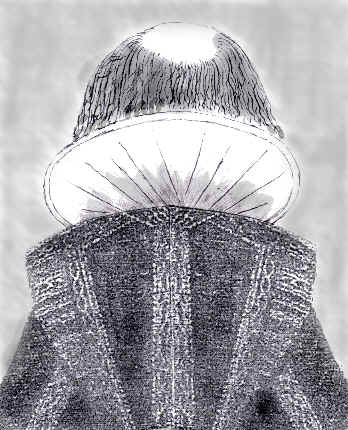
rear vew --- doublet symmetrical
left
Here is bigger, cleaner version of the orginal engraving, a fascimile of the complete cover of the first folio (1623) from the Folger Shakespeare Library web site. In a photoeditor I adjusted the image gamma to bring out the details of the doublet more clearly.
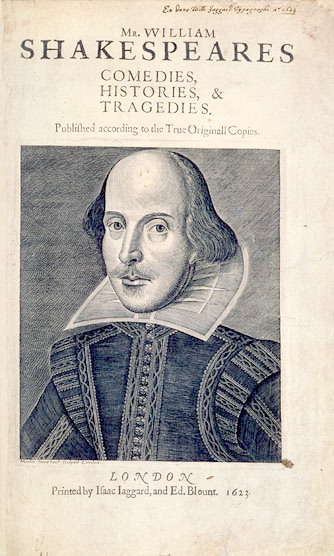
Here is a higher resolution image of the Droeshout cover engraving (cropped on bottom). (Closeups in even higher resolution in Appendix.)
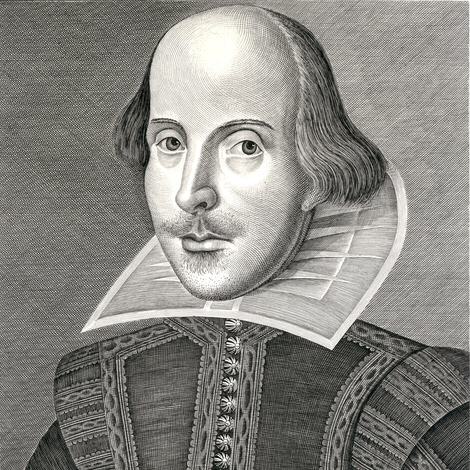
source -- http://4umi.com/image/book/shakespeare/portrait_Droeshout_engraving.jpg
A Shakespeare site has a side by side comparison of the Droeshout engraving with the Chandos portrait, and they are remarkably similar so it is believable that Droeshout worked from this portrait.
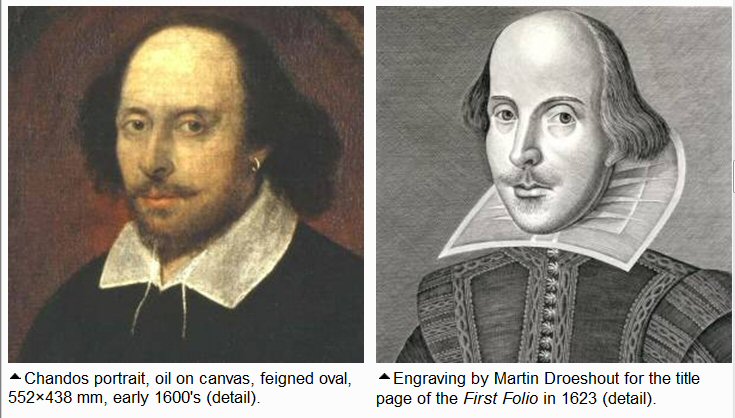
left -- Another ear ring dude.
right -- Is Droeshout's right side hair tuft pulled
forward to cover an ear ring?
(Check out the higher res version above. It does look
the right side hair tuft is weirdly hanging too low,
or is that his ear lobe, sans ear ring.)
(As far as I know this is an original observation.
Wow, my two cents on Shakespeare portraits.)
source -- http://4umi.com/shakespeare/
Wiki (Chandos portrait) says this portrait is owned by the National Gallery (their first acquisition!), and they have studied it intensively. The general consensus, based on the painting providence and it part on the similarity shown above, is that the Chandos portrait is indeed very likely a portrait of Shakespeare done during his lifetime.
Cobbe Portrait (update
3/10/09)
A new portrait
has come to light with a front page story in NYT, known as the Cobbe portrait.
Claim is that it was owned (? maybe commissioned by) Henry Wriothesley,
the 3rd Earl of Southampton. Tests have dated wood to 1580 or so. It is
thought to have been painted during his lifetime in 1610 and that other
portraits are copies of it. The woodcut (above) from the first folio does
indeed look like it could be copy of this portrait: same strange eyes,
same angle of nose, same eyebrows, same angle of sleeves.
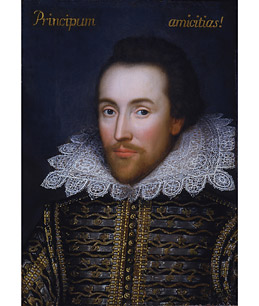 .
.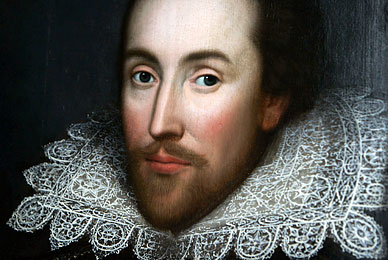
new Shakespeare portrait?
Cobbe portrait
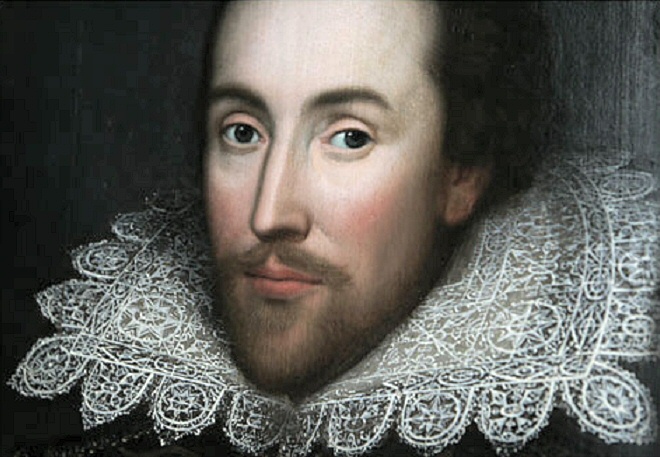
my enhancement of an Opera enlarged screen capture
of a darker NYT Cobbe (3/10/09)
(a higher resolution image of the Cobbe portrait is
available on Wikipedia here)
Above looked familiar, I wondered has it been known before, so I did a little searching and in five minutes the portrait below turned up. It's the Janssen Portrait from the Folger Library, also on wood painted in 1610.
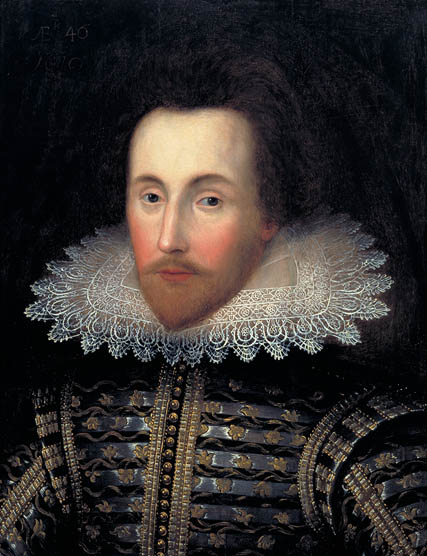
Janssen Portrait of Shakespeare (Folger Library).
Oil on panel, early 1610s, altered before 1770
It's thought to be a genuine 1610 portrait that was
altered to be Shakespeare,
so it's a fake
(I think the altering overpainting has been removed
in above)
(source -- http://en.wikipedia.org/wiki/File:Janssen_portrait.jpg)
Interestingly the Folger Library has this background info tying the two portraits together (3/9/09)
"While the identity of the sitter in the Janssen portrait remains an open question, exhibiting the picture prominently in London in 2006 unexpectedly brought to light a previously-unknown identical portrait. A visitor to the exhibition, Alec Cobbe, recognized the Janssen portrait as a match for a painting that had been in his family for centuries, and had wrongly been identified as Sir Walter Raleigh in the eighteenth century. The Cobbe portrait, as it is now called, was publicly unveiled by Professor Stanley Wells and the Shakespeare Birthplace Trust on March 9, 2009. Wells and others believe it is a lifetime portrait of Shakespeare after all. The question will, no doubt, continue to fascinate for many years to come." Erin Blake, Curator of Art and Special Collections, Folger LibraryHere's more on the testing and provance (from Time magazine).
The two men arranged to have the Cobbe picture subjected to a battery of scientific tests — tree-ring dating to determine the age of the wood panel, X-ray examination at the Hamilton-Kerr Institute at Cambridge University and infrared reflectography. The tests produced persuasive evidence that the wood panel dated from around 1610 and that the Cobbe painting was the source for the one in the Folger and several others.I made two posts to this NYT article #288 and #290 (#290 comes up in a Google search)According to the trust, research has also established the painting’s “descent to the Cobbes through their cousin’s marriage to the great granddaughter of Shakespeare’s only literary patron, Henry Wriothesley, the 3rd Earl of Southampton.”
"It’s pretty obvious that the Cobbe portrait, the Jannsen portrait in the Folger Library, and the first folio Droeshout woodcut and are all related. Most telling are two strange features shared by all three: misalignment of the two eyes and the odd angle of the left sleeve." Posting # 288, Donald E. Fulton (3/10/09)When I later found that Mr. Cobbe has a 'knack' of finding remarkable objects, I added this post:
"Here’s a (possible) red flag about Mr. Cobbe from TimesOnLine article about the Cobbe portrait:
“Alec Cobbe, the art restorer who inherited the painting, has an enviable knack of unearthing significant artefacts among his family’s possessions. In 2007 he found Chopin’s grand piano in his collection of pianos. The year before that he discovered sketches that proved that Newbridge, his family home in Co Dublin, was the first significant building in Ireland to be designed by a leading British architect.”
Reminds me of the perpetrator of the 1912 Piltdown man hoax, he also had a ‘knack’ for finding remarkable objects. And of course, if this painting is Shakespeare, it makes Mr. Cobbe very rich." Posting # 290, Donald E. Fulton (3/10/09)Follow up to my Cobbe Shakespeare portrait posts:
* One poster after me noted my Cobbe red flag post and expanded on it:
Re: 290 (me) — I saw that article as well. Another red flag is raised by a post I saw on Shaksper.net’s message board a couple of years ago in which Wells announces that he and Cobbe are working on a book that appears to somehow involve the portrait. This suggests Wells was personally invested in a positive identification long before the test results came in. He is also a long-time friend of Cobbe’s.
A few years back, Cobbe also found what has since been tentatively accepted as a portrait of the Earl of Southampton in drag. Prior to his discovery that it was a man in drag, the family had called the subject “Lady Norton.”
It is claimed that some of the later copies of the painting were claimed to be of Shakespeare, but that in itself is no proof of authenticity. It may reflect the painting’s basic resemblance to the Droeshout engraving (though why doesn’t the engraving better resemble the painting?).
The motto is interesting. If, as it seems, it means something like “noble friendship” it might argue against identifying the subject as Shakespeare, who was a commoner. As some articles noted, the subject was once thought to be Walter Raleigh, a nobleman, but that was apparently discredited. — Posted by Tom HardyI searched out the Earl of Southhampton in drag portrait mentioned in posting above.
http://image.guardian.co.uk/sys-files/Observer/documents/2002/04/20/obs.ore.020421.005.pdf
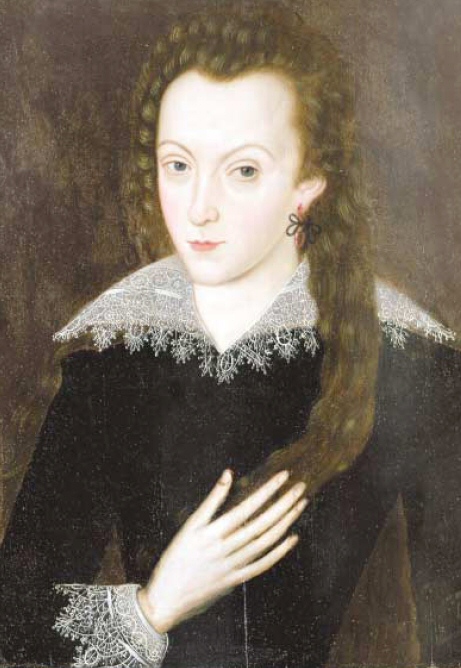
(supposed) 3rd Earl of Southhampton in drag (Shakespeare's
patron)
dated: early 1590's, Southhampton's age 17 to 20
(owned by Axex Cobbe, UK Gardian article, 2002)
Here is a closeup of the face from portrait above (with increased contrast). It has the same general look (eyes, angle, prim mouth) as the 'Shakespeare' portraits above.
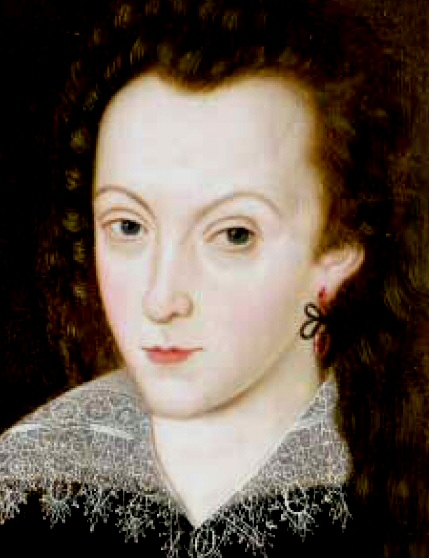
(supposed) Earl of Southhampton in drag (closeup,
enhanced)
Henry Wriothesley's
portrait
Another poster suggested the Cobbe portrait be compared with the Henry
Wriothesley portrait in the National Gallery. I searched out the portrait
and here is a blow up of the face.
The poster sees this similarity --- "Same long face, pointed chin, completely horizontal mouth, same eyes, same eye lids, same hair line, same dark bush of hair. And there’s an ornate white lace collar."
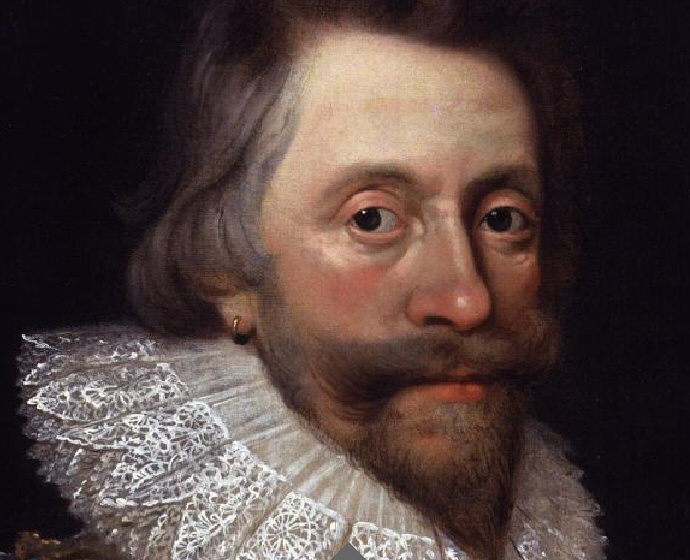
With Oxfords's son (Henry deVere, 18th earl of Oxford)
The British
Museum has this weird little engraving from 1623 of Henry Wriothesley with
Henry deVere, Oxford's only son, 20 years younger than Wriothesley, on
horseback, apparently fighting together in Holland.
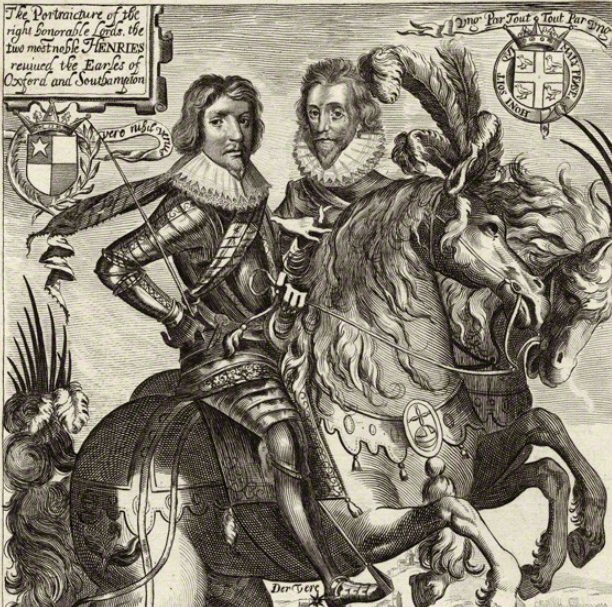
'Two most noble Henries', revived Earls of Oxford
and Southhampton (cropped, 1613)
Oxford's son Henry (left, his name under his horse!)
and Henry Wriothesley (right)
fighting in Holland, and both died there a year or
two later (age 32 and 51).
http://www.britishmuseum.org/research/search_the_collection_database/search_object_details.aspx?objectid=3081947&partid=1&output=People%2f!!%2fOR%2f!!%2f14262%2f!%2f14262-1-6%2f!%2fPortrait+of+Henry+Wriothesley%2c+3rd+Earl+of+Southampton%2f!%2f%2f!!%2f%2f!!!%2f&orig=%2fresearch%2fsearch_the_collection_database%2fadvanced_search.aspx¤tPage=1&numpages=10
This 1623 engraving is really quite weird. First is just puff piece, slobering all over the two earls. To my eye the two faces don't look right, don't look like they fit with the rest of the engraving, sort of like a bad modern photoshop fake. The elements of this engraving are very fanciful. Oxford is in amour yet he and Wriothesley are both wearing dress neck ruffs, and Oxford is trailing a long scarf. The horses are all decked out in feather looking like they are ready for a parade.
A little research shows both are aristorcratic leaders of the 'Patriot Coalition' ("resisting the King James’ plan for a dynastic union with Spain"), both soldiers and both die abroad fighting in Holland. Southhampton in 1624 at age 51 and Henry deVere in 1625 at age 32.
Wikipedia describes the 'Spanish Match' as an offer from the Spanish thone to King James to not interfere with his rule in Ireland if he would restrain the Brish privateers preying on Spanish ships. As part of the deal King James son was to be pledged in marriage to the young daughter of the (catholic) King of Spain. The protestants of England, led by several nobles including Oxford's son and Southhampton, are not happy about having a catholic introduced into the royal line. The background to this is the 'Thirty years war' that began in 1618 as a fight on the continent between protestants and catholics.Henry's father Oxford (17th earl and maybe Shakespeare) had died in 1604, when Henry was 11. In 1621 (age 28) in connection with the 'spanish match' (Wikipedia) Henry deVere is put in jail (in tower) for a few weeks, and he is again in jail for most of 1622 and 1623 (Mar 1622 to Dec 1623). What is interesting about these dates is this means Oxford's only son is jail during most of the planning and printing of the First Folio which came out in 1623! Henry deVere was married at 31, but died a year later in Holland and had no children.Hence there is little doubt that Oxford's son and Southhampton are committed protestants, both die fighting for the cause.
Southhampton had been in jail (in the tower) too earlier for two years (1601 to 1603, age 28-30) sentenced to death for his part in the Essex rebellion. This are years when both Shakespeare and Oxford are alive, but as far as I know neither write of this. (Odd?) Southhampton is married and has four children.
He also has stong connections to the theater. In a 1599 letter to Sir Robert Sydney we find: 'My Lord Southampton and Lord Rutland ... pass away the time in London merely in going to plays every day'. And this: 'Southhampton in January 1605 entertained Queen Anne with a performance of Love's Labour's Lost by Burbage and his company, to which Shakespeare belonged, at Southampton House'.
Newly
discovered Shakespeare portrait !
Well,
maybe Droeshout's engraving for the first folio was accurate after all.
Look, if thou canst, upon this newly discovered Shakespeare portrait.
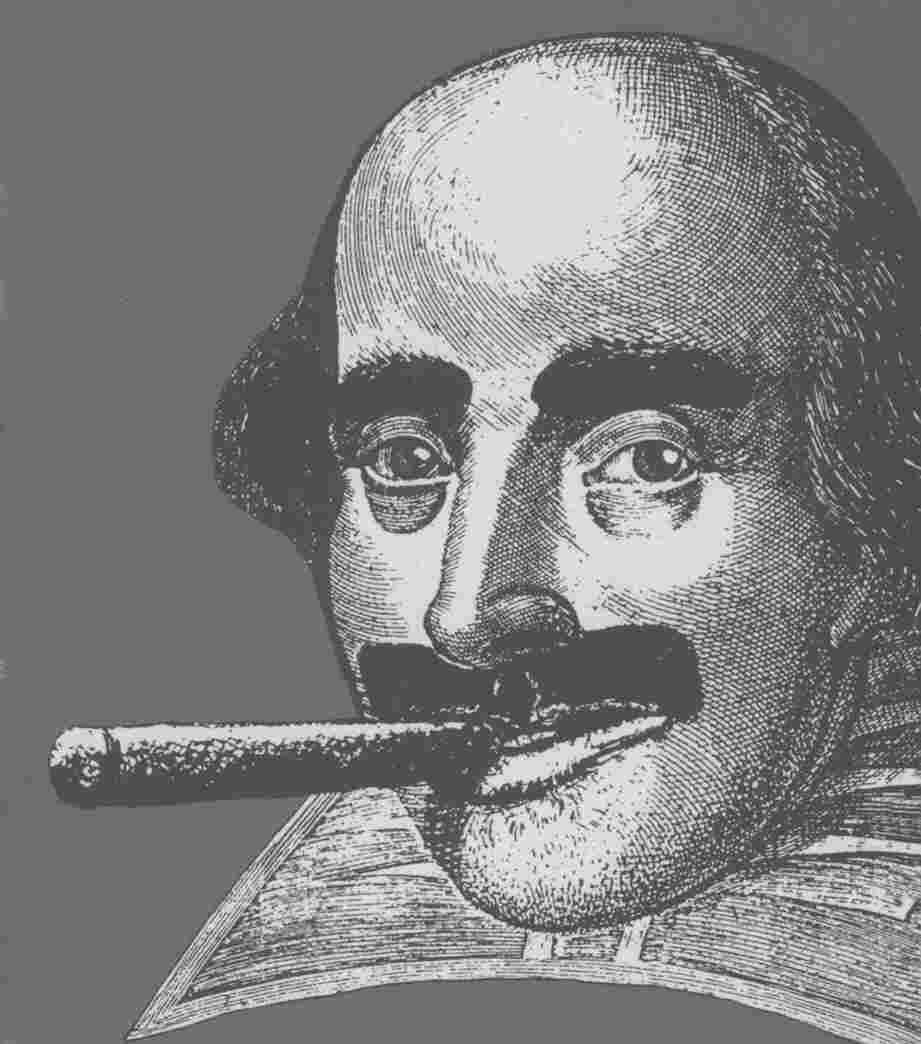
(my scan from a book I own)
Shakespeare
in the bible
Do you know
about the hidden Shakespeare reference in the King James Bible? The
King James Bible was translated in the early 1600's and went to press in
1610 (published 1611). In 46th chapter of Psalm's count in 46 words from
the beginning and you will find the word "shake." Then count back from
the end of the same chapter 46 words and you find the word "spear".
(Well, sort of, to make this work the last word of the psalm, selah (amen),
must be conveniently omitted.) And (guess what) in 1610 Shakespeare and
Marlowe were both age 46. What do you think the odds are that the translators
(maybe including Shakepeare/Marlowe?) were not having a little fun?
Not a cryptogram
Seems impressive
until dug into it a little. A look at Psalm 46 in several earlier bibles
used as references by the King James translators show 'shake' and 'spear'
are already there and at almost the correct locations (46/46) to
make Shakespeare Psalm cryptogram work, i.e. for the hidden text 'Shake-spear'
to magically appear. In the Great Bible of 1539 they occur at locations
46/48, and in the Bishops' Bible of 1568 they are at 47/48, the latter,
the primary reference for the King James bible, was published when Shakespeare
was four years old. In other words a tightening of the earlier text by
just a word or two could easily put both 'shake' and 'spear' in the right
locations. With this knowledge it's pretty clear this (so called) cryptogram
has no mathematical strength, that the odds of it being a just a statistical
fluke are quite good. The Bishop in the reference below, apparently mathematically
challenged, asserts this could not be a fluke, but the two letters following
make a convincing case otherwise. One letter writer, a professor of Classics,
even explains that the tightening of the text needed would be expected
using the guidelines the translators worked under. (Note, the root URL
below is a weird site, but what is asserted is a simple matter of fact,
and they appear to be just reprinting an article and reply letter that
appeared in the London Times in 1976.)
http://www.whatabeginning.com/BBooks/TheBard/P.htm
This reference gives the Psalm 46 locations of 'shake' and 'spear' in the Geneva bible of 1560 as 48/44.
http://capthk.wordpress.com/2011/01/11/did-shakespeare-help-write-the-king-james-bible/
======================================================================================
Justice
Stevens on Shakespeare (update 4/18/09)
John
Paul Stevens justice of Supreme Court, now 88 years old, says "evidence
is beyond a reasonable doubt" that the Bard of Avon did not write
Shakespeare. (front page story in WSJ 4/18/09)
Steven's is not a Shakespeare scholar, but he did graduate work in English before joining Navy and has been interested in Shakespeare all his life starting from the 1933 Chicago World fair near where his father worked and which had a replica of the Globe theater that performed shakespeare's plays. Stevens interest in the authorship problem began in 1987 when he and justices Brennon and Blackmum participated in a famous 'mock trial', which concluded that there was insufficient evidence that deVere wrote shakespeare. Visiting Avon Stevens found that Shakespeare left no books, letters or other records of literary presence. "Where are the books he asked? You can't be a scholar of that depth and not have books in your home" He never had any correspondence with contemporaries, he was never shown to be at any major event (like coronation of James). I think the evidence he was not the author is beyond a reasonable doubt." Steven is an Oxfordian.
http://online.wsj.com/article/SB123998633934729551.html
======================================================================================
'Downton
Abbey' or country house perspective
It occurred
to me watching Downton Abbey that one way to think about the nobles in
the Shakespeare authorship story might be figure out who lives where, call
it the 'Downton Abbey' perspective. The pbs drama 'Downton Abbey' drives
home the point that the big estate homes of England, built over years at
great expense, maintained by a large staffs and often lived in by generations
of the same family, are an anchor of upper class to the local region. So
I set out to identify the estate homes of the nobles in the Shakespeare
authorship story and to see where they are located.
A complication is there can be more than one home. The Herberts at the time of Mary Sidney Herbert had four houses! Wikipedia says that Phillip Herbert in addition to maintaining (after his older brother William died) a staff of 150 at the family home, Wilton House, also kept a large house in London with a staff of 80. God these guys are rich!
Briefly the family homes are
Tichfield Abbey
Henry Wriothesley (earl of Southampton)
Wilton house
Herberts (Mary, brother Phillip Sidney, sons William and Phillip)
(earls of Pembroke)
Burghley house
and Theobalds House
(guess who) William Cecil (Lord Burghley). As teens his wards, daughter
and grandchildren: Oxford, Oxford's 1st wife Wriothesly
and Oxford's three daughters may have lived there
Castle Hedingham
Edward deVere (earl of Oxford)
On a first look the location of the homes doesn't tell me anything. They tend to be isolated from each other in sort of a loose ring around London at a distance of 30-80 miles.
Herberts --- Wilton house
Four characters
in our story are associated with and live in the Herbert estate, Wilton
House (near Salisbury) 83 miles SW of London. The older generation are
Mary Sidney Herbert (1561), a writer (and candidate for Shakespeare) and
her brother Sir Phillip Sidney (1554), who was a writer famous for his
sonnets.
The younger generation are Mary's two sons, William (1580) and Phillip Herbert (1584), both of whom go on to be the Chancellor of Univ of Oxford. The older brother William is Lord Chamberlain of England at the time the First Folio is published, and he had at one point he been engaged to one of Oxford's daughters (Bridget). The younger brother Phillip takes one of Oxford's daughters (Susan) for his wife. So Oxford is related by marriage to the Herbert family.
But there are other earlier links between Oxford and the Herberts. Oxford essentially snatched away Sir Phillip Sidney's potential wife. The daughter of Lord Burghley, Ann Cecil at age 12 (!), had been pledged to (Sir) Phillip Sidney, age 15. But two years later, when Ann is 14 and Oxford is 21 (Oxford knows Ann having been raised in the same household by Burghley since age 12) he asks Burghley to marry Ann, and at a year later he does. Wikipedia also has Sir Phillip Sidney, who died in battle at age 32, challenging Oxford to a dual at one point (apparently not over Ann).
The connections to Shakespeare: The most famous tie in of the Herbert's to Shakespeare is that the First Folio is 'dedicated' to William and Phillip Herbert. William Herbert might also be the W. H. in the dedication of the Shakespeare sonnets. Ben Jonson, thought to be the editor of the First Folio, was friends with the Herberts and was a frequent guest in their houses.
Also the first published Shakespeare play (Titus Andronicus) in 1594 does not have Shakespeare name on the cover, but rather that it was performed by the Earl of Pembroke (and two other Earls). The Earl of Pembroke in 1594 was Henry Herbert at Wilton House, husband of Mary Sidney Herbert, and he sponsored a company of actors, Pembroke's men, that must have been acting Shakespere's plays by 1594.
Marlowe had worked as a page for Philip Sidney at Wilton house when he was growing up. Mary Sidney Herbert's mother and Bacon's mother were close friends. Four hundred years later and the Wilton House (having been rebuit) is still owned by Herbert family. Currently William Herbert, 8th Earl of Pembroke lives there.
Henry Wriothesley --- Titchfield Abbey
Wriothesley's
father, 2nd Earl of Southhampton, is raised a catholic and has ties to
the Northern Rebillion, which was an attempt by the Catholic nobles to
depose Queen Elizabeth. In 1566 he (father) marries a 13 year old girl,
Mary Browne, and when Mary is age 20 (1573) at her family (Browne) home
she gives birth to Henry Wriothesley, 3rd Earl of Southhampton. Henry's
father dies when he is 8 years old (1581) and he becomes a ward of Lord
Burghley, as had Oxford about twenty years earlier.
Oxford, of course, knows Wriothesley, 23 years younger than himself, who is growing up in his father-in-laws (Burghley) home. Burghley suggests Wriothesley as posible husband for his granddaughter and the oldest of Oxford's daughters, Elizabeth. I recently discovered that Elizabeth and her sisters moved in with Burghley, their grandfather, after their mother, Oxford's first wife, Ann Ceicil, dies in 1588. The claim is made that Oxford's son Henry and and Henry Wriothesley are friends, but a check of their dates shows Wriothesley is 20 years older than Oxford's son. They do, however, both both lead a protestant movement opposing a proposed marriage between the british and (catholic) spanish thrones, and both go to Holland to fight (part of the 30 year's war). There is an engraving (see above) 'Two most noble Henries' showing them together on horseback 'fighting' in Holland, but I read Wriothesley dies of fever within days of ariving in Holland in 1624, and Oxford dies (of fever too) in Holland a year later.
Wriothesley was apparently super rich with lots of properties. Wikipedia has him participating in the big investments of the era technology and exploration: new factories and Virginia Company (Jamestown settlement)
The connections to Shakespeare: the two long poems of Shakespeare (Venus and Adonis, 1592 and Rape of Lucrece, 1594), written while the theaters were closed due to plague, are both dedicated to Henry Wriothesley (age 19-21). Henry Wriothesley, perhaps 2nd to William Herbert, is a candidate to be 'Fair Youth' (and/or W.H.) to which 126 of the Shakespeare's Sonnets (1609) are addressed.
It is often written that Wriothesley was Shakepeare's patron, meaning (I guess) he supported Shakespeare financially, but Wikipedia does not support this saying, "Despite extensive archival research, no documents have been found concerning their relationship (Wriothesley and Shakespeare) apart from the dedications to Shakespeare's two long narrative poems." Apparently it comes down to this, an early Shakespeare biographer (Rowe, 1709) includes a story that Wriothesley once gave Shakespeare a 1,000 pounds (huge amount), but no documentation has ever been found supporting this.
Oxford -- Castle Hedingham
Oxford appears
to be the exception amoung the nobles. While he is born in (and apparently
inherits at age 12 upon his father's death) a large long time family estate,
he sells it. He seems to move around. He also has a home near Rugby and
the river Avon that he also sells in 1580. Is he restless, does he have
money trouble?
Burghley -- Burghley House and Theobalds House
Burghley was
the most important minister for the majority of Elizabeth's long reign.
He built Burghley House near the town of Stamford over two decades 1558
to 1587, and it became the home of his heirs. Stamford is about 80 miles
north of London.
Burghley buld a 2nd home (1564 and 1585) much closer to London, Theobalds House, 12 miles north of London where the queen visited often beginning in 1572. (On Google Earth it is identified as 'deVere Theobald Park', Theobalds Park is a deVere group hotel )
Oxford as a young man went to live with Burghley in the early 1560's and this was early in the building of the houses, so Oxford may not have lived there, but it's very possible that the next generation of Burghley's wards (Wriothesly and Oxfords's daughter's) lived in one of these two houses.
Oxford's first wife, Anne Cecil (Burghley's daughter), had died in 1588 (age 32) leaving three surviving girls. At her death the oldest girl, Elizabeth, was only 13 so all three went to live with their grandfather, who it is reported gave then an excellent education. Oxford remarried in 1591 and his only son, Henry, was born in 1593 to his second wife.
=====================================================================================================
Albert Burgstahler
"The
most detailed and compelling example is undoubtedly that discovered by
David L. Roper in the famous Stratford monument inscription dating from
the early 1620s."
"Using a simple arithmetical procedure to decipher the part in English, Roper found a unique plain-text message concealed in a 34-column ELS grille, whose presence by design is confirmed by additional encryption related to the two lines in Latin above the six lines in English. The decrypted message, signed with the initials B. I. for Ben Jonson (I = J), reads:
SO TEST HIM, I VOW HE IS E DE VERE AS HE, SHAKSPEARE: ME B. I.
(1) In Sonnet 76 of Shake-speare’s Sonnets published in 1609, de Vere’s authorship is directly and unequivocally declared in a 14-column equidistant letter sequence (ELS) Cardano grille containing his name “de Vere” in column 9 of the grille, reading upward into “my name” in line 7 of the sonnet (line 16 in the grille).
(2) Similar ELS grilles appear in equally unequivocal
testimony by well-educated contemporaries that “Shakespeare” was Edward
de Vere in: (a) the Stratford monument inscription apparently written by
Ben Jonson,
(b) the 1640 poem beginning “Poets are borne not made”
by Leonard Digges, and
(c) the dedication to Shake-speare’s Sonnets of 1609
by Thomas Thorpe.
(Prof Albert Burgstahler's paper draft)
======================================================================================
Dipping my toe into Venus and Adonis (1593) I find this. This is the work of one of the greatest writers in the english language? Forthwith:
Rain added to a river that is rank
Perforce will force it overflow the bank.
But when her lips were ready for his pay,
He winks, and turns his lips another way.
'Pity,' she cries; 'some favour, some remorse!'
Away he springs, and hasteth to his horse.
The iron bit he crusheth 'tween his teeth,
Controlling what he was controlled with.
Who is so faint, that dare not be so bold
To touch the fire, the weather being cold?
For from the stillitory of thy face excelling
Comes breath perfum'd that breedeth love by smelling.
The silly boy, believing she is dead
Claps her pale cheek, till clapping makes it red;
He tells her, no; to-morrow he intends
To hunt the boar with certain of his friends.
Which the hot tyrant stains and soon bereaves,
As caterpillars do the tender leaves.
But none is best; then join they all together,
Like many clouds consulting for foul weather.
======================================================================================
"I leave it
to your honourable survey, and your honour to your heart's content; which
I wish may always answer your own wish and the world's hopeful expectation."
(from dedication of Venus and Adonis to Henry Wriothesley)